
Conceptualized:
Copyediting:
Contributors
LETTER FROM THE VICE PROVOST FOR GLOBAL AFFAIRS


Conceptualized:
Copyediting:
Contributors
LETTER FROM THE VICE PROVOST FOR GLOBAL AFFAIRS
Welcome to this year’s UVA in the World report, which chronicles the University’s accelerating global engagements across multiple disciplines and regions, featuring a panoply of new student experiences, exciting strides in research, and an expanding international presence for the University.
The scope of global experiences in these pages is as varied as the world is large, including a record number of education abroad programs during J-term on every continent but Antarctica.
Our students benefited from a wealth of applied learning experiences such as interning as an economic analyst at an Argentine think tank and assessing the recovery from a catastrophic earthquake in Morocco. They revived U.S.Chinese ping-pong diplomacy in a blaze of publicity at a sensitive time in this critical bilateral relationship, and dove into the complexities of the process that brought peace to Northern Ireland after decades of strife. UVA researchers also made exciting advances around the world: from creating affordable robots to assist in teaching computer science in Colombia and rural under-resourced regions in the U.S., to developing a new medical research platform and training partnership in Tanzania.
This year, with the arrival of our new director of global initiatives, Tina Mangieri, we also continued our preparatory work to expand UVA’s international presence with a major visit to South Africa and accelerating engagement in India, which both feature exciting and diverse opportunities for the University’s interests. One of UVA’s largest international delegations in many years visited Bologna, Italy, for a productive exploration of major new research opportunities at the crossroads

of data science, municipal governance, environmental sustainability, and democracy that show enormous potential for development in the years ahead.
Meanwhile, we continued to globalize on-Grounds experiences, including through multiple programs exploring the roots of, and possible solutions to, Middle East conflicts, and the visits of dozens of prodemocracy activists from around the globe to develop strategies against authoritarianism. Our flagship Global Studies program is becoming an ever-more popular undergraduate major with the addition of exciting new faculty. We have also been enriched by an increasingly diverse cohort of international students from around the world, who now make up more than 10% of our overall enrollment, drawn to the excellence on offer at UVA.
Few of these experiences would be possible without the generous support of our large and growing cohort of donors ( see pp. 72-76). From scholarship support for students who previously could only dream of overseas experiences, to funds for groundbreaking research on increasingly urgent transnational challenges, our donors’ support enables our engagement with the world, while making a profoundly transformative impact on our intellectual depth and outlook. As the writer Henry Miller observed, “One’s destination is never a place, but rather a new way of looking at things.” We are deeply grateful to our donors who have given us that new perspective, which keeps us true to the idea of the great and good public university we aspire to be.
STAY GLOBAL!

Stephen D. Mull
+ Education Abroad
+ International Students and Scholars
+ Welcoming the World to Grounds
+ Global Fellowships Open the World
+ Global Scholars


“
The education abroad internship broadened my involvement within the University, allowing me to engage with my peers and UVA faculty in a variety of ways.”
Rachel Stenzel
, 2023 UVA in Paris program and intern at ISO
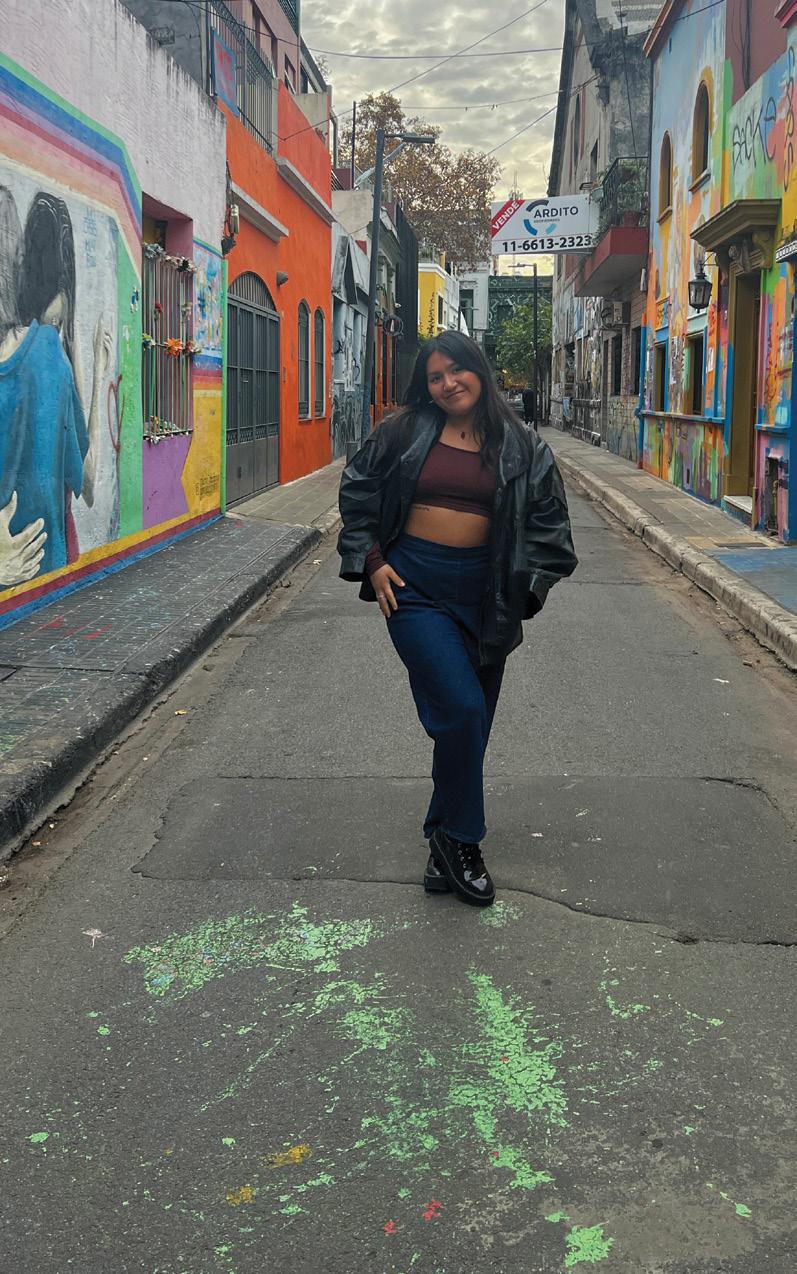
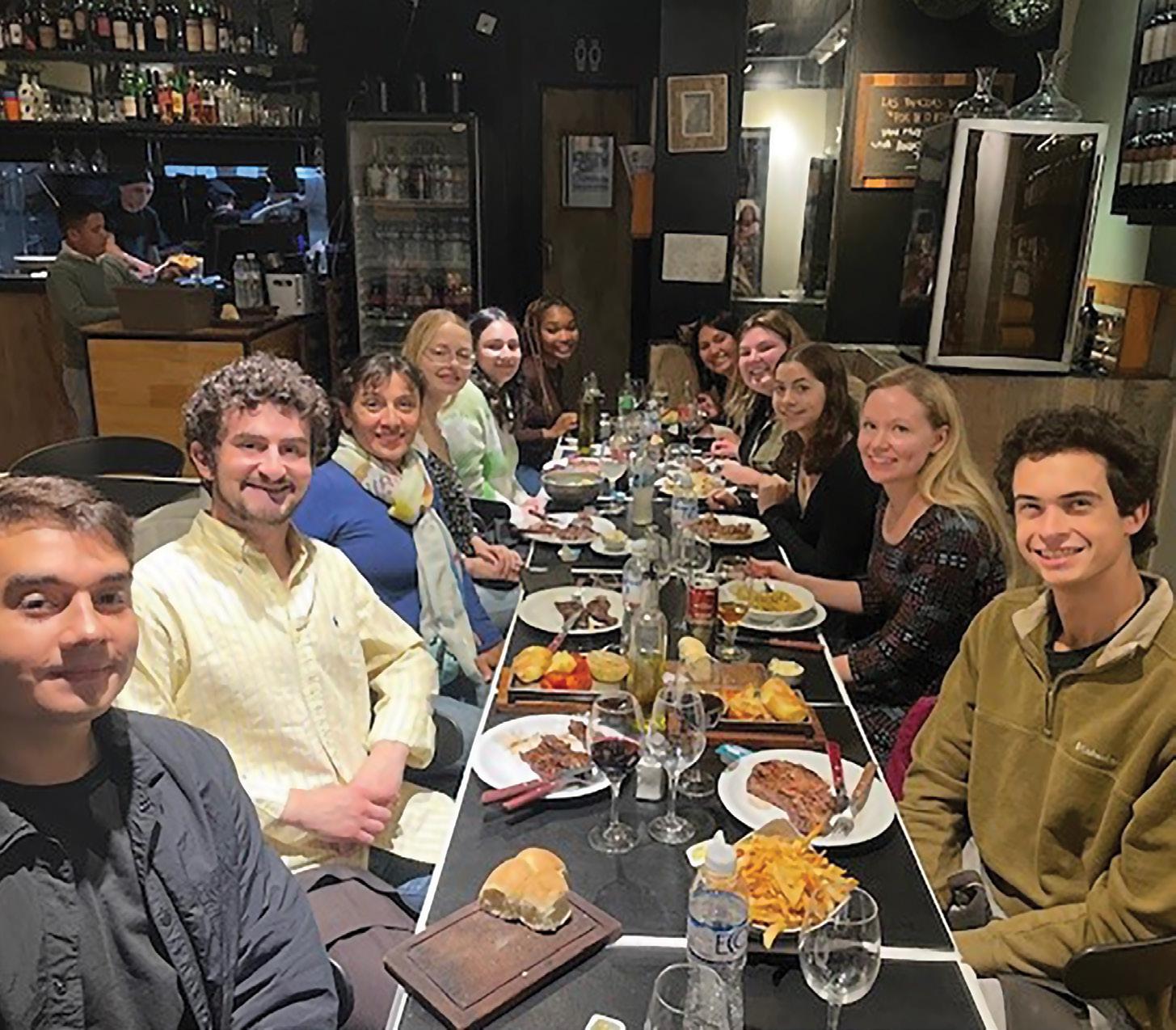
Applied learning is increasingly popular at UVA, with programs and opportunities that include internships, field school or field work, projectfocused work, practical training, engagement with host country clients or partners, and/or collaborative research.
A robust example of Applied Learning, UVA Global Internship programs continue to grow, with new opportunities launching this past summer in Sonipat, India, and in London, United Kingdom. With seven programs abroad and one that connects students with virtual international internships, 86 students gained experience in industries such as communications
IN THE 2023-24 ACADEMIC YEAR:
2729 UVA STUDENTS traveled to
and media, education and human services, global development, law and human rights, and medicine and public health. Additional internship programs in new locations are expected in Summer 2025.
Kiara Barrientos participated in the UVA in Buenos Aires program last summer as an analyst intern with the Centro de Estudios Económicos Urbanos and found the experience transformative. “Within the two months living and working abroad, I feel that I have grown into my character personally and professionally,” she said. “I thought the adjustment to the city of Buenos Aires would be overwhelming. In reality, it helped me realize I want to live in a city after college, maybe even abroad.”
“My internship helped me discover what I liked and disliked about my chosen career path, and what I should focus on more. Above all, I learned how to be independent and move through the world in my own being.”

New programs in the United Arab Emirates, Guatemala, Hungary, and St. Kitts and Nevis offered students additional applied learning opportunities in fields such as music, public health, and systems engineering. A total of 73 students and trainees from the School of Medicine and the Graduate Medical Education program were hosted in sites across 25 countries, from Australia to Belize, and South Africa to Denmark. In all, 53% of students who participated in education abroad in 2023-2024 participated in a program with an applied or project-based learning component.
UVA STUDENTS EXPLORE CULTURAL & HISTORICAL INFLUENCES IN HUNGARY. Twelve students from the Department of Music learned about Hungarian music and arts and performed in a student and faculty recital at the University of Pécs during a spring break program.
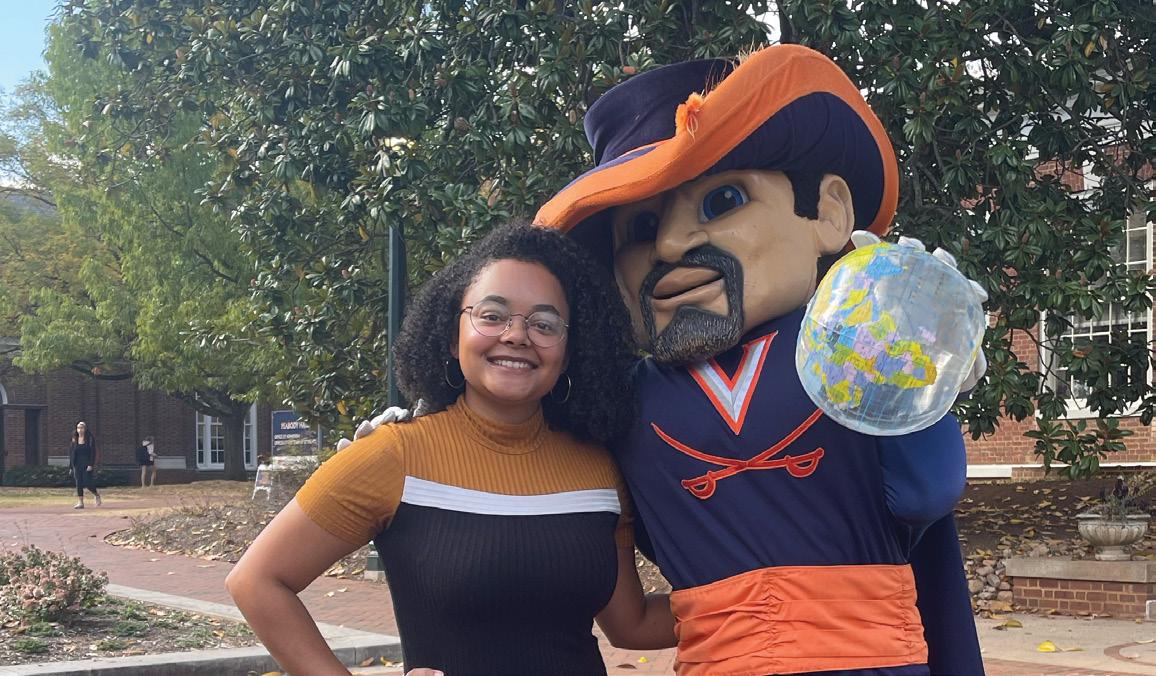
Each year, the International Studies Office hires interns to help promote education abroad to their peers. Interns who have previously studied abroad apply to share their experience and connect fellow students to this critical opportunity. This year, six interns participated from the College of Arts & Sciences and the School of Engineering, from majors including global studies, economics, art history, and systems engineering.
Interns are available to talk to students during weekly drop-in hours at the Georges Student Center, in Clemons Library. They represent the ISO in class visits (especially with first-year students in the College of Arts & Sciences) and at events around Grounds. During UVA’s 2023 Global Week, interns hosted an info session for interested students. In November and April, they led optional sessions for students already in-process to study abroad, where the interns shared their experiences and provided a space for those students to ask questions.
“The education abroad internship broadened my involvement within the University, allowing me to engage with my peers and UVA faculty in a variety of ways,” said Rachel Stenzel, who was part of the 2023 UVA in Paris program and spent a year interning at ISO. “My most rewarding experience was expanding my influence in the French department through outreach and presentations focused on French-speaking EA opportunities.”
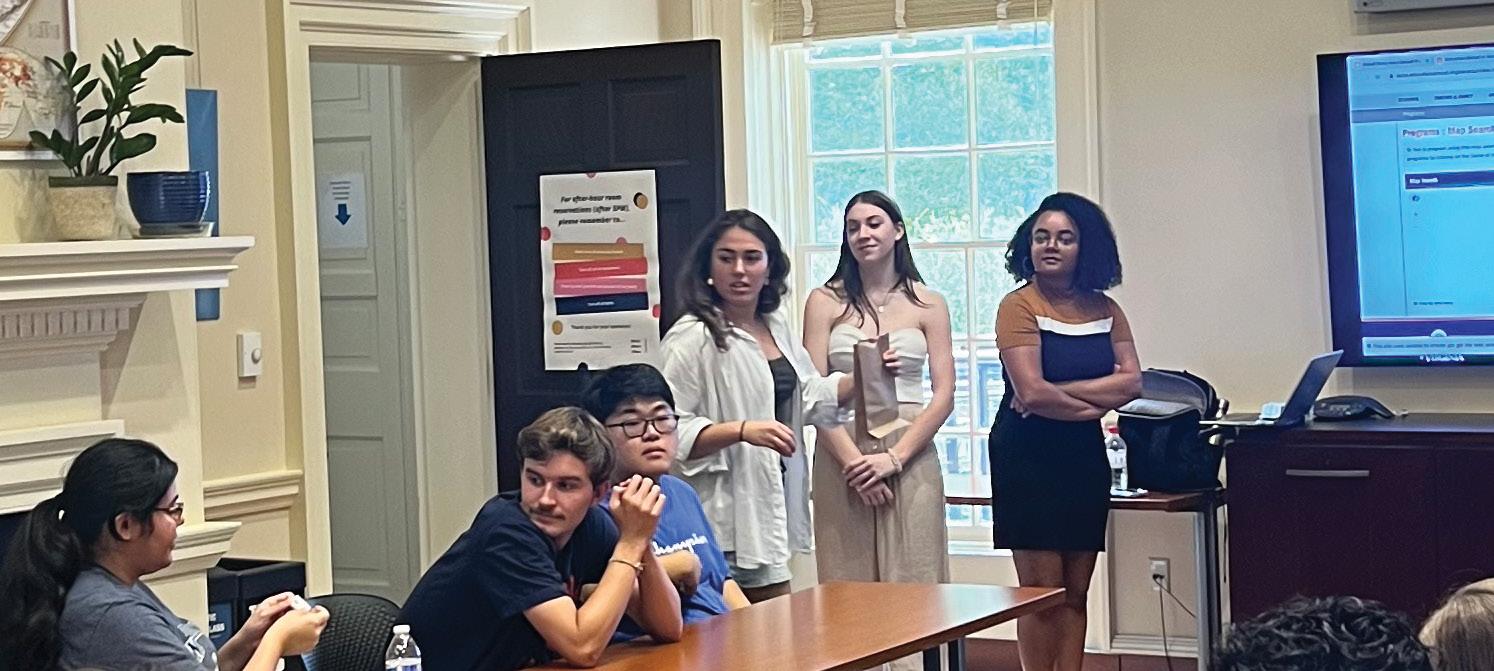
Faculty play a critical role in education abroad, both in supporting student endeavors and in leading programs.
For this academic year, faculty from across the University supported 85 programs. Several faculty also directed (or co-led) an education abroad program for the first time this year, including:
UVA IN GREECE:
Creative Interaction Design (Summer 2024)
Panagiotis Apostolellis, assistant professor, Computer Science, School of Engineering
UVA IN ST. KITTS AND NEVIS:
Public Health Sciences (Summer 2024)
Kelsie D. Kelly, assistant professor, Public Health, School of Medicine, and Christina Feggans-Langston, clinical instructor of nursing, School of Nursing
UVA IN KENYA:
The Business of Conservation (January term 2024)
Kisha Lashley, associate professor of commerce, McIntire School of Commerce
UVA IN PRAGUE:
Threshold of European Art and Culture (January term 2024)
Eric Ramirez-Weaver, associate professor of art and director of Medieval Studies Program, College of Arts & Sciences
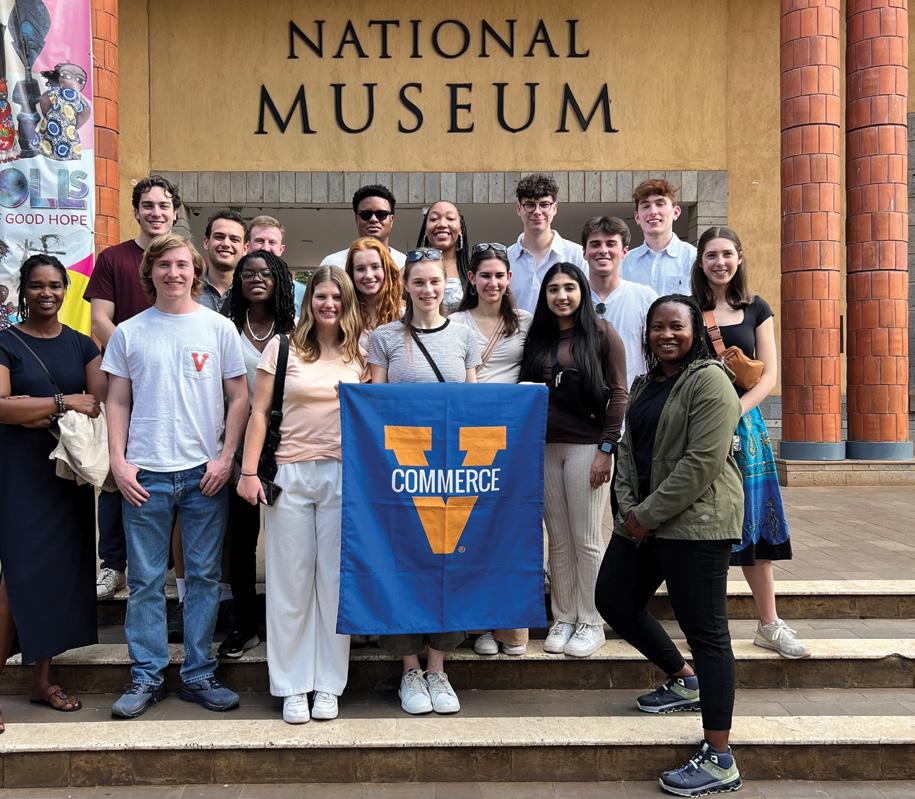
UVA IN DUBAI:
Systems Engineering (January term 2024)
William Scherer, professor, Systems and Information Engineering, School of Engineering, and June West, associate professor of business administration, Darden School of Business
UVA IN HUNGARY:
Experiencing Hungarian Music and Cultural History (Spring embedded 2024)
Daniel Sender, associate professor, Music, College of Arts & Sciences
During UVA’s 2023 Global Week, the ISO hosted a workshop for faculty interested in proposing and directing study abroad programs in the future. With a panel of experienced faculty directors and participation from longtime and new faculty, the ISO looks forward to making this an annual event.
In a recent study, surveying students from across multiple higher education institutions*, costs were the No. 1 factor preventing students from participating in education abroad. At UVA, support from donors can go a long way toward helping make a student’s dream of studying abroad a reality.
Over $500,000 was awarded in ISO-administered scholarships for 2023-2024, including three new offerings:
+ Buckhorn Foundation Global Experience
Bicentennial Scholarship
+ Masood Family Global Experience
Bicentennial Scholarship
+ Rue Mazarine Global Experience
Bicentennial Scholarship
Continuing to provide financial support to students through the creation of new scholarships is critically important in increasing student participation in education abroad.
Students who study, research, or intern abroad draw on their experiences in the workplace and in their personal lives. They express higher levels of satisfaction with their UVA experience than do peers who did not go abroad during their studies. We look forward to delivering even more education abroad programs and opportunities in 2024-2025 and making sure they are accessible to students regardless of major or family income.
FOR MORE INFORMATION on how to support education abroad opportunities for UVA students, please contact Carrie Jordan at cad4mn@virginia.edu.
* TerraDotta Voice of the Students 2024 Study Abroad Student Survey
3124 STUDENTS * FROM 107 COUNTRIES
*including OPT - Optional Practical Training
728 SCHOLARS 155 FACULTY FROM 80 COUNTRIES



The International Students and Scholars Program completed another successful year of service to the University’s international community.
This year, ISSP saw the continued success of several long-standing programs, including Global Greeters, International Student Citizen Leaders Fellowship, and International Student Support Circle. The program has also witnessed the flourishing of several new initiatives, including tax webinars, a Travel Signature Party, and the Global P2P Mentorship Program. The Global P2P Mentorship program completed its inaugural year in May 2024, matching 138 first-year international students with peer mentors from their home country or region. Mentees report that the program helped them feel welcome and supported upon their arrival. The Global P2P student leadership team looks forward to building on the program’s success as it enters its second year.
In Summer 2023, Global Greeters volunteers welcomed over 700 international students to Grounds during UVA’s international student orientation week. Global Greeters offered 12 programs designed to help students acclimate to life in Charlottesville, including tours of
Grounds, shopping trips to Barracks Road Shopping Center, and social events. Global Greeters hosted its first international graduate student dinner at the International Center—partnering with the Office of Graduate and Postdoctoral Affairs, the Graduate School of Engineering and Applied Science, and the Graduate Studies Office at the UVA School of Law. Over 200 international graduate students attended.
Throughout the 2024 academic year, ISSP continued its support of international students and scholars through various programs. The Citizen Leaders Fellowship—a collaborative effort between the International Studies Office, the Contemplative Sciences Center, and Athletics— gave year-long mentorship and training to international students, student athletes, and transfer students who aspired to make positive change for their communities. Seven of the 16 fellows who participated were international students, graduate and undergraduate, from five different countries.
Through an online module in the fall, a one-credit course in the spring, and individualized coaching throughout the year, fellows learned contemplative practices,


ethnographic methods, and skills in project management and public speaking. They used these skills to create and carry out a diverse array of community-building projects, making valuable contributions to the University in the spirit of citizen leadership.
The International Student Support Circle provided compassionate connection for graduate and undergraduate international students through weekly Friday afternoon meetings in the Student Health & Wellness Center. Students shared their joys, difficulties, and questions through 75-minute conversation sessions facilitated by CAPS counselor Baozhen Xie and International Student & Scholar adviser Caren Freeman.
The International Center continued to offer a rich array of cultural and social programs for the UVA community. This year, the center offered its Thanksgiving Meal Match program for the first time since the COVID-19 pandemic. This program paired 20 international students, scholars, and their families with community members for the holiday. The center is also proud to have launched its Open House series this year, which gives the international community a regular space to gather and enjoy a featured drink from around the world.
As the 2024 school year came to a close, the ISSP Team was pleased to present the ISO Graduation Awards to six outstanding graduates:
LEADERSHIP AWARDS —for leadership and dedication to the UVA international student body: Pablo Garcia Silva, Adi Raghavan, and Yunkai Sun
ACADEMIC EXCELLENCE AWARDS —for outstanding academic achievements during their time at UVA: Antonia Masias, Menglin Shi, and Bingtian Guo
The ISSP team is excited to welcome new incoming international students through a series of prearrival webinars. These webinars cover topics such as immigration essentials and navigating American culture. Incoming students hear from current international students as they reflect on their experiences and share their unique insights. Students continue to receive support throughout the year through timely webinars, email communications, and personal advising appointments.
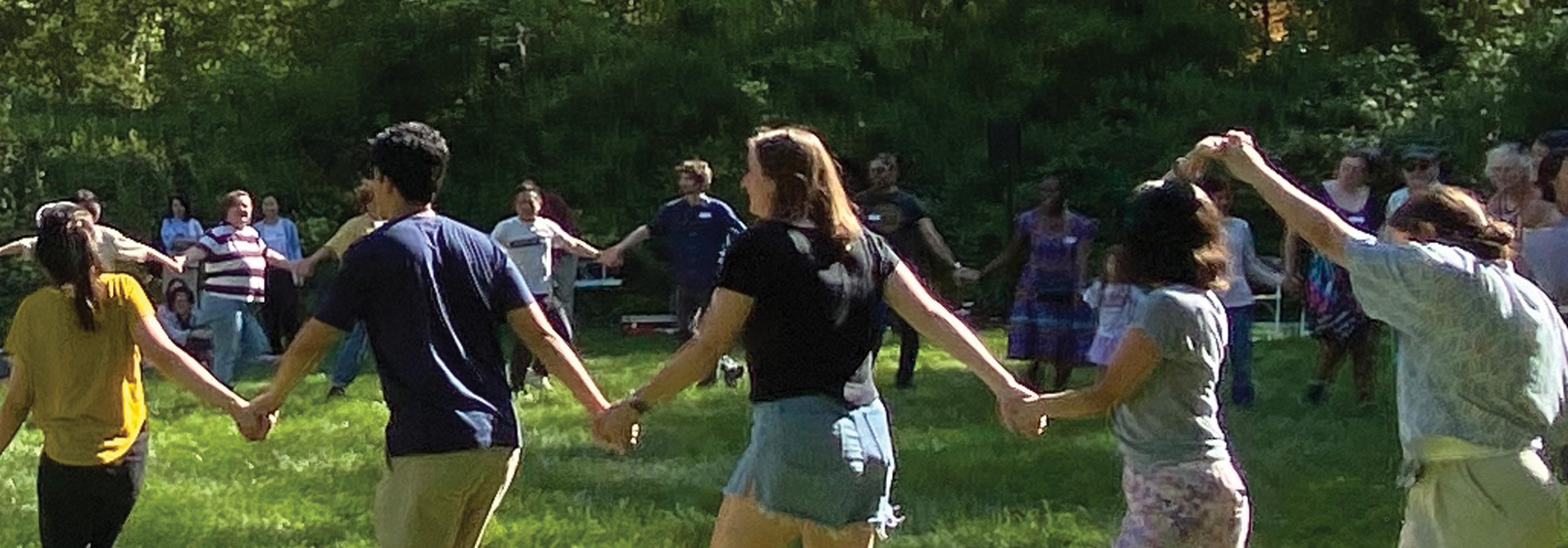
As a cornerstone of UVA’s global mission, ISSP addresses the unique needs of a vibrant international student and scholar community. Through expert, compassionate, and personalized advising, as well as cultural, social, and educational programming, ISSP supports a community that immeasurably enriches the life of the University.

The Office of Citizen Scholar Development, UVA’s home for fellowships and undergraduate research, supports students as they pursue global opportunities.
During the 2023-2024 academic year, the office approached full staff for the first time in years. As a result, staff could interact with many more students about available global fellowships. They also continued to support recipients who did not receive or who declined fellowships, providing wisdom and guidance as those students discerned their next steps. The spring semester was full of updates from those who are now pursuing a graduate degree or research abroad or accepting international professional work.
This year, more STEM students pursued global fellowships. Among the recipients:
Isabella Dressel, named a Churchill Scholar to pursue chemistry research for a year at Churchill College, Cambridge
Skylar Gay, awarded the ThinkSwiss Research Scholarship to pursue biology research for the summer in Switzerland
Alex Rosenthal, awarded the Fulbright U.S. Student Award to pursue astronomy research for a year in Australia
Three students received the Rotary Global Grant, marking the eighth year in a row that at least one recipient has come from UVA. These recipients started preparing their applications when they pursue a Fulbright or other global fellowship in the Office of Citizen Scholar Development.
Fellowships highlights:
+ 1 (of 16) Churchill Scholars, 6th ever from UVA
+ 1 (of 32) Rhodes Scholars, 56th ever from UVA
+ 3 Rotary Global Grant recipients, 12th-14th in eight years
+ 1 Schwarzman Scholar, 13th ever from UVA
+ 3 Critical Language Scholarship recipients
+ 6 Benjamin A. Gilman Scholarship recipients
AS A RESULT OF LAST YEAR’S 13 FULBRIGHT RECIPIENTS, the University of Virginia remained a “Top Producing” institution for the Fulbright U.S. Student Award. This marks the seventh time UVA has achieved this recognition in the past nine years. Students who begin the Fulbright process go on to receive many other fellowships every year, and this year was no different.


Increasing participation of current students and alumni shows a growing interest in global fellowships at UVA.
“Cross-cultural competency and a broader worldview are beneficial to any service and leadership-related career. In the five months I’ve been in Bulgaria, I’ve learned that many aspects of teaching and leadership are parallel–namely, caring about the development of others.”


“I think new doors have opened. Connecting with the world-class leaders, ideas, and resources of the Schwarzman Scholars network enables me to accelerate my impact in my field of work. I hope to help strengthen political and cultural understanding of China among American policymakers and people so that we have greater empathy and are better equipped to collaborate on global issues.”
+ College and Graduate School of Arts & Sciences
+ Darden School of Business
+ School of Law
+ School of Education and Human Development
+ Environmental Institute
+ School of Data Science
+ Frank Batten School of Leadership and Public Policy
+ McIntire School of Commerce
+ Center for Politics
+ School of Engineering and Applied Science
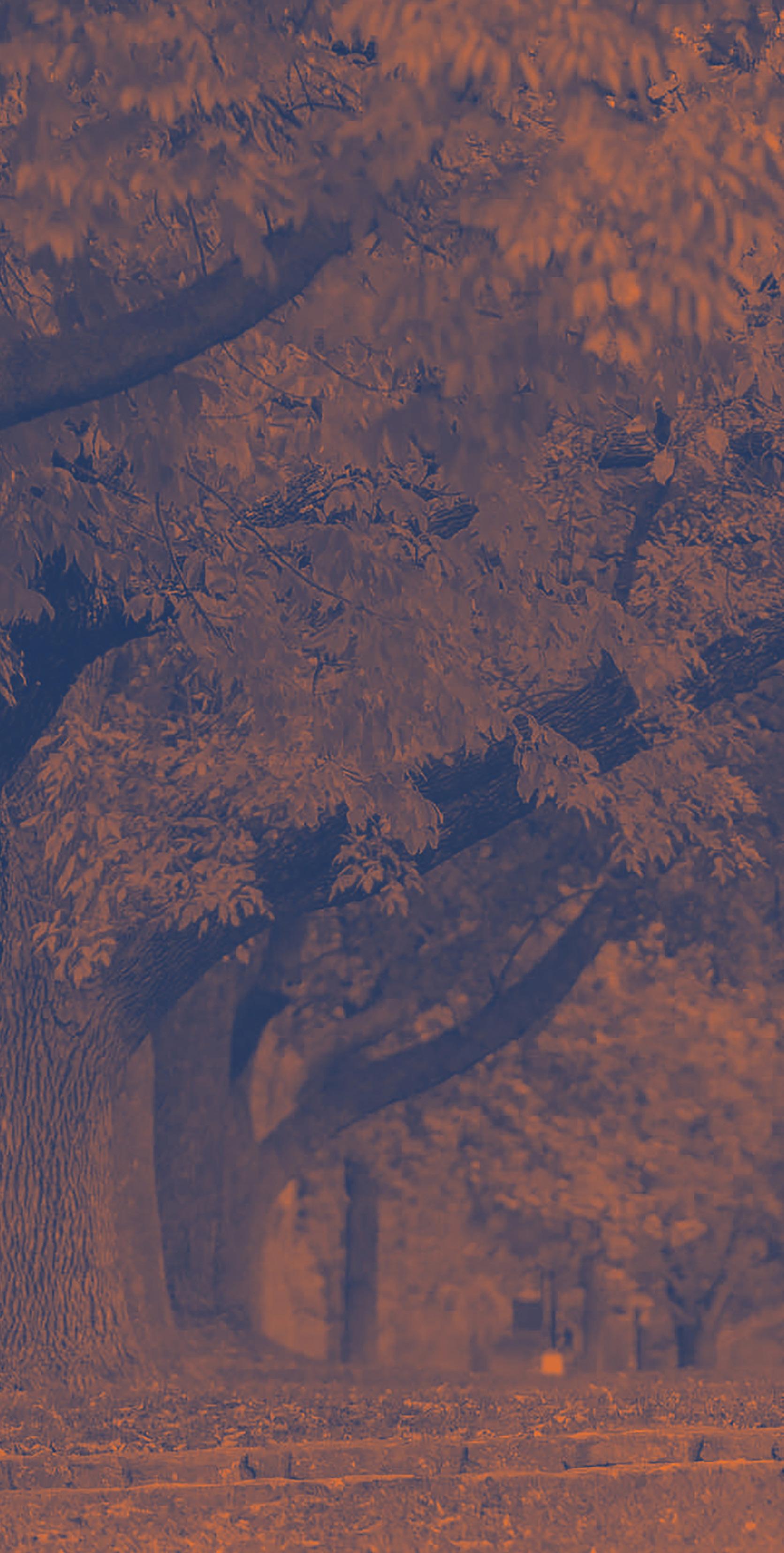

“
We live in a globally connected world, where actions in one part of the globe can have repercussions elsewhere. This makes it necessary for business professionals to be able to analyze complex problems and generate solutions that provide value for multiple constituents.”
Kisha Lashley, associate professor of commerce

COLLEGE AND GRADUATE SCHOOL OF ARTS & SCIENCES
A new collaboration between UVA and Spain’s Cervantes Institute led to expanded educational resources for Spanish-language instruction in the College and Graduate School of Arts & Sciences.
The collaboration was celebrated in the Dome Room of the Rotunda with a September 21 ceremonial signing by A&S Dean Christa Acampora and Cervantes Institute Director Luis García Montero. The agreement allows students in the Department of Spanish, Italian & Portuguese to graduate with the highest certification of Spanish proficiency in the world, an opportunity unavailable to students at any other U.S. university.
Spain’s leading public cultural institution with centers in 43 countries, the Cervantes Institute was created to further the teaching of Spanish and enhance the visibility of Spanish and Latin American culture. Its agreement with UVA includes provisions for institutesponsored cultural events that bring celebrated Spanish and Latin American writers, filmmakers, and other artists to Grounds.
“The University of Virginia’s programs in Spanish and Latin American literature and Spanish language are among the most prestigious in the country,” Montero said, “and the Cervantes Institute is interested in entering agreements with the most prestigious universities.”
Under the new agreement, UVA became the first U.S. university with a designated “Cátedra Cervantes” professor, the highest professorship in Spain. The agreement also offers Cervantes Institute resources to support Spanish-language instruction at UVA, including training courses for Spanish teachers.
Acampora celebrated the new agreement for its key role in improving and expanding opportunities for Spanishlanguage education in the United States. U.S. Census Bureau statistics indicate that in this nation of more than 330 million people, more than 20% speak a language other than English at home, with 62% of those speaking Spanish. At the same time, an increasing majority of the population only speak English.
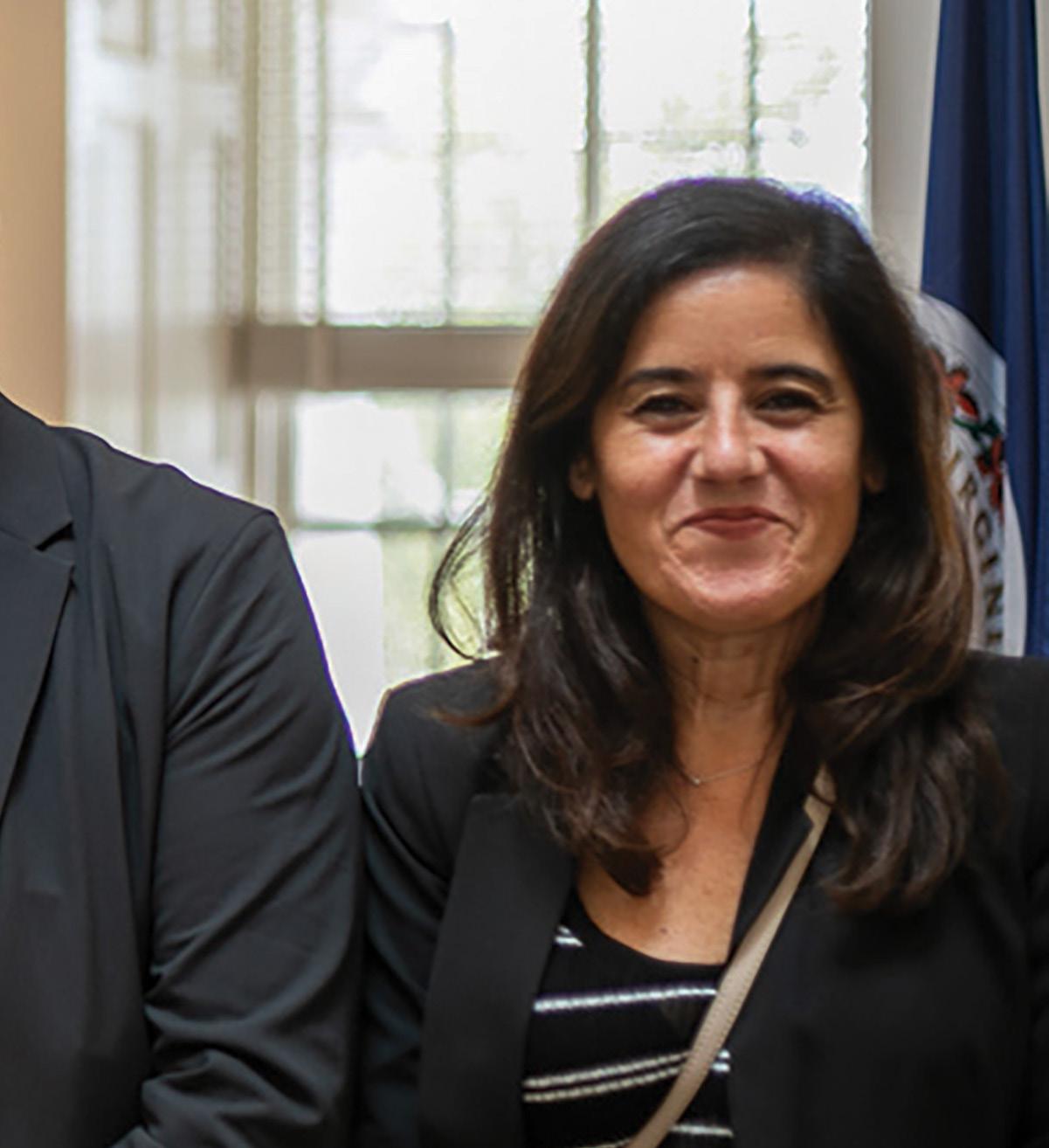

Faculty from the College and Graduate School of Arts & Sciences conduct research around the world, collaborating with academic colleagues in other countries and with international agencies and organizations.
One of last year’s additions to the A&S faculty contributing to these research efforts is Aaron Martin, a social scientist specializing in technology policy and data governance.
“Spanish-language instruction is essential for providing access to many cultural treasures and important histories,” Acampora said. “Given the prevalence of Spanish-language speakers in this country and worldwide, Spanish is also essential for the vitality and viability of our democracy. The University of Virginia is honored to be entrusted, through this important collaboration, with a leading role in that mission.”
The announcement of the agreement coincided with the appointment of four new tenure-track faculty members in the College’s Department of Spanish, Italian & Portuguese, and the celebration of the 40th anniversary of the UVA in Valencia program, the University’s oldest education abroad program in continuous operation.
“It really feels like a moment of rebirth and reenergizing,” said professor Enrico Cesaretti, chair of the Department of Spanish, Italian & Portuguese.
An assistant professor in the Department of Media Studies, Martin holds a joint appointment in UVA’s School of Data Science. He studies how regulation can facilitate just, inclusive, and secure digital societies, focusing on how transnational policy is established by international bodies and humanitarian organizations. Martin also explores how users in historically marginalized communities, including refugees and other vulnerable people, understand and shape technology and its regulation.
Martin’s ongoing projects include a collaboration with the United Nations High Commissioner for Refugees— exploring the “digital risks” incurred by refugees and members of displaced populations doing gig work in their host communities. Navigating the digital world exposes refugees to a range of risks, including identity theft, online scams, even human trafficking. Martin’s project with the UNHCR supports a framework for U.N. agencies and other organizations focused on refugee inclusion and trying to mitigate those risks within refugee communities in East Africa, the Middle East, and elsewhere.
DARDEN SCHOOL OF BUSINESS
When Kiana Feliciano (MBA '24) learned about the Darden Worldwide Course in Morocco, she found learning on the ground, at the confluence of many different cultures, immensely appealing. The agenda for the course, led by professor Paul Matherne (EMBA '10), also confirmed Feliciano’s initial excitement.
“The theme itself was ‘Doing Business In Morocco,’” she said, “but it covered so much: the business side, the cultural side, politics, and economics. I was really excited when I saw the itinerary, because they tried to make sure we saw a little bit of everything.”
Then, shortly before the course was to start, Morocco experienced an enormous earthquake, killing thousands and devastating large swaths of the mountainous countryside.
Matherne and organizers at the Darden Center for Global Initiatives reassessed the original course, working to ensure the course would be safe, meaningful, and appropriate in the wake of the destruction.
The course did proceed, as much of Morocco was unscathed by the earthquake. But the planned visit with the High Atlas Foundation, a nonprofit organization
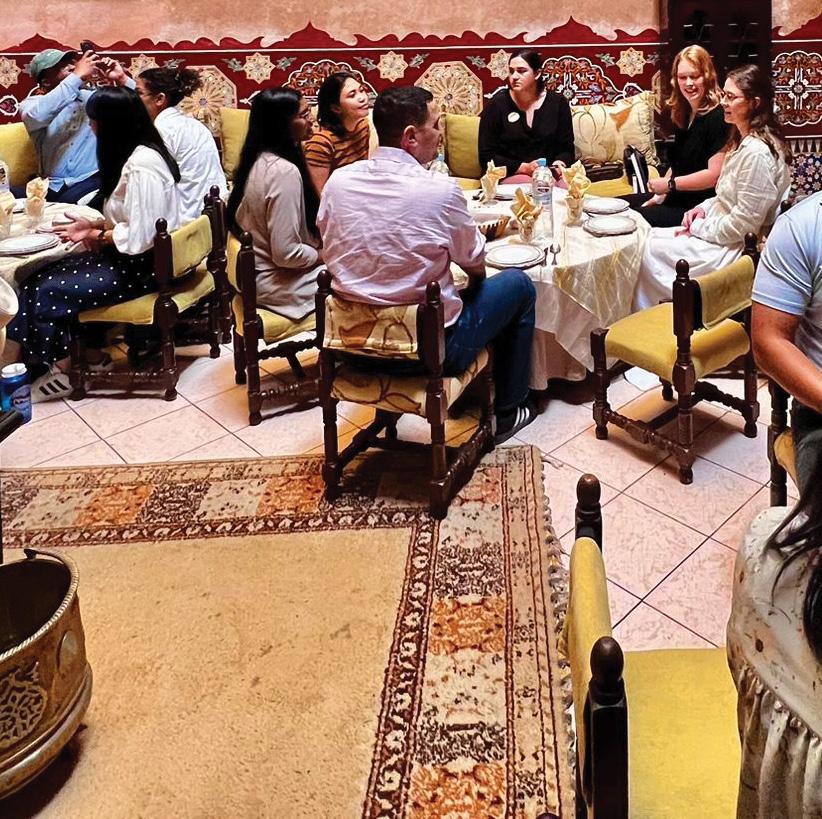
based in the area particularly hard hit by the earthquake, took on new relevance. The organization, which has a longstanding relationship with UVA and Darden, helps rural communities prioritize and create sustainable development goals. The foundation plants and grows trees for carbon offsets, using the proceeds for community-driven initiatives such as water infrastructure, women’s cooperatives, and education.
After ensuring that their presence would not be a hindrance to recovery efforts, Matherne revised his itinerary to include additional time with the High Atlas Foundation.
“I think what the Darden students got is an honest upfront look at what shared growth in an enduring way could look like,” said Yossef Ben-Meir, president of the High Atlas Foundation, who is based in Morocco but a frequent guest lecturer at UVA. “We’re also sharing a story, a story that we love to share, that we believe in.
And hopefully some connection, some ongoing relationship will continue afterward. But you’re just really spending time together trying to learn from each other.”

Among other activities, the Darden students observed what Ben-Meir described as a psychosocial empowerment working session with groups of women who were processing the trauma and aftermath of the earthquakes.

“It was emotional,” Matherne said. “We couldn’t understand what they were saying, but they were blowing up balloons that signified how much residual fear they had. And the kids were all asking us about earthquakes and whether we had experienced one.”
Ben-Meir said he initially worried that the intensity level may have been too much for the students, but as the day progressed and students and participants ate lunch together, it was clear the interaction was “warm and sincere and emotional,” Ben-Meir said.
Before going to Morocco, Matherne and the Darden students decided to make a modest contribution to ongoing recovery efforts—gathering clothing, blankets, and toys to bring to the affected communities, as well as hosting a lunch in one of the villages. Many students also bought handmade carpets from the artisans, which may not have been the most convenient items to carry on the journey home but were meaningful for the crafters and participants.
Feliciano said students left in awe of how the women in the community appeared to be pushing through scenes of devastation to continue the efforts of their cooperatives.
“There are so many places in the world that are in dire need of humanitarian aid,” she said, “and these communities, yes, their homes need rebuilding, but they have the community and they have each other, too, and that was helping them through trying times.”
The High Atlas Foundation was perhaps the highlight of the trip, according to Matherne and Feliciano, yet the Darden Worldwide Course offered countless other learning opportunities not easily available for international travelers.
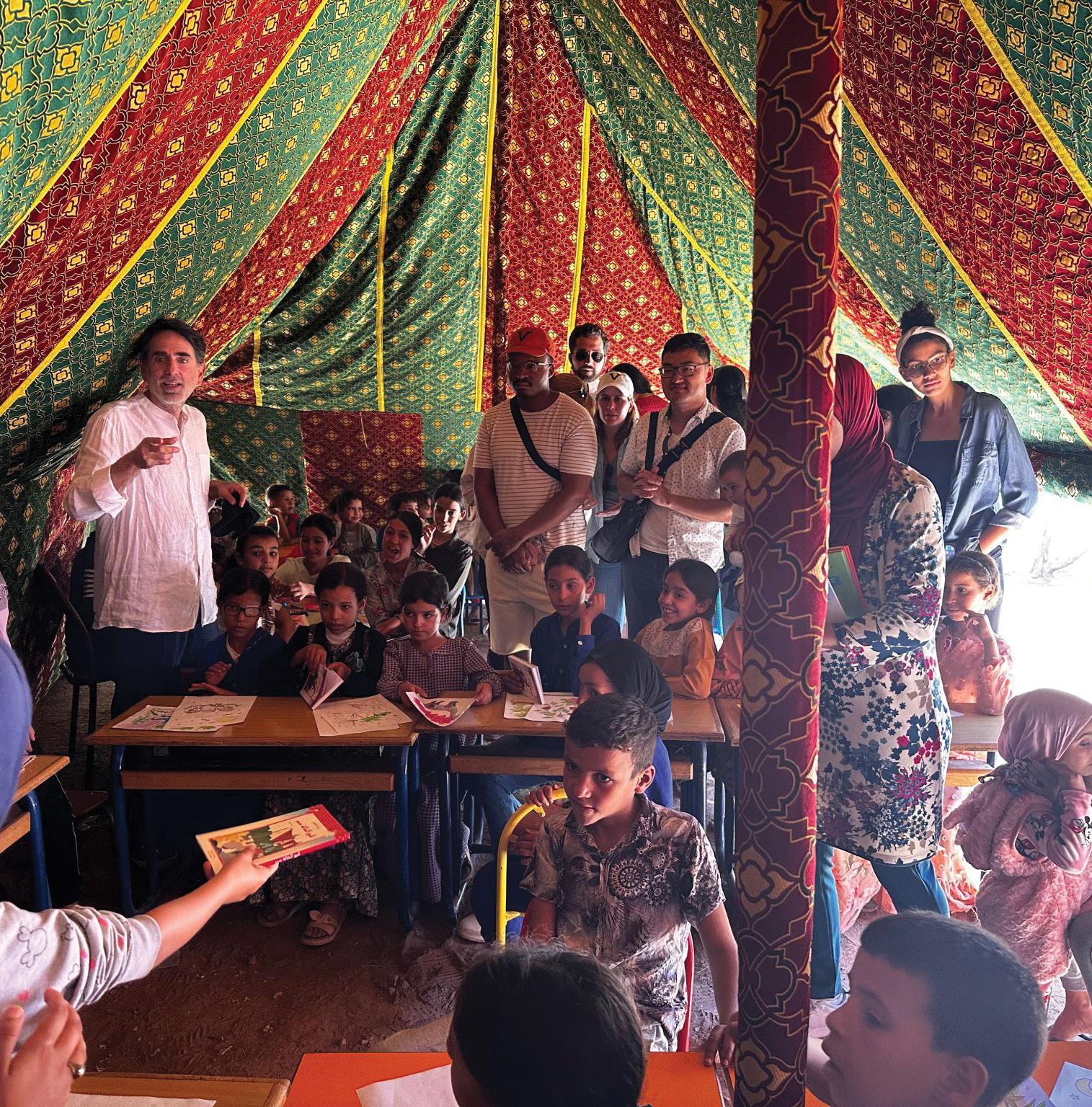

In recent months, Professor Camilo Sánchez and several of his students logged over 17,000 miles working on human rights issues as part of the International Human Rights Law Clinic he directs at UVA’s School of Law.
Over spring break, Sánchez traveled with four students to Salta Province in northern Argentina on a criminal justice reform project conducted under the auspices of the U.S. State Department. Then later in March, Sánchez and three students attended the 55th session of the United Nations Human Rights Council, held at the U.N. headquarters in Geneva, Switzerland.
“Traveling across continents — and from a Spanishspeaking nation to a French-speaking one — was undoubtedly exhausting, yet the invaluable learning and significant impact on our clients and projects made it entirely worthwhile,” Sánchez said.
The U.S. Embassy in Argentina had worked with the State Department’s Diplomacy Lab to find a team of university researchers to evaluate and report back on how the country is handling its transition to an adversarial federal criminal justice system and away from an “inquisitorial” model.
A team of clinic students — including Zach Zamoff '25, Chloe Chiles '25, Lillie Stephens '25 and Grace Zipperer '24 — worked on the project. Luis Santiago Genovesi, an LL.M. student and Sánchez’s research assistant, also joined the students for the research.
The students personally interviewed judges, prosecutors, and public defenders involved in the reform, accompanied by Jessica Kuhn and Jérémie Swinnen from the U.S. Embassy in Argentina. The team met with the ambassador on their return and presented their findings to the Diplomacy Lab.
“It was pretty remarkable — we had dinner with the top judge, the top prosecutor, and the top public defender in Salta,” Zamoff said. “I was really grateful for the opportunity to learn from these people, and it really showed me the value of public service.”

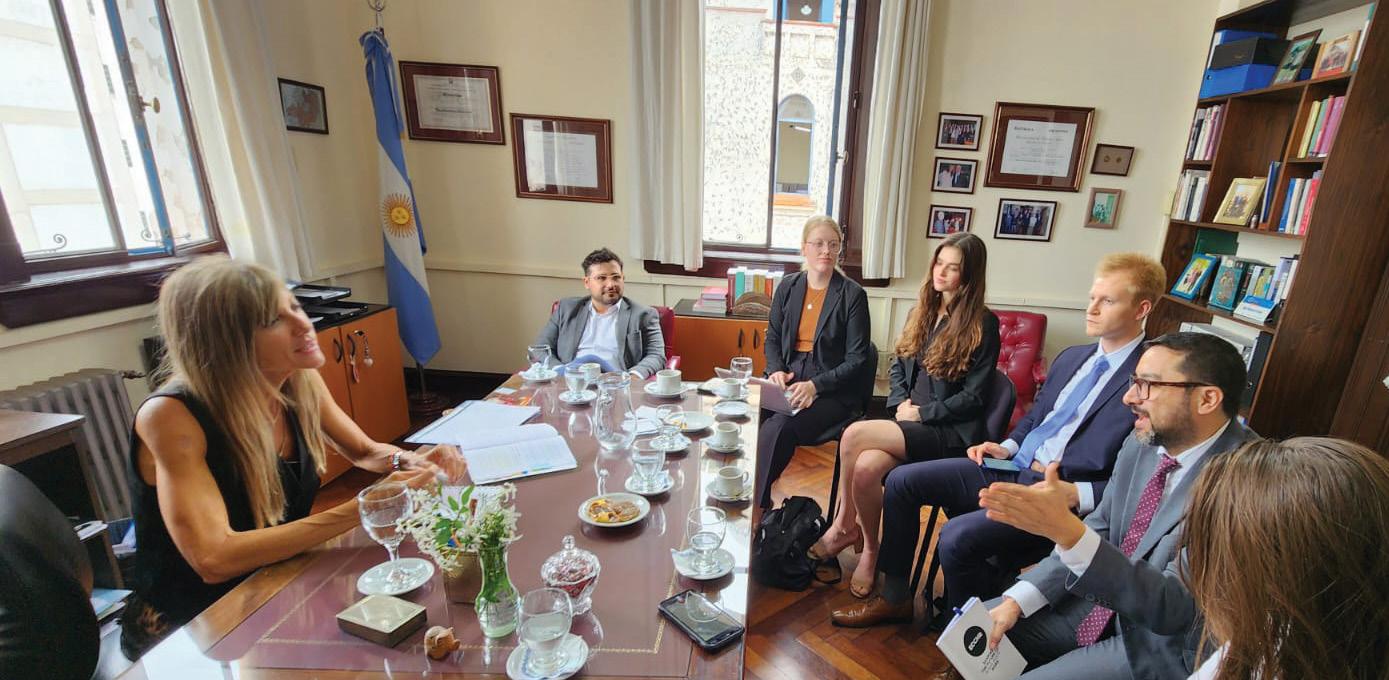
Twelve thousand miles later, Sánchez, Zipperer, and two other students — Sabrina Mato '24 and Jessica Williams '25 — were in Geneva to observe the work of independent experts who report to the U.N. Human Rights Council on their human rights investigations in various countries of concern.
The clinic advises several partners on similar matters. Understanding the council’s modus operandi enables the clinic to safely advise clients who need assurances of anonymity and protection, Sánchez said.
The sessions made an impression on Mato, who left Cuba with her family as a child. Cuba is a member of the U.N. Human Rights Council, despite U.S. concerns about its human rights record and treatment of political dissidents.
“Having just gone back there a couple months ago to visit family, the actual situation there is really heartbreaking,” Mato said. “It was very frustrating to me to hear their representative talk the U.N. lingo about supporting human rights.” Still, she was struck by how much advocacy and dialogue is going on informally behind the scenes.
“There are a lot of informal chats, like coffee chats and side conversations, and it seems like people are willing to talk,” Mato said. “There is a lot of change being made, we’re just not seeing it as the public — we only see their final two-minute speech.”
“Attending the Human Rights Council sessions was highly instructive, particularly in regard to my work as an advocate for refugees,” Zipperer said. “From interviewing criminal justice attorneys in Argentina to meeting with attorneys and professionals at the U.N., the field experiences in this clinic far exceeded my expectations.”
To introduce computer science to students, teachers in pre-K, elementary, middle, and high schools often need expensive equipment paired with reliable Wi-Fi in their classrooms. But for many rural and low-income urban students, that equipment and infrastructure is not readily available.
UVA’s Global Center for Equitable Computer Science Education is expanding how computer science is integrated into all of these schools. The center brings together faculty at the schools of Education and Human Development and of Data Science, the Department of Computer Science, the University of Virginia’s College at Wise, and Universidad del Norte in Colombia.
The center’s solution: create a low-cost, open-source robot with expanding functionality that can be used by students in multiple grades. The team creating the robot is led by associate professor Jennifer Chiu, graduate student Eric Bredder, education and outreach director Kim Wilkens, and Camilo Vieira, assistant professor at Universidad del Norte.
With funding from UVA’s Center for Global Inquiry and Innovation, the team got to work designing the robot. The current version can be built for $25, and all project designs will be freely available to the community through the center, paired with Github—an online software platform. The team was also recently awarded a $1.3 million grant from the National Science Foundation to continue the work.
The robot, Roversa, is designed to evolve with the students using it. The team created the robot to be compatible with LEGO® bricks and decorated with materials already in classrooms, allowing students to use their creative touches to customize the machines.
Pilot work with over 30 teachers in Virginia and 30 more in Colombia revealed that Roversa is instantly engaging for learners of all ages. The team currently has requests for hundreds of robots to be made for classrooms in both countries.
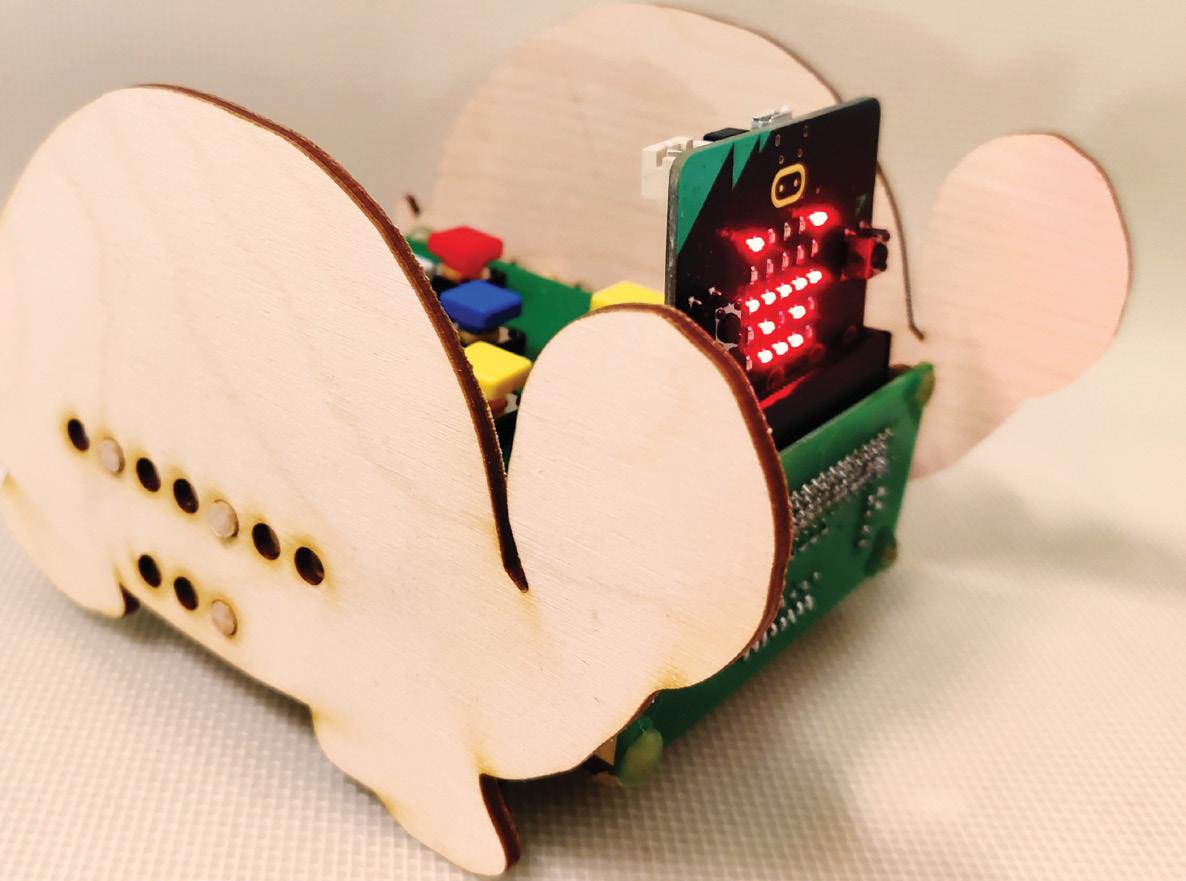
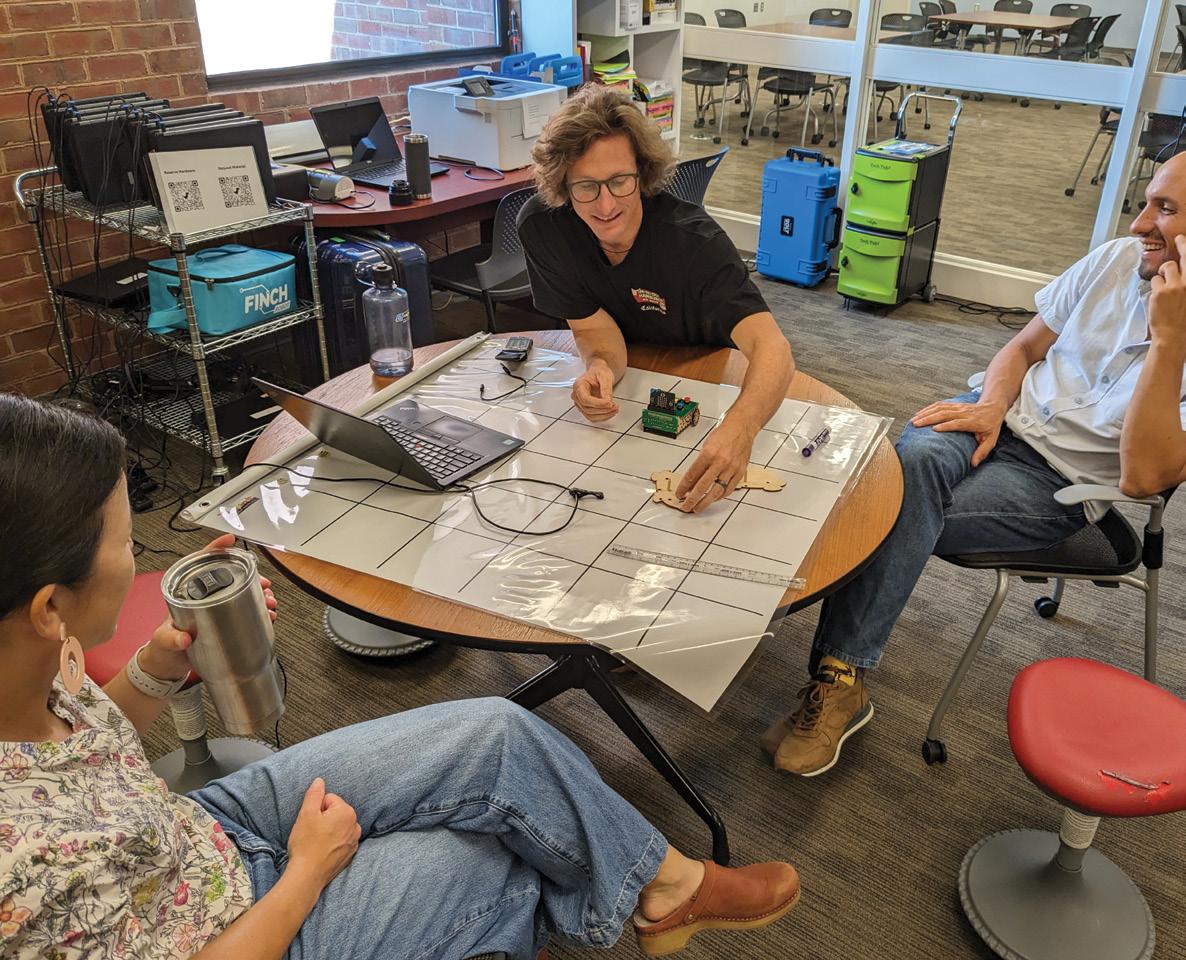
For Chiu and her team, the students and teachers themselves lie at the heart of their research— understanding how children learn and supporting teachers to integrate computer science into their classrooms.
“We’re studying how computing concepts, like algorithms and debugging, develop at young ages,” Chiu said, “and how this might influence general cognitive skills that have influence over STEM success.”
Chiu is eager to expand computer science research beyond the relatively privileged settings of the Global North, where it is typically done.
“We are focused on expanding research in the Global South and in under-resourced areas,” she Chiu, “so that we can begin to understand the different strengths and assets that different contexts bring to computing and how to support them.”

ENVIRONMENTAL INSTITUTE
Through an innovative approach called “Climate Collaboratives,” UVA’s Environmental Institute gathers thought leaders from multiple disciplines to work directly with community members on strategies for a more equitable, resilient, and sustainable future worldwide.
The first two teams selected by the Institute, announced in August 2023, are deep in their research, with support promised for three years.
The Environmental Institute is a pioneer in large-scale, community-based research projects, such as the climate equity project on Virginia’s Eastern Shore. Based on positive outcomes there, UVA is catalyzing a research model where community members are fully integrated in the questions and outcomes from the start.
One of the first Climate Collaboratives is researching how women in India can be supported as change agents when it comes to water security. The other is exploring how Appalachia can benefit from the clean energy revolution.
In Bihar, currently India’s most flood-prone state, the UVA team supports elected women representatives as they seek solutions from the state to ensure water security during flooding.
Bihar also has one of the country’s highest poverty rates. Climate change has led to an increase in the amount and severity of flooding, so local wells, along with other drinking water infrastructure, need to be placed in areas that are less vulnerable.
Women bear a disproportionate burden of damages due to flooding. They cook with limited resources, take care of children and adults, and access limited drinking water. In Bihar they are also tasked with gathering relief material.
Women report feeling insecure and overburdened as flooding events more frequently occur.
As of yet, there are no policies or programs specifically tailored to women that empower them as agents of change in their communities. Yet elected women representatives have a unique perspective, so the Climate Collaborative in Bihar is working with these and other community members on potential long-term solutions.
In Appalachia, the Climate Collaborative works with local community members to ask what is needed for a transition to renewable energy. Team members explore whether projects can be co-developed with stakeholders to maximize economic benefits, job opportunities, and community resilience.
In 2022, renewable energy (wind, solar, hydropower, geothermal) provided nearly 75% of new utility-scale generating capacity across the U.S . This is a trend expected to grow. This project looks at a renewable energy economy in Appalachian Virginia in an integrated, society-first approach.


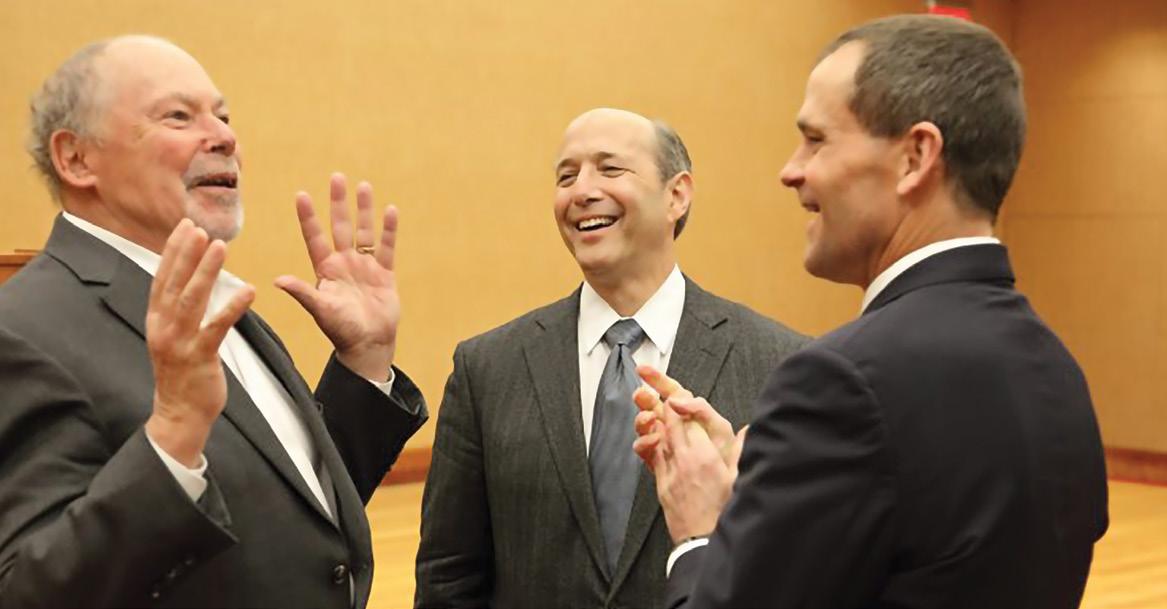
UVA’s School of Data Science is collaborating with Italy’s IMT School for Advanced Studies Lucca to identify synergies between both schools’ research and academic programs and to establish faculty and student exchange programs.
In May, four data science faculty participated in a seminar with IMT to generate ideas for joint projects and these proposed exchanges.
The faculty were Don Brown, senior associate dean for research; Gianluca Guadagni, associate professor; John Darrell Van Horn, professor; and Brian Wright, associate professor and director of undergraduate programs. Wright was also a visiting fellow this summer at IMT, where he interacted with graduate students and school faculty.
Van Horn, who has served as a visiting faculty member for the last three years at IMT, was instrumental in building the partnership between the two schools.
“We learned very quickly,” Van Horn said, “that in spite of the physical distance between our institutions, we are intellectual neighbors in the data science space—each seeking to develop and apply machine/deep learning and AI methods across many areas of exciting research.”
IMT is located in the historic Tuscan city of Lucca, surrounded by Renaissance-era walls. A public university, IMT is committed to the analysis of economic, societal, technological, and cultural systems.
UVA’s School of Data Science, established in 2019, is dedicated to being a “school without walls,” and its growing relationship with IMT is emblematic of the collaborative approach to research and education that was a founding principle of the school.
Rapidly evolving technologies will have a profound impact on democratic institutions. With great promise comes a significant risk that new digital tools and innovations will increasingly be used to sow misinformation and weaken democratic norms and systems.
Therefore, UVA’s School of Data Science and Flinders University in Australia last year reached a partnership agreement: to promote research and knowledge exchange in key areas such as artificial intelligence and data security.
This partnership will promote the ethical use of data and technology to achieve positive social impacts—a natural fit with untold potential to promote global security.
The School of Data Science is specifically working with the Jeff Bleich Centre at Flinders University—named after the U.S. ambassador to Australia from 2009 to 2013, who serves as chairman of the organization’s advisory board. Established in 2019, the Jeff Bleich Centre helps nations adapt to new security areas where technological changes are reshaping society. Its research spans a wide range of technological issues, from social cybersecurity to digital technology and extremism.
Also founded in 2019, the School of Data Science is committed to the practice of data science for the common good. Its faculty brings a wealth of knowledge and expertise to discussions of AI, data governance, and other areas that will help define the future. There is also a personal connection between Flinders University and the School of Data Science: Dean Phil Bourne completed his PhD at Flinders in 1980.
FRANK BATTEN SCHOOL OF LEADERSHIP AND PUBLIC POLICY
Northern Ireland offers a rich and compelling opportunity to learn from a complex society— one that has experienced policy-driven ethnic exclusion, a civil rights movement that mutated into a violent conflict, and an ongoing peace process that directly reckons with long-standing harms from punitive policing.
The Frank Batten School of Leadership and Public Policy offers a capstone course that includes field study in Ireland over spring break.
The course, launched in 2014, examines:
+ development of the conflict in Northern Ireland
+ institutional reforms embedded in the peace process, culminating in the 1998 Good Friday Agreement
+ stability of the peace in the ensuing years
+ the strains placed on the peace by the Brexit vote in 2016
Students learn how elites re-crafted political institutions for power-sharing, how employment opportunities are critical to the peace process, and how the ongoing historical meaning of “the Troubles” is contested.
Student participants are based in Dublin, then travel to Derry and Belfast during their week abroad. The course is taught by Paul Martin, associate professor of public policy, who has received multiple recognitions for his work focused on political representation, elections and policy, mass media, social capital, and peace and conflict.
“Teaching in another country deepens planned learning and offers unexpected growth opportunities,” Martin said. “There’s a difference between reading about the ‘interfaces’ or ‘peace walls’ that separate neighborhoods in Belfast and having a visceral response to their stunning size, scale, and ubiquity.”

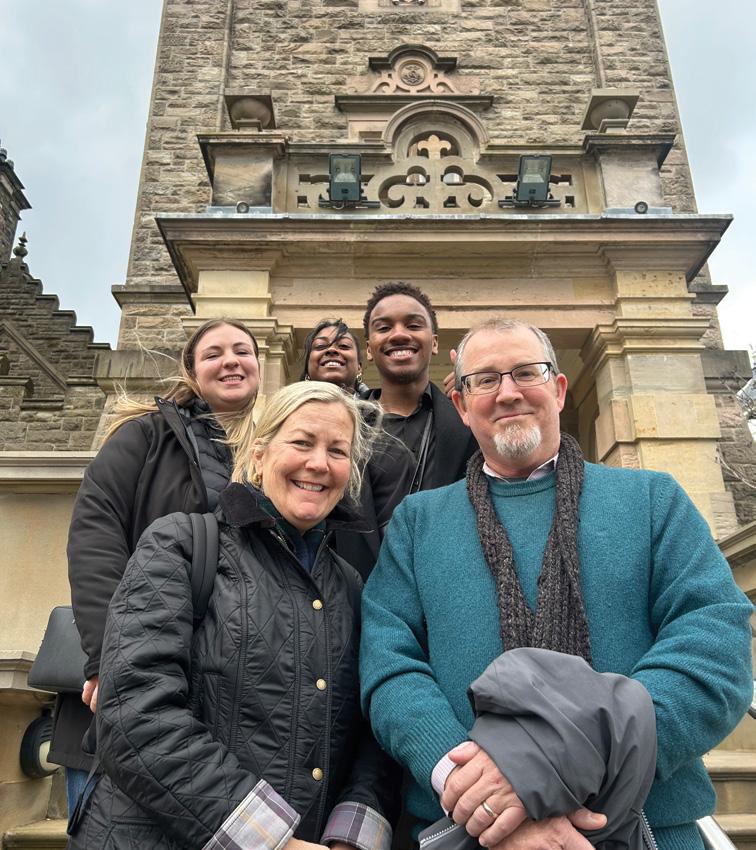

its
year undergraduate students. Significant financial support is available to ensure that any Batten student interested in the course can participate.
Emily Pasquinelli (MPP '24) describes studying abroad in Northern Ireland as one of the most transformative experiences of her college career. “Our trip to Derry was particularly memorable, as we heard firsthand stories from people impacted by the Troubles and Bloody Sunday. I am so grateful to have learned from the resilient communities in Northern Ireland and am inspired by the work being done to promote peacemaking across the region.”

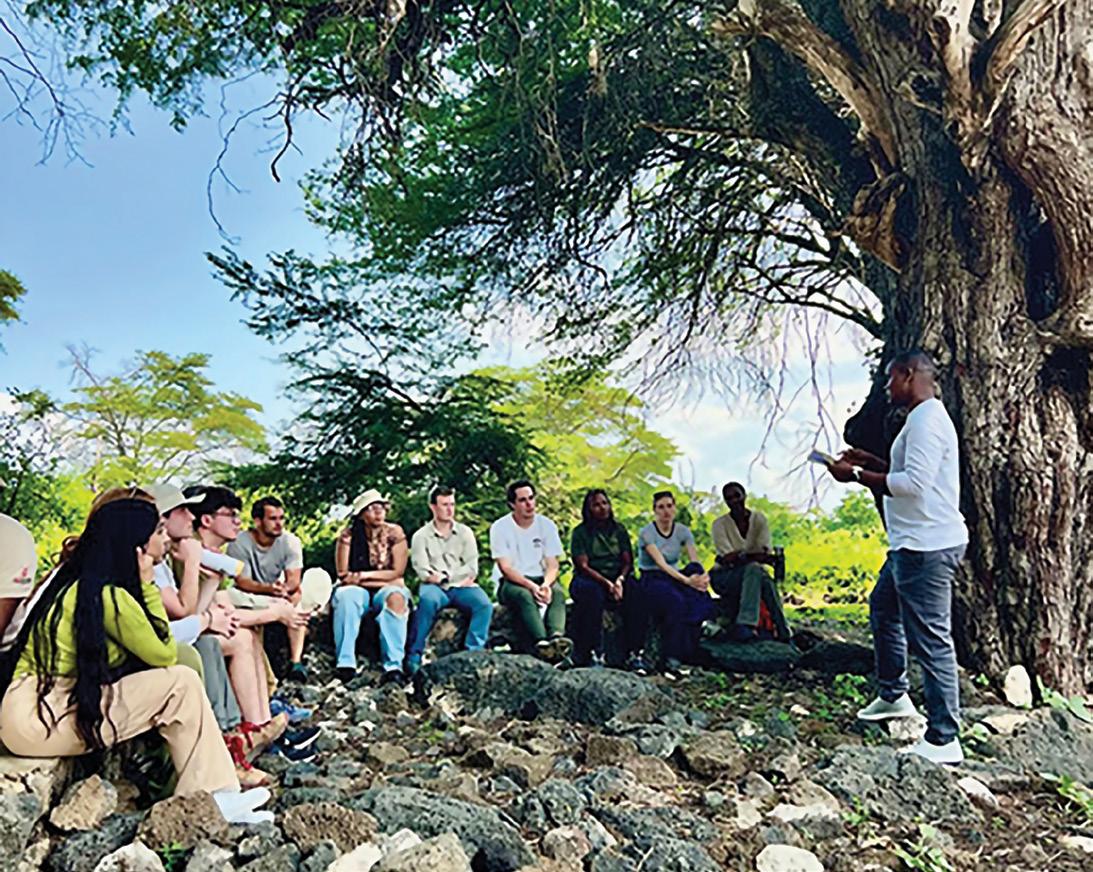
M c INTIRE SCHOOL OF COMMERCE
The McIntire School of Commerce continued to expand and enhance its global course offerings this academic year, sending students around the world during the January term.
Existing J-term classes focused on Asian financial capitals in Malaysia and the Republic of Singapore; sustainable investing in Germany and Switzerland; and consulting with wineries in Argentina. Then the Commerce School launched The Business of Conservation in Kenya, available to students across the University.
Commerce associate professor Kisha Lashley taught the course in the East African nation, examining the many challenges of conservation. While studying the pressing issues involved and the role of the private sector in providing solutions, students experienced the rich culture of Kenyan food, art, and customs, as well as the nation’s renowned wildlife. They quickly came to appreciate connections and disparities between their home environments and the context of their Kenyan hosts.
“We live in a globally connected world, where actions in one part of the globe can have repercussions elsewhere,” Lashley explained. “This makes it necessary for business professionals to be able to analyze complex problems and generate solutions that provide value for multiple constituents.”
She added that she wanted to take the students far out of their comfort zones, immerse them into a complex issue, and have them develop solutions that account for the disparate needs of different stakeholders. “The issue of wildlife conservation in Kenya provided an ideal context.”
Students arrived in Nairobi and visited cultural sites, including the Kazuri Beads Factory and the National Museum of Kenya, before learning about the conservation landscape at the Kenya Wildlife Service and then the Chyulu Wilderness Camp. They visited Maasai Wilderness Conservation Trust headquarters to learn about MWCT’s carbon credits project, then met with Maasai representatives to hear about a project to reduce emissions from deforestation and forest degradation in developing countries. They also observed wildlife in Tsavo National Park.
These experiences allowed students to see meaningful change in action for the people who live in the areas they visited. They heard firsthand accounts from MWCT stakeholders of how local indigenous groups are lobbying the government, advocating for international relief, and creating a profitable, sustainable organization. And they learned of the outsized positive impact the Maasai are having—with minimal government aid—through new schools, infrastructure improvements, increased medical care, emergency services, women’s health, wildlife protection, and much more.
All told, the new course on the business of conservation in Kenya helped shed light on a widespread global problem that requires stakeholders to work together—despite conflicting views and desired outcomes—and to accept incremental successes, focusing on progress rather than sweeping solutions.
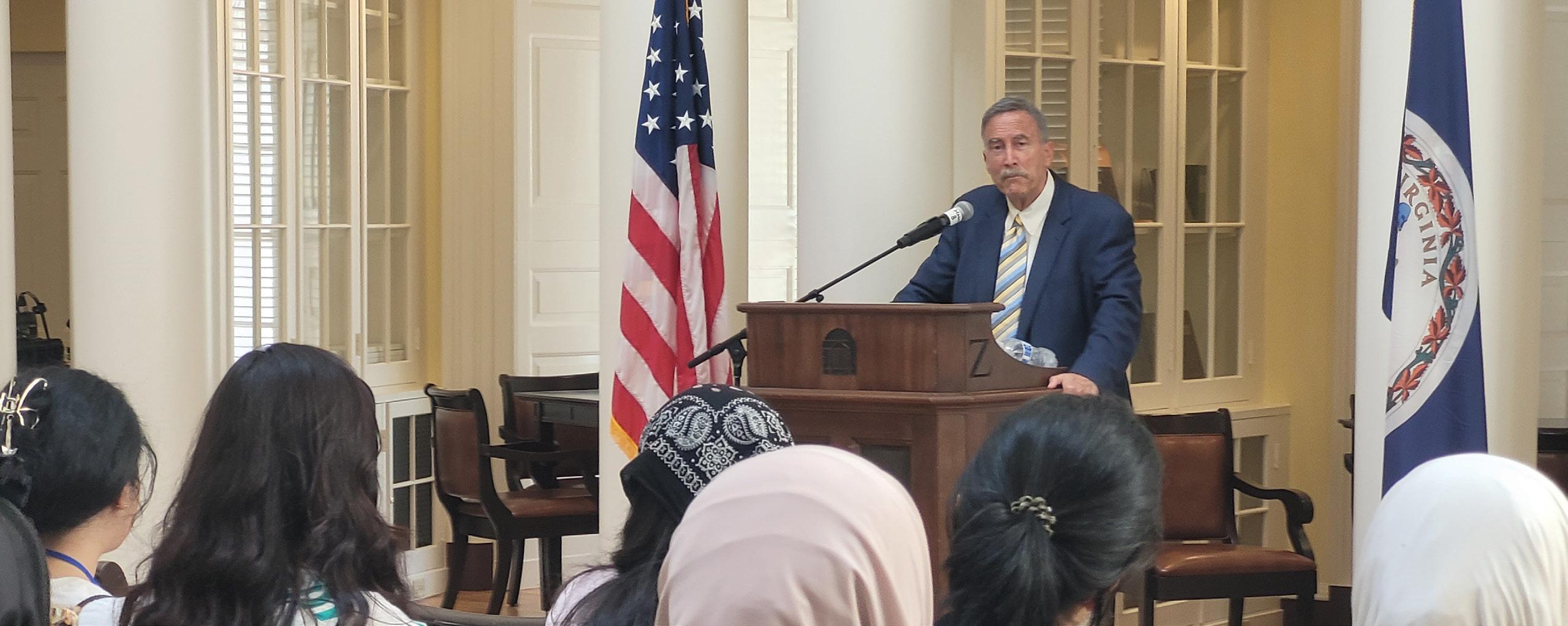
Since 2006, Global Perspectives on Democracy —part of UVA Center for Politics—has engaged thousands of people and fostered dialogue between the UVA community and nations around the globe.
GPD started in August 2006 with the International Youth Democracy Summit. This event, associated with the 400th anniversary of the founding of Jamestown, hosted 300 high school students from 42 states and 22 countries.
This summer, GPD hosted three exchanges: the Iraqi Young Leaders Exchange Program, High School Diplomats (Japan/U.S.), and the Youth Ambassadors Program with the Caribbean.
The IYLEP sponsored by the U.S. Department of State and in partnership with World Learning, brought 104 undergraduate students to Grounds from universities throughout Iraq. During a week in July, GPD engaged the students with leadership training, civic engagement sessions, and most importantly, activities focused on team building and civil discourse. The Iraqi students met each other for the first time when they arrived at
UVA. Because participants come from diverse cultures, regions, religions, and native languages, GPD sets a high priority on uniting the group as a team.
Engagement with American peers has proven key to the program’s success. In tandem, Center for Politics chooses eight UVA students to participate in its 22nd Century Scholars Summer Internship Program, and these students engage with the Iraqi students. They lodge and dine together, participate in academic sessions and site visits, and join in all team-building activities. Through these daily interactions, intellectual contributions, and resulting friendships, the 22nd Century Scholars provide the leavening of the experience. At the program’s conclusion, the Iraqis divide into four subgroups and depart for other universities in the U.S., where they remain for two weeks.
IYLEP 2024 was the fourth in-person Iraqi delegation hosted by GPD. Many of the Iraqis convey that they view their experience on Grounds as the high point of their time in the United States, and the relationships established between the Iraqis and 22nd Century Scholars are fundamental to this lasting bond.
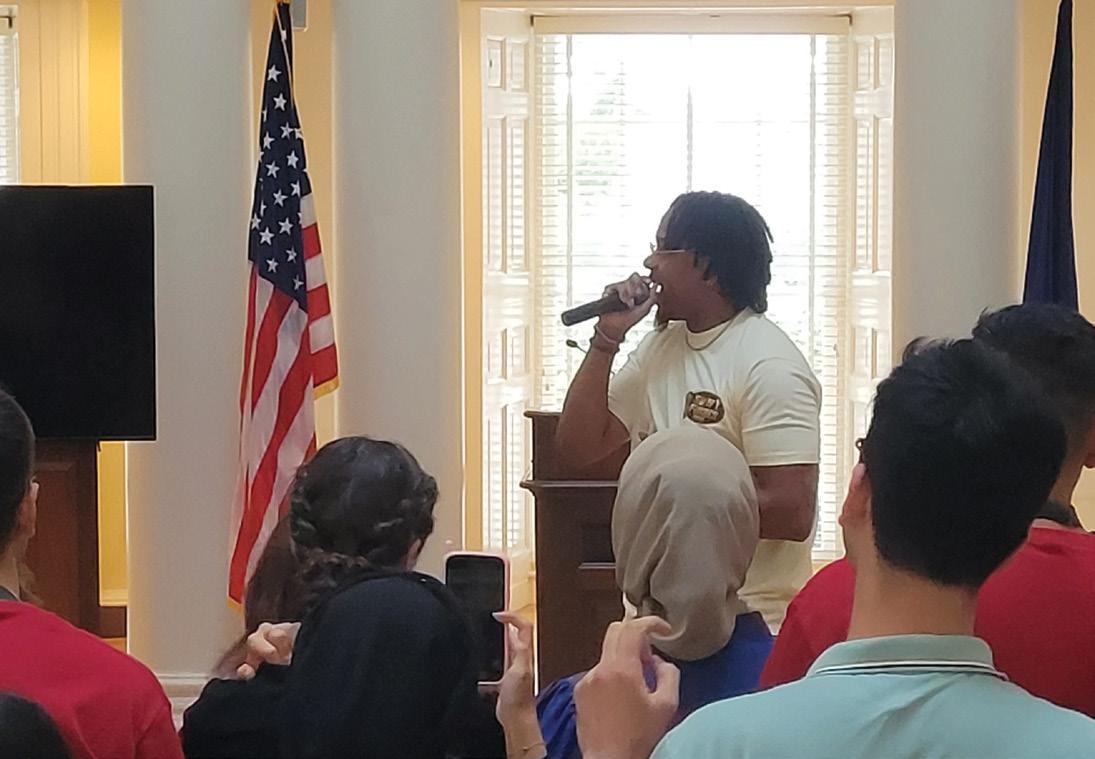


Engineering students developed topnotch intercultural skills during a J-term study abroad class in Dubai, sponsored by the Department of Systems and Information Engineering
Dubai is the most populous city in the United Arab Emirates, and students dove into the rich cultural mix, learning how to navigate the differences in business and engineering between the United Arab Emirates and the United States.
Students interacted with both local communities and corporate entities like Enercap, Interel, and Zbooni. Meeting with CEOs and industry leaders gave them a real look at how businesses operate, turning classroom theory into practical know-how.
The course emphasized adaptability and problem-solving in different professional and social settings. By working on real-world projects and teaming up across disciplines, students sharpened their ability to understand client needs, create custom solutions, and communicate results effectively.
The program’s success is evidenced by glowing reviews from clients, who raved about UVA students’ professionalism and creativity. Thanks to this immersive experience, students felt ready to thrive in today’s global professional world.
“In Dubai, our students consulted for technology companies,” said William S. Scherer, professor in the School of Engineering. “This was a dive into a fastpaced, innovative environment, offering a glimpse into how tech shapes business in one of the world’s most futuristic cities.”
Beyond the consulting work, students visited iconic spots like the Burj Khalifa (the world’s tallest structure) and experienced the unique blend of modernity and tradition that Dubai is known for. “The group enjoyed a dinner with His Highness Omran Sharaf, Deputy Minister of Foreign Affairs and UVA '05 engineering alumnus,” Scherer added. “It was a perfect mix of learning and adventure.”
Scherer is program director for the UVA-in-UAE class and serves as chair of the Department of Systems and Information Engineering, which also coordinates studyabroad classes in Argentina, South Africa, and Sweden.
“I was lucky to be part of UVA Systems Engineering’s first January term cohort in Dubai,” said Olivia Conner, who graduated with a Bachelor’s of Science in Systems and Information Engineering this year.
“Experiencing a new culture and exploring the city was amazing. Our team of six worked with Zbooni, a Dubai startup focused on personalized commerce. I learned so much from our project and was able to deliver a final presentation on credit card processing to the Zbooni team. It was an incredible chance to collaborate with local entrepreneurs and connect with the UVA-in-UAE alumni network.”
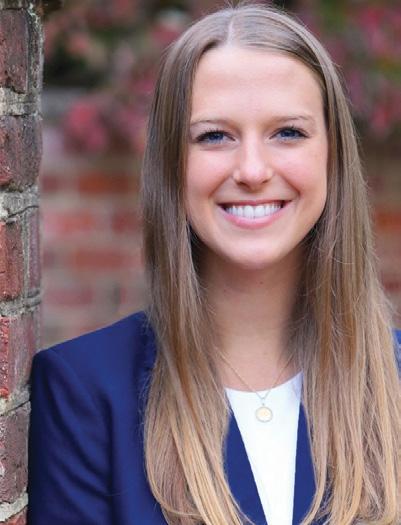
+ UVA Promotes Global Dialogue
+ New Directors Join UVA Global
+ Representing UVA at Key Events in China
+ Reviving Ping-Pong Diplomacy
+ Building Networks Across the Globe
+ UVA in Valencia — Celebrating 40 Years
+ Innovative Partnerships and Awards
+ Linguistics Connect High School Students to the World
+ New Programs and Collaborations for English as a Second Language
+ Growth in Global Studies
+ Global Studies: New Faculty

“I will never forget taking our students to attend a banquet at the Diaoyutai State Guest House in Beijing for the commemoration of the 45th anniversary of China-U.S. diplomatic relations. I’m proud of how the UVA students represented their university and their country.”
Justin O’Jack, director, UVA China Office
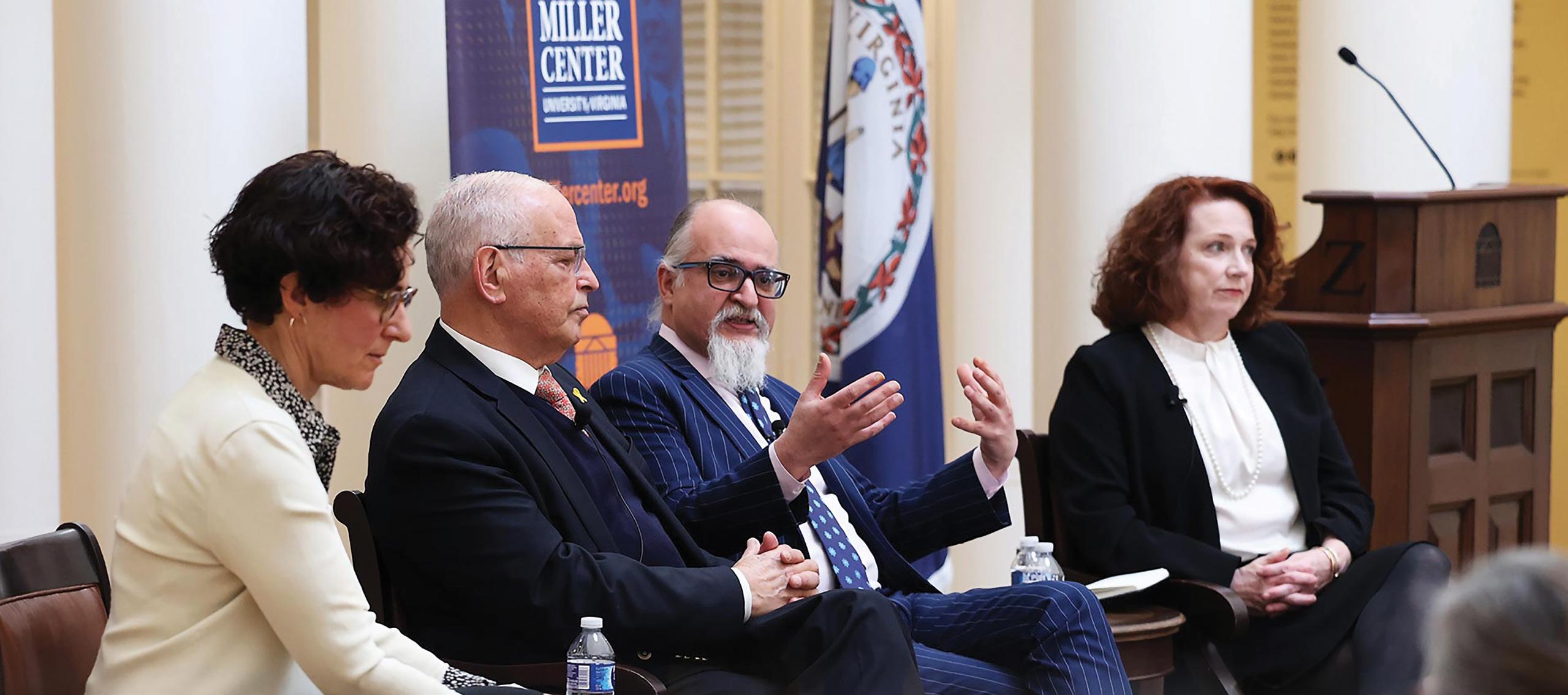
THROUGHOUT THE 2023-2024 ACADEMIC YEAR, UVA hosted a variety of events and programs aimed at enhancing global understanding and cross-cultural dialogue. Each of these initiatives underscored UVA’s commitment to international engagement and education.
A significant focus this year was the conflict in the Middle East. Beginning in Fall 2023, UVA has hosted multiple programs to discuss the issue, provide insights, and encourage conversation, including an event featuring Dartmouth professors Tarek El-Ariss and Susannah Heschel leading a dialogue on Israel-Palestine, emphasizing the need for open, difficult conversations.
In other programming, a panel of Pulitzer Prize-winning photojournalists shared their experiences covering conflict zones, exploring the emotional toll and ethical challenges they face. The “Israel-Palestine Film Series” also showcased films aimed at discussing the Gaza conflict.
“The Israel-Hamas Conflict: Ways Forward,” was a major UVA program held during the spring semester by Global Affairs in partnership with Miller Center.
The discussion, moderated by Mara Rudman, a former U.S. deputy national security adviser and professor at Miller Center, brought together distinguished peace negotiators:
+ GHAITH AL-OMARI, former adviser to the Palestinian negotiating team
+ NIMROD NOVIK, former senior adviser to Shimon Peres
+ SUZANNE MALONEY, vice president and foreign policy program director at the Brookings Institution
The conversation explored constructive paths forward amid the ongoing conflict. In a robust discussion, the three experts agreed that a commitment to separate states is the best approach to stop recurring violence in the region.

DAVID MILIBAND, president of the International Rescue Committee, visited UVA in Fall 2023, delivering a powerful talk titled “How to Stay Optimistic in an Age of Crisis.” Addressing global challenges such as civil conflicts, displacement, food insecurity, and climate change, Miliband emphasized a solutionsdriven approach and highlighted the resilience found in humanitarian efforts.
at UVA successfully hosted its annual series of brown bag lunches, which brought together faculty and graduate students to discuss global research projects funded by CGII. Among this year’s presenters were Phoebe Crisman, David Edmunds, Howard Epstein, and Lora Henderson Smith, who presented their collaborative project “Indigenous Communities and Tallgrass Prairie Resilience in the Face of Changing Climate: A Science, Education, and Co-Design Research Collaboration.”
This interdisciplinary project of UVA faculty and students from architecture, environmental sciences, global studies, and education examines coupled human–environment systems of tallgrass prairies, Indigenous peoples, and their ways of living and learning, building on a longstanding relationship between UVA and Sisseton Wahpeton Oyate NGO partners Nis’to and Makoce Ikikcupi on the Lake Traverse Reservation in South Dakota.
GLOBAL WEEK was a big success, featuring over 30 events celebrating international art, politics, and culture. Student groups played a crucial role, including the session “Sharing French Madeleines” with the Francophone Club and a screening of “Bending the Arc” by Center for Global Health Equity. The VISAS program hosted a special Global Café, promoting ESL practice through cultural exchange, and the Passport Drive enabled many students to obtain their first passports.
Highlights of Global Week also included a global film collaboration with the Virginia Film Festival and a conversation with Jacques Pitteloud, ambassador of Switzerland to the U.S. Tent activities, featuring raffles and visits from Cavman, underscored the vibrant global community at UVA.
Through these diverse programs, UVA reaffirmed its commitment to promoting global understanding. By engaging students and faculty in meaningful discussions and celebrating diverse cultures and perspectives, UVA continues to play a crucial role in promoting international awareness and collaboration.
In the last year, UVA Global welcomed two senior leaders to its core team: Tina Mangieri, as inaugural director of global initiatives, a post she assumed in March; and Scott Heysell, as director of Center for Global Health Equity, at the start of the academic year.
UVA Global caught up with them on their priorities in the new positions.
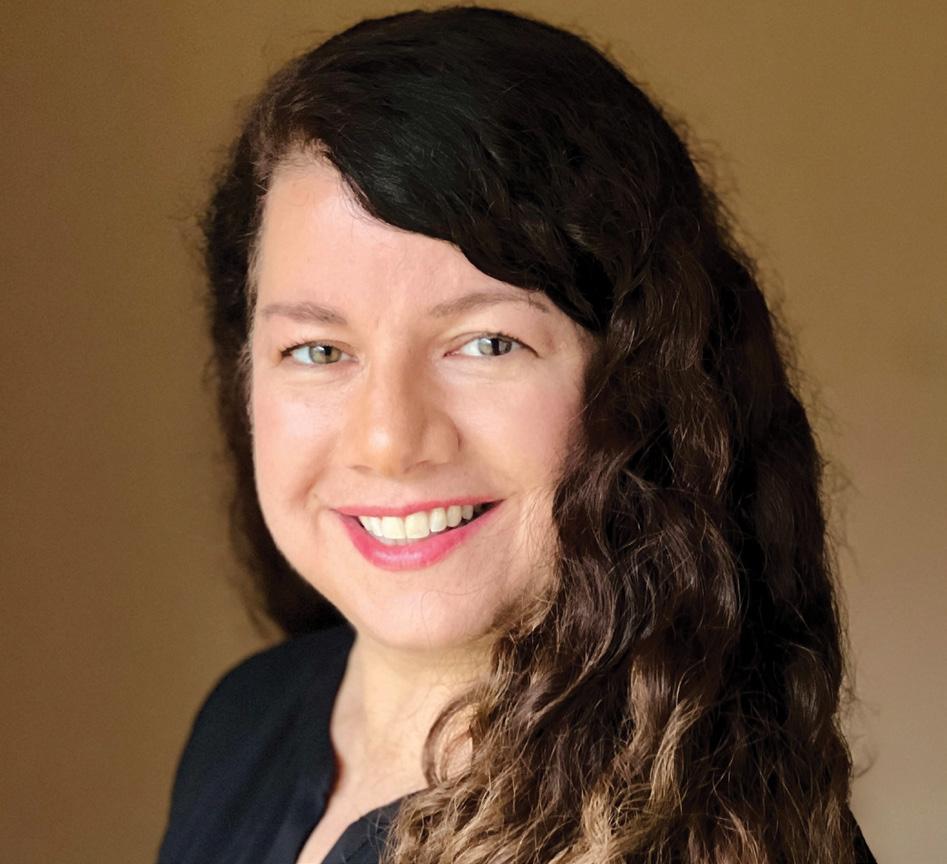
TINA MANGIERI joined UVA Global from Sweden, where she served as the first associate academic director and director of research at DIS Study Abroad in Scandinavia, a Copenhagen and Stockholm-based nonprofit leader in international education. Previously, she served in faculty and leadership roles at Bates College, New York University Abu Dhabi, SIT Study Abroad, and Texas A&M University. In each position, she has focused on developing partnerships, expanding networks, nurturing collaborations, and establishing new locations to serve as key sites for global scholarship.
MANGIERI: My initial focus is three-fold. I am working with stakeholders across UVA—and with potential partners globally—to develop and launch new UVA overseas offices. These offices will provide a platform for further expanding faculty research collaborations and bringing scholars together for regional meetings and exchange; supporting students with study, internship, research, and other applied learning opportunities; working to recruit top students at key sites by raising awareness of UVA around the globe; and supporting UVA alumni with programming, gatherings, and targeted career support. We plan to make these offices responsive to local needs and priorities and leverage UVA resources in ways that are ethical, meaningful, and valued by our partners. This is an exciting development at UVA and builds on the successes of our China office, in Shanghai.
I will also be working on Grounds to launch a new initiative—Global Classroom—to support faculty proposals to further internationalize the UVA curriculum. Funded activities may include guest speakers, local projects that enrich the global focus of a course, course-integrated travel that adds a global dimension, and materials or events that deepen global engagement on Grounds. As part of Global Classroom, we will work with faculty interested in combining in-person initiatives with virtual exchanges and collaborative online international learning, as we aim to provide every UVA student with an international experience opportunity. I expect the applications to be fabulously creative and enriching.
My third area of focus is establishing a pathway for scholars, advocates, and practitioners at risk— providing a temporary refuge for threatened scholars and their immediate families whose lives and careers are disrupted in their home countries. Hosted scholars teach, conduct research, advise students, and otherwise engage with the vibrant academic life of UVA. This program allows their important work to continue and benefits UVA by providing access to remarkable, dedicated, and courageous individuals who, through their on-Grounds engagements, bring invaluable perspectives to our University community.

SCOTT HEYSELL, Thomas H. Hunter Associate Professor of International Medicine, is a UVA Health physician-scientist who studies infectious diseases and their impacts on international health. Much of his practice has involved caring for patients with the human immunodeficiency virus, or HIV, and tuberculosis.
What are the key priorities you will focus on in the coming year?
HEYSELL: Center for Global Health Equity will continue reducing health disparities in communities around the world where partnerships can be sustained and that are aligned with UVA’s broader plan for global engagement.
CGHE has a rich history spanning more than 40 years of service to the University. The core work has facilitated immersive student and faculty interface with global partners—all of whom are working on some of the world’s most pressing health issues, from climate change to poverty. The driving ethos has been a work of parity, respect, and reciprocity. Thus, key priorities for CGHE will be to build upon that foundational work by developing sites for faculty-led projects around the world.
We also aim to expose more students to a global experience. One way is to develop programs that creatively allow students to work with partners outside the University without necessarily requiring significant travel. Programs of virtual/online engagement have proven successful for both UVA students and our global partners during the COVID-19 pandemic. One example is the eGlobal program, where students across Grounds work in small research groups throughout the academic year—modeled first with partners in Rwanda and recently expanded to Tanzania.
We will prioritize efforts that increase global engagement for students with backgrounds who are historically underrepresented in the health sciences, those who may not have previously traveled internationally, and those for whom a career that includes global health has not been considered.
These exciting new appointments propel Global Affairs forward to provide a platform for expanding research partnerships, teaching, and learning in key areas around the world.

In 2013, UVA initiated plans for its first overseas office, in Shanghai, to help advance the University’s presence in China and across Asia. Justin O’Jack has led the office from the start, bringing valuable experience in international educational programs.
Establishing an office in 2015 was a powerful opportunity, O’Jack said, “to support ongoing activities, strengthen existing relationships, forge new ones, and facilitate new forms of collaboration between schools and departments.”
As director of the UVA China Office, O’Jack served as emcee of the 2024 Chinese New Year reception for representatives of the foreign diplomatic corps in Shanghai. He represented UVA at the 10th anniversary of Shanghai Qibao Dwight High School, the first Sino-U.S. cooperative school approved by the Minister of Education in China, and one of UVA’s top sending schools in the country. Recently, O’Jack was named an international experience ambassador by the Shanghai Municipal Government and profiled in the documentary film series Living History: Stories from the Opening of China, a project funded by the U.S. Department of State.
Among many events for the UVA China Office this year, O’Jack participated in the World University Presidents Forum in Beijing, hosted by the China Association of Higher Education, Peking University, and Tsinghua University.
Also speaking to participants of the Forum, by video recording, was UVA vice provost for Global Affairs, Stephen Mull. “While there are significant challenges in the U.S.-China relationship,” Mull said in his address, “the world expects us to manage them through reasonable and peaceful engagement. That is a process that we as educators are uniquely able to lead through our efforts to improve mutual understanding between our two great nations.”
Among the highlights of the UVA China Office this academic year was the J-term course Game Change: Bridging the U.S.-China Divide through Sport (see pp. 36-37). As part of the course, Mull and O’Jack led a dozen UVA student table tennis players to Hong Kong, Beijing, and Shanghai for academic lectures, panel discussions with Chinese professors and peers, meetings with U.S. and Chinese government officials, and friendly exhibition matches with partner universities in Beijing and Shanghai.
“I will never forget taking our students to attend a banquet at the Diaoyutai State Guest House in Beijing for the commemoration of the 45th anniversary of China-U.S. diplomatic relations,” O’Jack said. “The event was hosted by China’s minister of foreign affairs, Wang Yi, and featured the chargé d’affaires of the U.S. Embassy in China. I’m proud of how the UVA students represented their university and their country.”
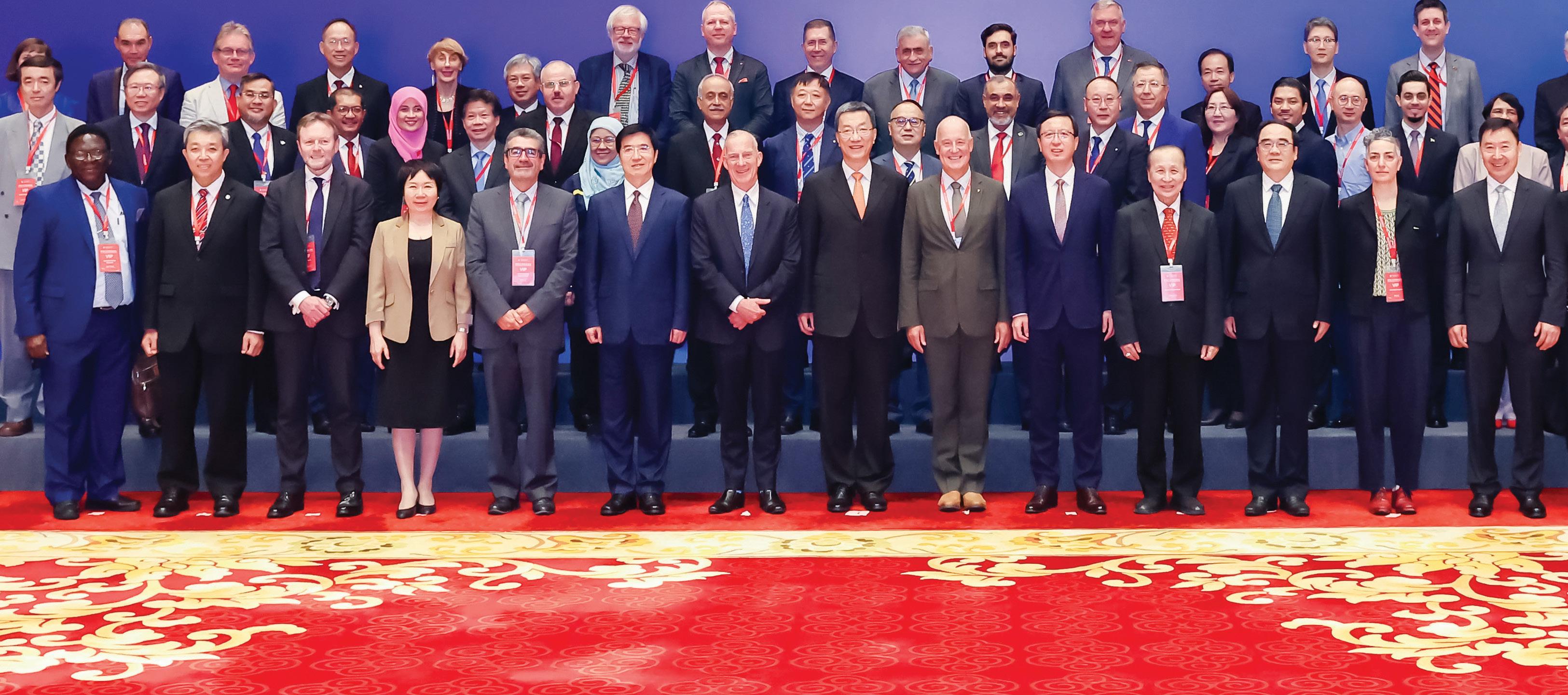
In addition to J-term success, the UVA China Office supported 14 undergraduate and graduate admission events in Beijing, Hong Kong, Shanghai, and Shenzhen, as well as in Bangkok and Singapore. These events included EducationUSA admission fairs, online webinars, and in-person coffee chats for College and Graduate School of Arts & Sciences, Darden School of Business, and School of Data Science.
The UVA China Office also supported 18 spring and summer career services events hosted online and in cities across China, together with 26 engagement events for hundreds of alumni and parents in cities across China, as well as in Singapore and Tokyo.

DURING THE 2023-2024 ACADEMIC YEAR, the UVA China Office published over 150 articles to 18,500 followers on the University’s WeChat and Weibo social media accounts. These posts generated more than 5,900 interactions and 3.7 million page views. The most viewed article was the Weibo post, “UVA Students Creating Their Own Ping-Pong Diplomacy in January,” which received 1.16 million page views, in addition to 194,000 views for the related video, demonstrating the outsized reach of UVA and the course itself.
The J-term course Game Change produced more than 450 press clippings from media in China and abroad, a quarter of which alone generated over 23,600 interactions and more than 7.2 million page views. On January 7, a Chinese hashtag related to the UVA student table tennis delegation in China was the No. 1 trending topic on Weibo, with 1.7 million views. According to media monitoring service Cision, 193 articles about the UVA delegation were published by news media in China with a combined desktop and mobile readership over 1.1 billion, earning a total ad equivalency worth more than $2.08 million USD.
As UVA’s inaugural overseas office, the UVA China Office, through O’Jack’s efforts, continues to demonstrate the importance of academic institutions in facilitating engagement between nations, while also fulfilling UVA’s role as a globally engaged university.
This past January, a group of 12 students revived the spirit of 1971 “ping-pong diplomacy” during a J-term course, Game Change: Bridging the U.S.-China Divide Through Sport.
Inspired by the historic U.S. table tennis team’s visit to China, the course highlighted how sports can serve as a bridge for cultural and political exchange. Students retraced the team’s steps, gaining a deeper understanding of global diplomacy and the enduring impact of these historical events.
The original encounter occurred when U.S. player Glenn Cowan accidentally boarded the Chinese national team’s bus during the 1971 world championships in Japan. This chance meeting between Cowan and Chinese champion Zhuang Zedong led to an unprecedented thaw in U.S.China relations, culminating in President Richard Nixon’s groundbreaking visit to China.
Jie Lu, a fourth-year student in the McIntire School of Commerce and president of the table tennis club at UVA, was among the students on this trip. Born in China and raised in the United States, Lu has been playing table tennis, China’s national sport, since she was 8. Even though Lu was born more than three decades after the international event, her family’s involvement in the
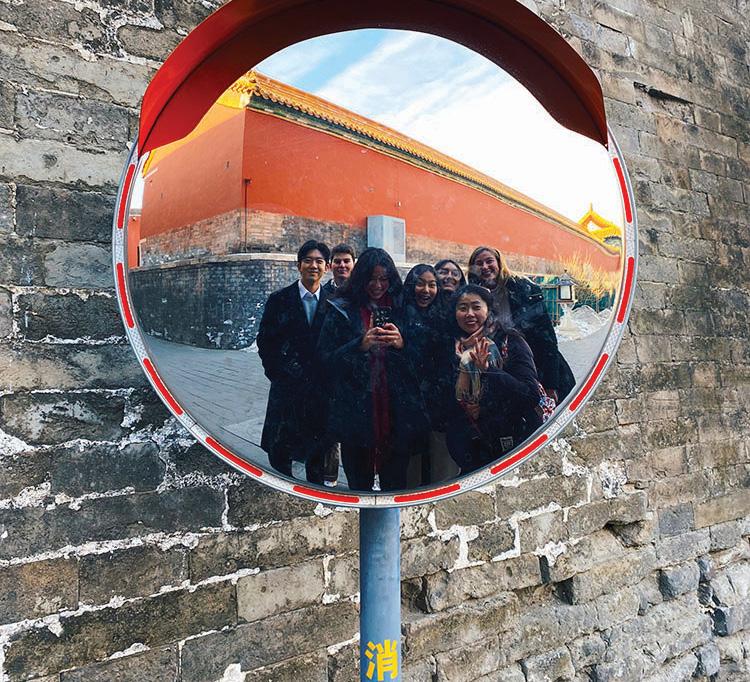
sport meant she knew all about that fateful bus mix-up.
The J-term trip started in Hong Kong and ended in Shanghai. As the students traversed China, they engaged in friendly table tennis matches with local university students and participated in lectures and cultural visits. This hands-on experience was designed to foster a deeper understanding of the current issues between the two countries.
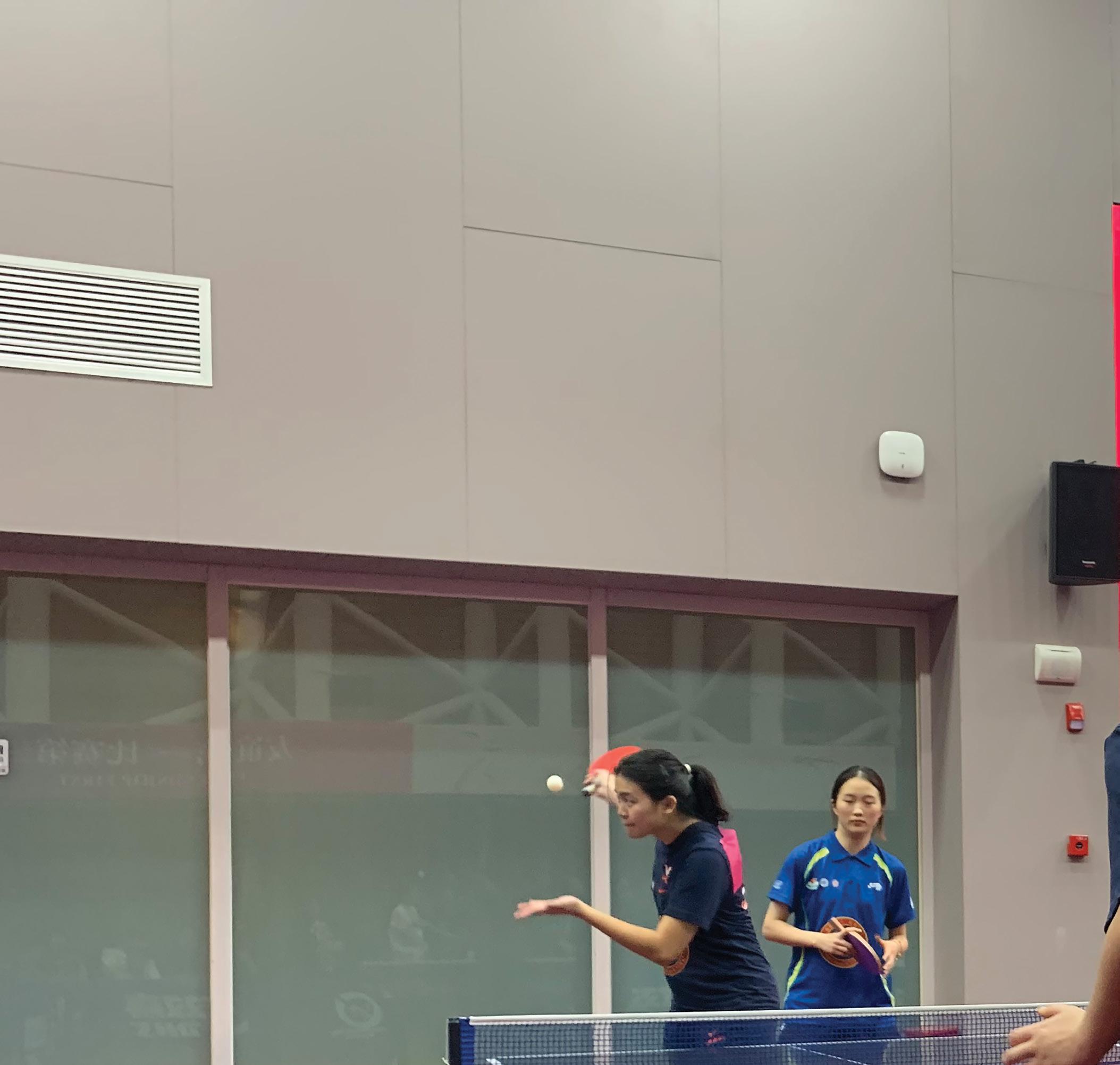
Reflecting on his experiences, Abdallah Aljerjawi, a thirdyear nursing student, shared how the trip changed his perspective: “The realization that truly understanding every nook of Chinese culture might take a lifetime didn’t deter me. It encouraged me to put myself out there, have conversations with locals, and even learn a few Chinese words to communicate.”
Aljerjawi emphasized the richness of Chinese culture and the unforgettable memories he made, from recreating the 1971 visit’s iconic photo at the Great Wall to sharing connections with Chinese students through the universal language of ping-pong.
More than an academic exercise, the students’ journey illustrated how sports can bridge gaps where traditional diplomacy might falter.

Misa Layne, another participant, was born in Beijing but raised in the United States, and she appreciated the deep cultural reconnection and breaking of stereotypes. “International diplomacy is about building one relationship at a time,” she said. “There is no other way to replicate the deep satisfaction in building a bridge to another country and culture without visiting for oneself, and in China, maybe even engaging in a friendly game of ping-pong.”
By retracing this historic route, these UVA students not only learned about a significant diplomatic breakthrough but also contributed to revitalizing historical diplomacy with China. As Lu emphasized, “We are not just representing UVA but also representing America. It is a wonderful opportunity and we’re making history.”
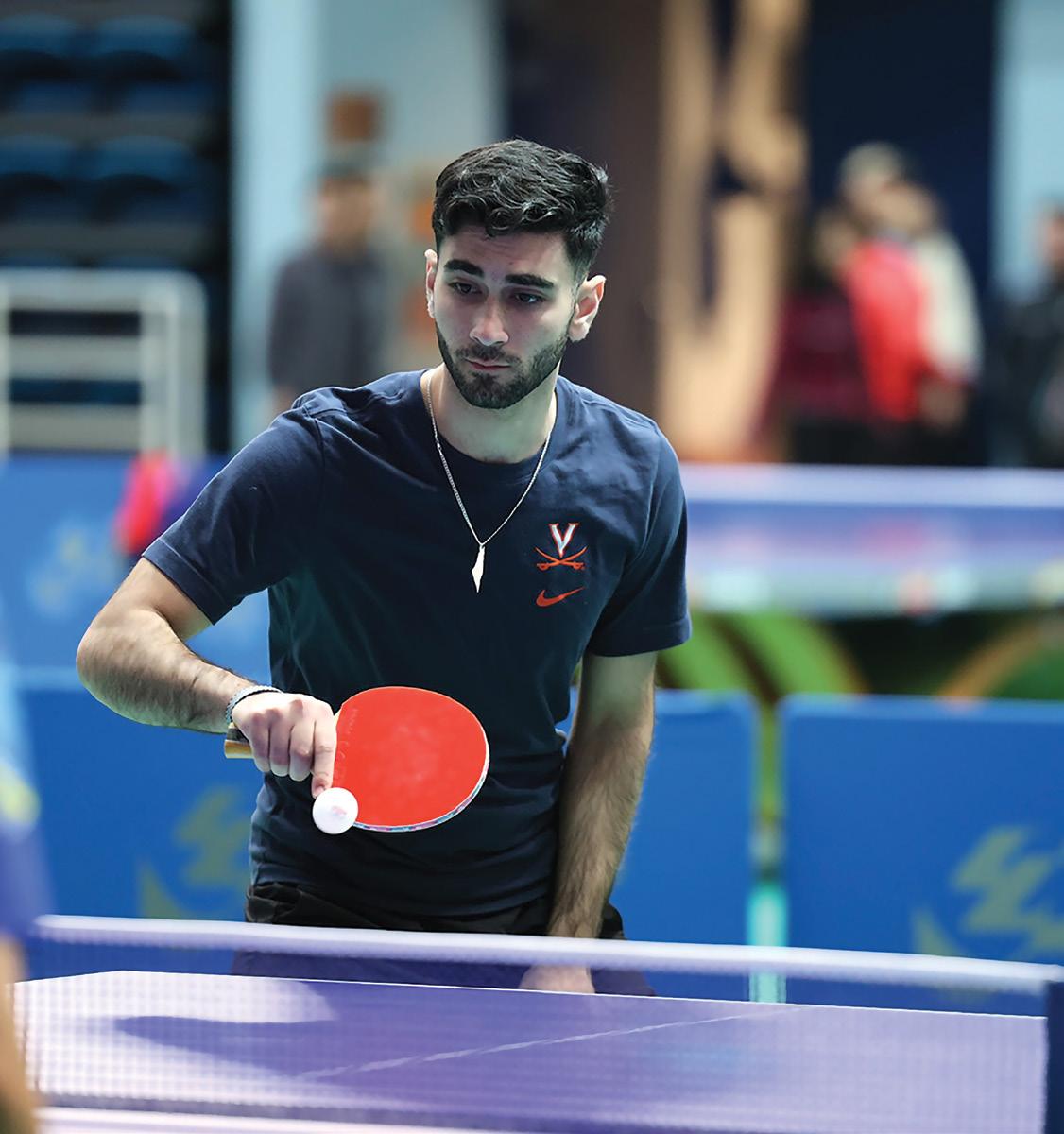
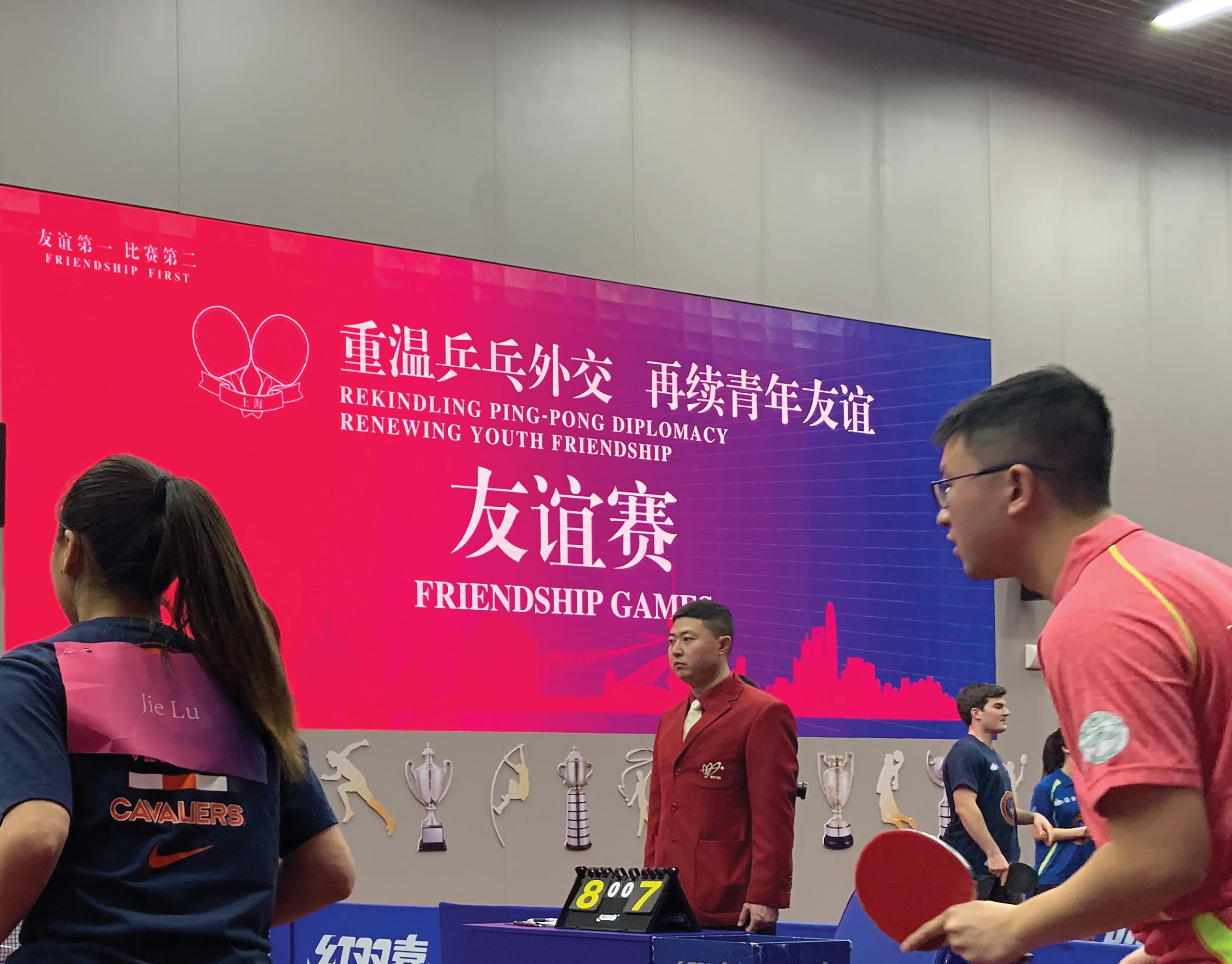
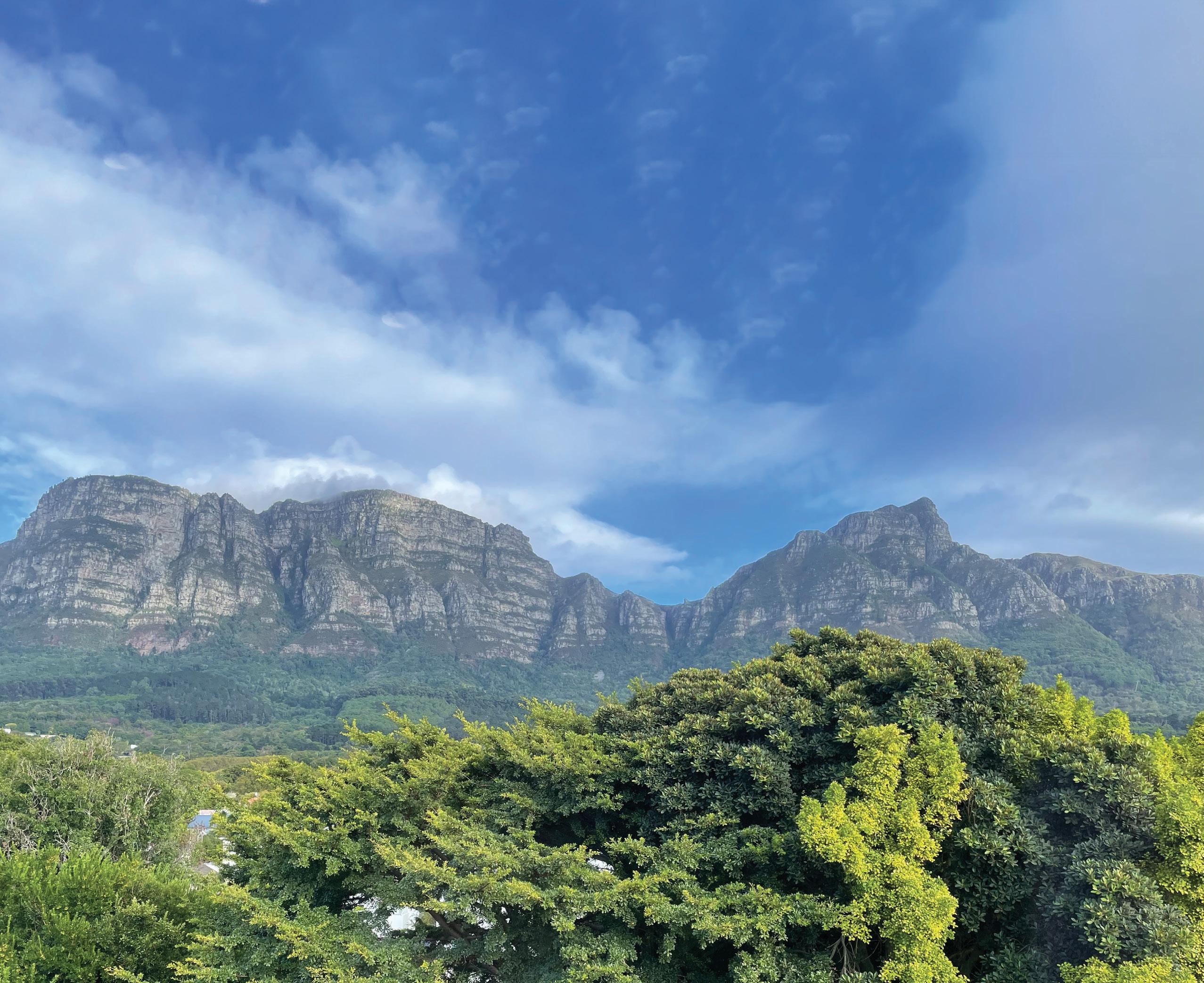
UVA is actively exploring several sites for new partnerships, including overseas offices in Africa, South Asia, and other key global regions, to:
+ expand study, research, internship, and active learning sites and opportunities for students
+ support faculty research and broaden collaborative networks across the globe
+ convene international events, networking, and career services for alumni
+ continue to recruit the best and brightest students from locations worldwide
UVA’s long-standing office in China, opened in 2015, serves as a model for sustained engagement with local communities, alumni, students, and faculty, and is poised to become part of a broader UVA overseas network. In addition to select office sites, UVA continues to build collaborations and partnerships across the globe to support students in developing the knowledge, perspectives, experience, and skills necessary to lead in a globally connected world.

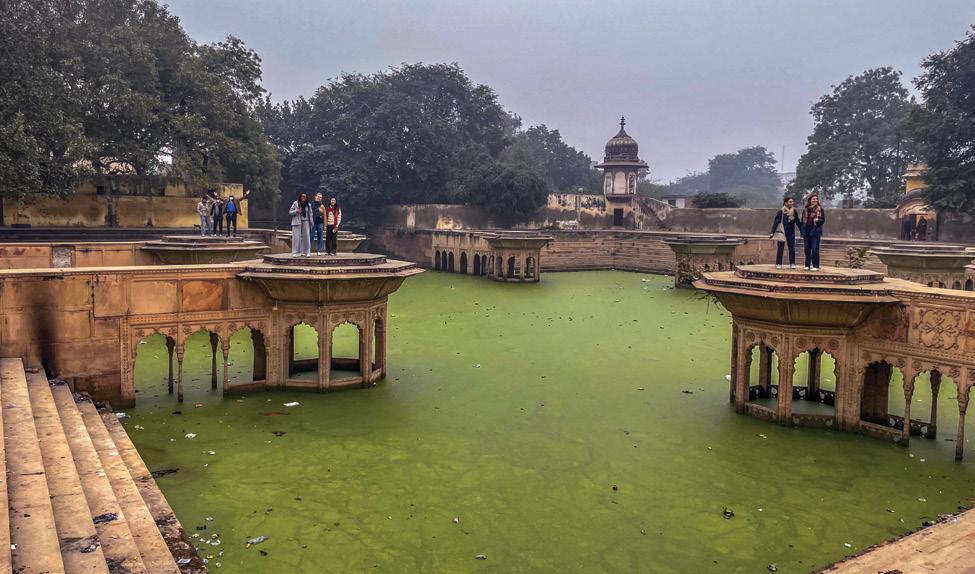
Following last year’s delegation visits, led by Ambassador Stephen D. Mull, vice provost for Global Affairs, UVA continues work toward intensifying engagements and establishing an office in India—the world’s most populous democracy and an essential site for global engagement.
Tina Mangieri, director of global initiatives, is building on the momentum of these earlier visits, working with faculty, student, and alumni stakeholders to determine the outlines of an office.
“UVA faculty and students are engaged in remarkable work across India,” she said, “from health research in Tamil Nadu and clinical training opportunities in Kerala, to an impressive range of business, architecture, humanities, social science, and engineering-focused work in Delhi, Mumbai, Kashmir, and beyond. The UVA office will support these ongoing projects, partner with alumni—including offering networking events and career support—enhance our admissions and recruiting efforts, and work to create even more opportunities for UVA students in India and the region.”
One example is the new UVA in India J-term course, Urban Transformations: Exploring Sustainability Past + Present, created and taught by Phoebe Crisman and launched this past January (see pg. 64).
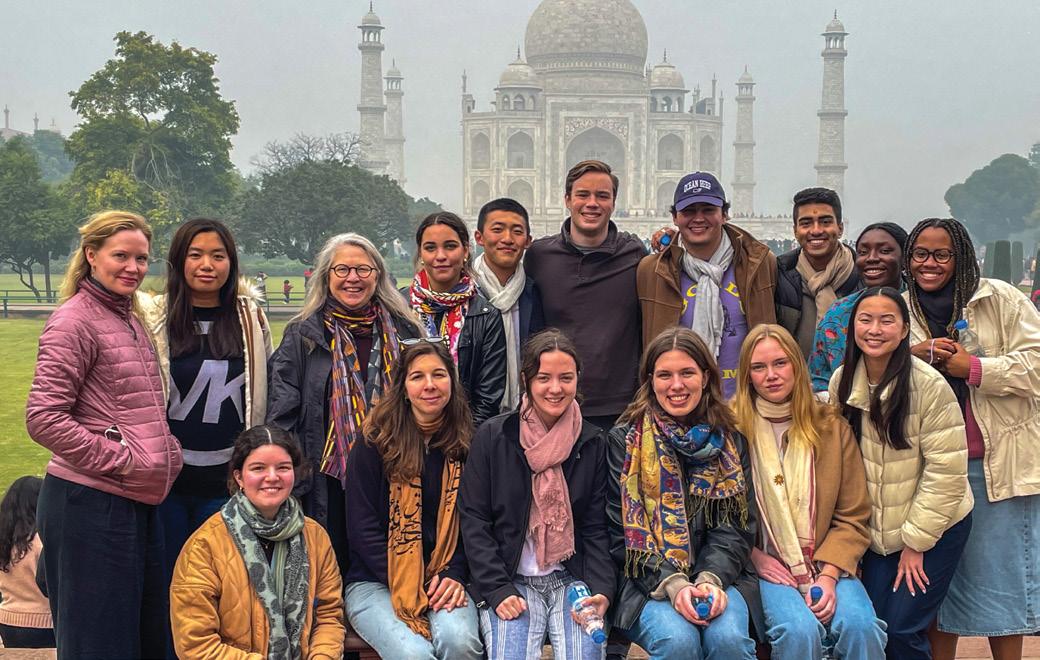

The course focused on cities, architecture, landscape, and culture through a sustainability lens. Students examined how environmental, aesthetic, and socioeconomic forces shape the built environments in and around Delhi. They also addressed the sustainability challenges that all global cities face: climate change, the need for shelter, water, food, energy, transport, waste management, ecological and heritage conservation, and environmental justice. All while imagining and designing for a more sustainable future.
“Students experienced a rich range of places and people during our intensive 12-day exploration in Delhi and beyond,” Crisman said. Participants gained significant intercultural experiences, too, by interacting with local architects, planners, and other UVA alumni, as well as faculty and students from O.P. Jindal Global University.
“Through this course’s interdisciplinary approach,” one student noted, “I had the opportunity to learn from my peers and from my surroundings. I also got to spend more time in India, speaking Hindi, and meeting others interested in the sustainability space. I got to see what ‘sustainability’ means and its many expressions and challenges in the Asian middle-income country context.”
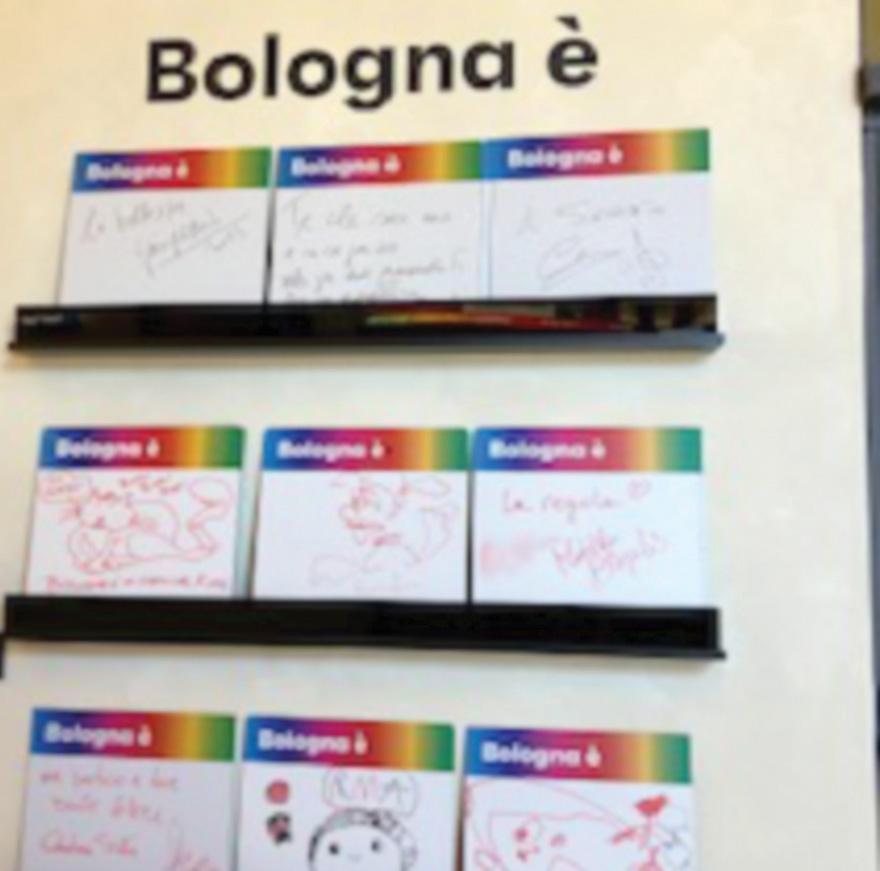
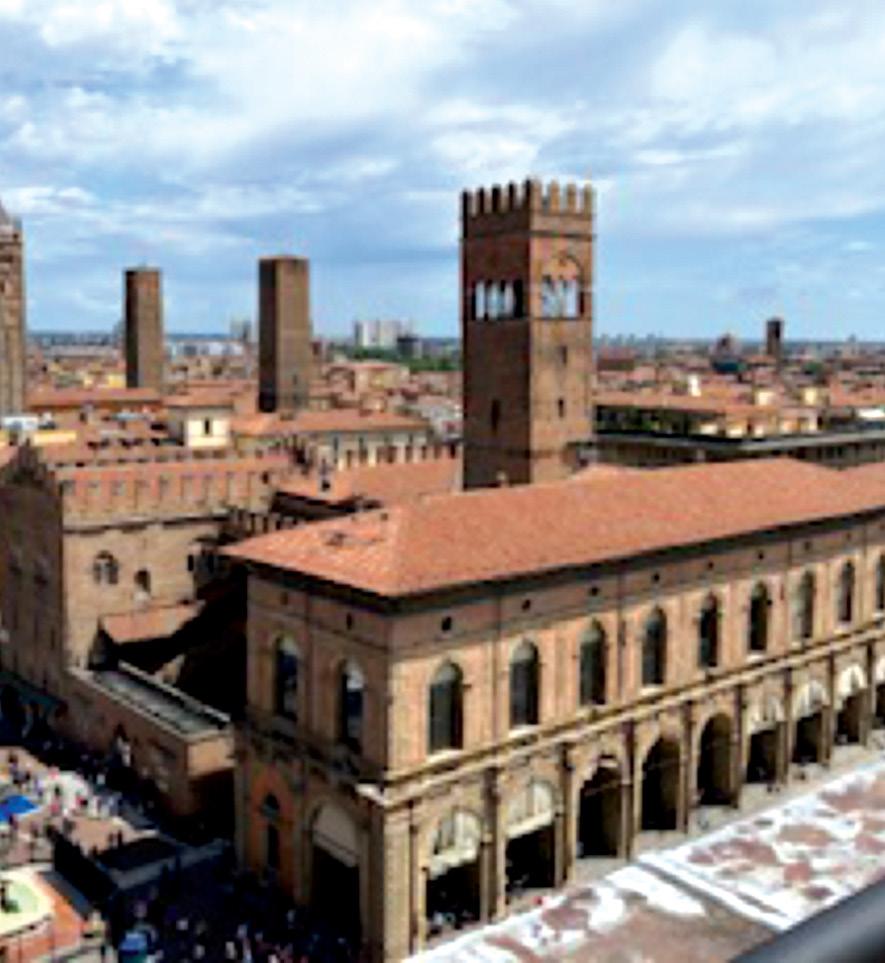

Bologna’s mayor and local university leadership invited an interdisciplinary delegation from UVA for exploratory discussions on the prospect of a formal partnership in pursuit of new research horizons.
The delegation included UVA leaders from Karsh Institute of Democracy, the schools of Architecture and Data Science, Equity Center, and the Provost’s office. They spent an enriching few days in May getting acquainted with the city’s Leonardo supercomputer (one of Europe’s most powerful), its boldly ambitious plan to create a “Digital Twin” to revolutionize its municipal governance, and its vision to transform an increasingly obsolescent industrial sector into a new knowledge-based economy that aims to achieve full carbon neutrality by 2030.
During the visit, there was excitement around the convergence between UVA’s and Bologna’s academic and civic leaders’ research interests and values. UVA’s Research Grand Challenge on Digital Technology and Society is preparing to address many of the questions now under active study in Bologna. The emphasis is on how best to draw on the increasingly vast amounts of data at our fingertips to improve quality of life, while
avoiding the risks to human values that too often accompany rapid technological advance.
Bologna’s commitment to ensuring the public’s open access to, and benefits from, the Leonardo supercomputer parallels UVA’s expansion of data science for the public good as Virginia’s flagship public university.
“With so much in common,” Mull said, “the visit made clear that UVA and Bologna would gain much from collaboration on our mutual priorities, and Bologna’s visionary mayor, Matteo Lepore, invited us to develop a special partnership with the city. In the months ahead, we look forward to developing an ambitious work plan to advance our research enterprise’s priorities with such promising international partners.”


In March, Ambassador Mull led a panUniversity delegation to explore new engagement opportunities in South Africa.
The visit included members from the College and Graduate School of Arts & Sciences, the School of Engineering and Applied Science, Center for Global Health Equity, School of Medicine, Global Affairs, and International Studies Office. They visited three leading universities in the Western Cape to explore mutual research priorities in public health, data science, environmental sustainability, engineering, and social justice.
“Despite the substantial distance between Charlottesville and Cape Town and our extraordinarily different histories,” Mull said, “our delegation found a remarkable convergence of academic interests and values, and an easy cultural affinity, with our South African counterparts.”
In Cape Town, the delegation met with leadership and faculty across multiple schools at the University of the Western Cape and viewed potential office space at Greatmore—UWC’s renowned Centre for Humanities Research. Tina Mangieri, director of global initiatives, was inspired by the many possibilities that emerged from the visit. “UWC holds a unique and storied position in the complicated history of South Africa,” she said, “and continues to play a vital role in contemporary inquiry and debate, making it an ideal partner for UVA in Southern Africa.”
These early conversations are already fruitful, prompting an astronomical collaboration between UVA and UWC, together with the local public, who convened in August in the Western Cape to observe a rare occultation of Pluto.
Thanks to the enormous generosity of Mark Jaros (Parent '12, '16 and member of the Global Affairs Corps of Ambassadors), UVA will be sending even more students in the coming years, supported by his newly established education abroad scholarship. The scholarship will provide need-based support for 20+ students annually to study, research, or intern in South Africa.
Other nearby universities are also active sites of ongoing research and partnerships with UVA: University of Cape Town, which hosts numerous UVA students and faculty collaborations; and Stellenbosch University, site of an upcoming 2025 J-term in systems engineering. “The UVA office in South Africa will work broadly with multiple institutions in the Western Cape, universities elsewhere in South Africa including University of Venda—long home to remarkable work with engineering at UVA—and University of the Free State,” according to Mangieri, “as well as partners throughout the continent.”
Expanding UVA’s international reach in these and other locations recognizes learning as an opportunity for discovery, facilitating pathways for students and faculty to become international leaders in distinct and critical research areas.
UVA looks to the year ahead to deepen these important relationships, building on the progress made at each site, in ways that support, enhance, and enable the committed collaborations needed to address contemporary global challenges.





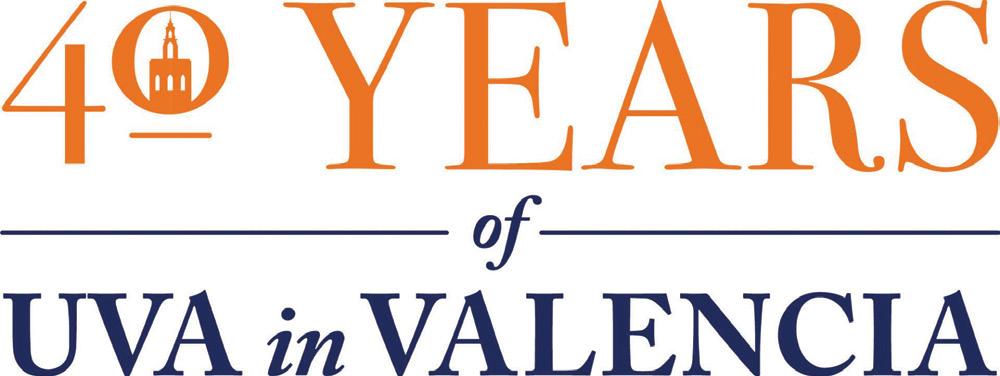

UVA in Valencia, the University’s flagship education abroad program, marked its 40th anniversary with a three-day celebration onsite in Spain, attended by nearly 200 guests, including alumni, parents, students, supporters, and UVA faculty and officials.
Guests for the September event included current students studying in Valencia and UVA Provost Ian Baucom; Ambassador Stephen D. Mull, vice provost for Global Affairs; Christa Acampora, dean of the College and Graduate School of Arts & Sciences; Nicole Thorne Jenkins, dean of the McIntire School of Commerce; Jennifer West, dean of the School of Engineering and Applied Science; and alumni, parents, and friends who traveled from around the world.
Since its founding in 1983, the program has served more than 10,000 students, primarily from UVA.
“Spending time immersed in another culture enables students to broaden their perspective, develop new skills, and become more empathetic,” Baucom said. “For 40 years, the University’s program in Valencia has served as a model for other international study programs.”
During the celebrations, participants toured program facilities, took a 10-mile bicycle ride led by founding director Fernando Operé through the Turia Riverbed gardens, and enjoyed a paella lunch in the countryside outside Valencia.
The closing dinner was held at Hemisfèric, within Valencia’s modern City of Arts and Sciences. The highlight for many guests was connecting with the 54 current students who arrived in Valencia a few weeks earlier for the start of their fall semester.
Mull said the city’s youthful vibrancy, the program’s extraordinary faculty, and the host families’ hospitality all combine to create experiences that transform student lives. “The impact of the program is immeasurable,” he said. “We look forward to expanding the program even further in coming years so more of our students can benefit from its remarkable advantages.”
UVA in Valencia is the vision of Operé, a professor in the Department of Spanish, Italian & Portuguese. He designed the academic program, recruited students, established contacts with other institutions, and created an infrastructure that could take care of the students when they arrived.
The program quickly matured. In 2003, with support from UVA’s International Studies Office, the University decided to create an independent program. With faculty at UVA exercising oversight of curriculum and instruction, the program received approval to award UVA academic credit.
“That was a pivotal moment,” Operé said. “We were able to hire full-time teachers and expand our class offerings.”
The program offers academic credit for students with interests in engineering, athletics, business and health sciences, in addition to the curriculum in Spanish language and Hispanic studies.
In Fall 1995, Rudene Mercer Haynes arrived in Valencia for a semester-long program that included a stay with a host family, a core component of the program that allowed her to practice her Spanish every day. Haynes joked that in Valencia she could “dream in Spanish” and credited it to the immersive experience.
“It was a level of exposure that I could not have imagined when I applied for the program,” said Haynes, now a Richmond attorney with Hunton Andrews Kurth.
Megan Ayers, a second-year student in the College of Arts & Sciences, attended the summer session at Valencia this year. A QuestBridge Scholar at UVA, Ayers received the Sue & Lee Piepho International Scholarship to attend. She, too, loved the program’s immersive nature. “You become accustomed to a way of life that you never would have known if you had stayed in your shell,” she said.
Center for Global Health Equity accelerated into a year of revitalized opportunity under the leadership of a new director, Scott K. Heysell, MD, MPH, Thomas H. Hunter Associate Professor of International Medicine.
“We aim to position CGHE as the resource for students, faculty, and global partners seeking to connect in health,” Heysell said. “I could not be more excited to lead the next stage of the center’s work, extending reach to new locations in West Africa and the Indian subcontinent, among others, and tackling interconnected topics such as climate change and human displacement and migration.”
Through its partnerships, programming, and awards, CGHE supports UVA faculty and students at the undergraduate, graduate, and post-doctoral levels.

In this academic year, CGHE-supported students and faculty mentors developed new programs in:
+ GHANA —at the Family Health University College and the University of Ghana’s Korle-Bu Teaching Hospital in Accra
+ TANZANIA —at the Kibong’oto Infectious Diseases Hospital, site of two Fogarty/NIH training grants and host to multiple cohorts of students in the School of Medicine, School of Data Science, and College and Graduate School of Arts & Sciences
+ SOUTH AFRICA —at the University of the Free State, offering a novel co-curricular opportunity for UVA students to develop a social media health-related app; and at Stellenbosch University, to improve the quality of cancer care with partners at the African Cancer Institute
+ NEPAL —with the Resource Himalaya Foundation, in a project to reduce respiratory illness from poor urban air quality
+ INDIA —at the Jawaharlal Institute of Postgraduate Medical Education & Research, to determine how best to locate and assist people with undernutrition and tuberculosis, with additional support from the Ram Family Award
+ KENYA —through the multi-institutional AMPATH collaboration that was launched in 2022 with Moi University, a public institution in western Kenya, UVA faculty from the schools of Law, Education, and Medicine lead intersecting, student-involved projects such as a J-term course in human rights law
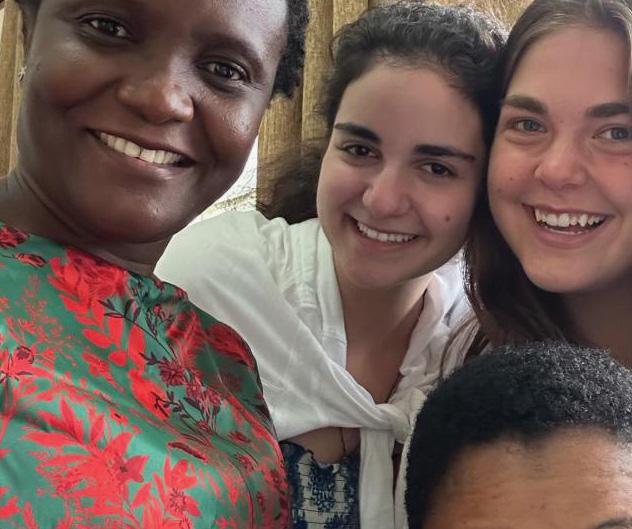
In addition to programs abroad, CGHE leadership prioritized enrichment of the UVA community on Grounds by inviting global practitioners to engage directly with students. One visiting guest was Gibson Kibiki, currently chief executive of Africa Research Excellence Fund, who discussed the digital health revolution. More recently, the students heard from Bram Wispelwey and Amir Mohareb of Harvard Medical School, Middle East scholars and physicians performing research in humanitarian crises.
The 2024 Global Health Case Competition remained a popular engagement opportunity for students. This year, in partnership with the University of the Free State, South Africa, CGHE engaged over 150 UVA student competitors in addressing a global health challenge. The winning team represented UVA at the national competition at Emory University/CDC.
A new pilot was introduced this year—Global Partnership Essentials—a co-curricular training and workshop model open to faculty and students in the academic year prior to their global health travel experience. Predicated on the Partners in Health curriculum, GPE provides critical exposure to global health practices along with practical pre-departure role playing, conflict resolution, and problem-solving of cross-cultural ethical dilemmas.
One highly successful initiative, eGlobal, pairs UVA students with Rwandan peers in an online format to jointly investigate global health topics relevant to both countries.

In 2024, eGlobal supported 46 UVA/Rwandan student pairs and will now be offered as a year-long course in Global Studies as eGlobal: Sustainable Engagement in Rwanda
CGHE Faculty Mentors provide essential support for new generations of student scholars. Often partnering across and within disciplines and schools, faculty leaders in biomedical engineering, nursing, environmental engineering, medicine, and environmental thought and practice engage individual students as well as integrated teams of students. Associate professor of nursing Emma Mitchell will lead a team of 14 students from the College of Arts & Science and the School of Nursing to the Bluefields region of Nicaragua in projects of women’s health and climate change. In 2024, over 55 CGHEaffiliated scholars received this valuable mentoring, joining more than 20 senior medical students who work clinically in hospitals and clinics around the world through the CGHE Scholar in Medicine Award.
The recipient of this year’s Dick & Nancy Guerrant Global Health Equity Professor Award was Global Studies assistant professor Levi Vonk, who will work with student scholars in immersive ethnographic research about the migration crisis in Mexico.
Through its many initiatives, CGHE continues to bring together UVA faculty and students interested in global public health opportunities around the world and at home.
When Colton Arney was a high school senior, his English teacher introduced him to UVA’s Lingletes Linguistic Challenge, a program that shaped his academic path. This initiative is a community-engaged linguistics course where UVA students collaborate with Virginia high school students.
Led by professor Janay Crabtree, UVA undergraduates guide high school students through problem sets based on diverse world languages, many of which are endangered. The partnership fosters an understanding of language patterns, even when the students have no prior knowledge of the language itself.
Arney became the 2022 Champion and is now a rising second-year UVA student. “Although I was leaning somewhat toward UVA when I started Lingletes,” he said, “it was the tipping point that made UVA my dream school.”
In Fall 2023, the languages studied included Swahili, Tok Pisin, Gothic, Gaelic, Persian, Japanese, Hebrew, and Dutch. The program culminates in a day-long event at UVA, where high school students from across Virginia compete for the title of Linglete Champion, inspired by the international Linguistic Olympiad.
Professor Crabtree grew up in rural Smiths Grove, Kentucky, and discovered linguistics in college, so she aims to make such opportunities accessible to students from rural areas. She recognizes that they might otherwise miss the chance to participate in linguistics and international competitions due to a lack of resources.
The Fall 2023 Lingletes Linguistic Challenge took place at UVA’s Lorna Sundberg International Center. Nine high school students from four counties and five schools in central Virginia participated. Theo Brockman from Western Albemarle High School emerged as the winner. The event included a group competition in Armenian, research presentations by UVA students, and individual competitions in Swahili, Badukh, and Inukitut, followed by an awards ceremony. Students enjoyed meeting their peers, as well as the competition’s challenge and the overall collaborative experience.


Looking ahead, Crabtree plans to expand the program, particularly into the Appalachian region and other remote areas with limited academic opportunities. Strategies include collaborating with the Governor’s School to promote the program, engaging with K-12 school counselors, and partnering with UVA Advance—a summer program for high school students seeking college experience. The program’s success relies on past participants sharing their experiences with others.
Arney helped make the 2023 problem sets as part of the program staff, bringing his experience full circle. “Human language is so diverse, so there’s always something to learn,” Arney said. Continuing Lingletes as part of the program staff allowed Arney to learn more about language and help others discover their passion for the field.
English as a Second Language services at UVA are offered through Center for American English Language & Culture. CAELC serves to provide leadership on issues related to ESL/intercultural communication and to help members of the UVA community attain the level of linguistic and cultural proficiency needed for success at a research university in the United States.
The Multilingual Outreach Volunteer Effort, part of CAELC’s volunteer programming, harnesses the power of UVA’s multilingual students and faculty to provide translating and interpreting services to Charlottesvillearea nonprofit, community-based, and educational organizations, as well as units within UVA. MOVE now represents 55 languages and over 600 volunteers. UVA created MOVE during the early days of the COVID-19 pandemic to better communicate critical information to those with limited English and digital resources. Volunteers assist with small translating and interpreting requests from Charlottesville-area nonprofits and educational
organizations, as well as across UVA.
MOVE leadership also networks with other volunteer translating programs at other universities, including Rutgers University and University of Michigan. Together they participate in a grant program for interdisciplinary work across health sciences, sociology, and linguistics, including applied fields such as sociolinguistics, translation, and language pedagogy.
This year, MOVE embarked on a new partnership with the Social and Behavioral Sciences Institutional Review Board, an ethics committee that protects the rights of human subjects in research. Such a collaboration enables MOVE to assist researchers by translating consent forms and surveys to reach underrepresented populations. This partnership particularly supports undergraduate and graduate researchers who lack resources for professional translation services.
All of MOVE’s partnerships and interdisciplinary work stem from a dedication to provide information to community members in the languages they understand best.
Hsin Hsin Liang taught Chinese at the Department for East Asian Languages, Literatures & Cultures at the University of Virginia for 22 years and retired at the end of the academic year. She spoke to UVA Global about her tenure at UVA.
What memories stand out from your years at UVA?
LIANG: I joined UVA in 2002. Before that, I taught at the University of Michigan for 16 years as a lecturer. One of the most attractive reasons for me to come to UVA was its reputation for excellent undergraduate education and the amiable, supportive relationship between professors and students. I was hired as an assistant professor and the coordinator [director] of the Chinese language program. I dreamed of fulfilling many of my professional aspirations at UVA.
I have so many memories from these 22 years. If I had to list just one or two, I would mention Gene Block, former vice president and provost, inviting newly arrived faculty members to a Thursday

breakfast. He was willing to get to know us personally and shared his plans for the University, which was precious.
I am grateful for the opportunities provided by our University, the International Studies Office, the Department of East Asian Languages, Literatures & Cultures, and our partner at East China Normal University in Shanghai for the UVA-in-Shanghai Chinese summer program.
What is your message to students who want to learn a new language?
LIANG: I believe that learning a language is not only about studying vocabulary and grammar but also about understanding another culture and another group of people. Our viewpoints are widened and our attitude toward the world becomes much more tolerant and accepting. In this way, we become less biased toward people and the world.


Volunteers with International Students, Staff, and Scholars is part of Center for American English Language and Culture. VISAS has grown over the past 24 years—from informal gatherings of a few undergraduates who help international TAs to hundreds of UVA student volunteers and international partners.
VISAS today is a robust, complex, and professionally supported program that provides English support to the UVA community’s many international members, promotes global experiences for undergraduates, and fosters intercultural skills and perspectives at UVA. This program is unique to UVA, has been featured in applied linguistics research and international conferences, and has been sought out as a model by other universities.
VISAS programs include:
+ THE LANGUAGE CONSULTANT PROGRAM.
Partners meet for an hour a week on Grounds for relaxed English practice and cultural exchange.
+ THE CLASSROOM CONSULTANT PROGRAM.
Volunteer “students” give feedback for prospective international TAs as they perform practice teaching demonstrations and office hours.
+ THE TEACHING CONSULTANT PROGRAM.
Volunteer “teaching consultants” partner with, observe, and consult with new international TAs as they adjust to teaching in the U.S.
+ THE ESL ASSISTANT PROGRAM.
Volunteers come to ESL classes for graduate international students and engage in class discussions, contribute authentic English, and provide helpful feedback.
+ THE WORKPLACE ESL PROGRAM.
VISAS volunteers welcome recently resettled English language learners hired for service jobs around the University, helping them develop English and literacy skills. Employees and their volunteer partners meet weekly during employees’ break times, in a supervised workshop setting on Grounds.
+ VISAS CAFÉ.
Participants meet weekly for culture-based discussions and international refreshments. VISAS Café welcomes all members of the UVA community for English conversation and cultural exchange.

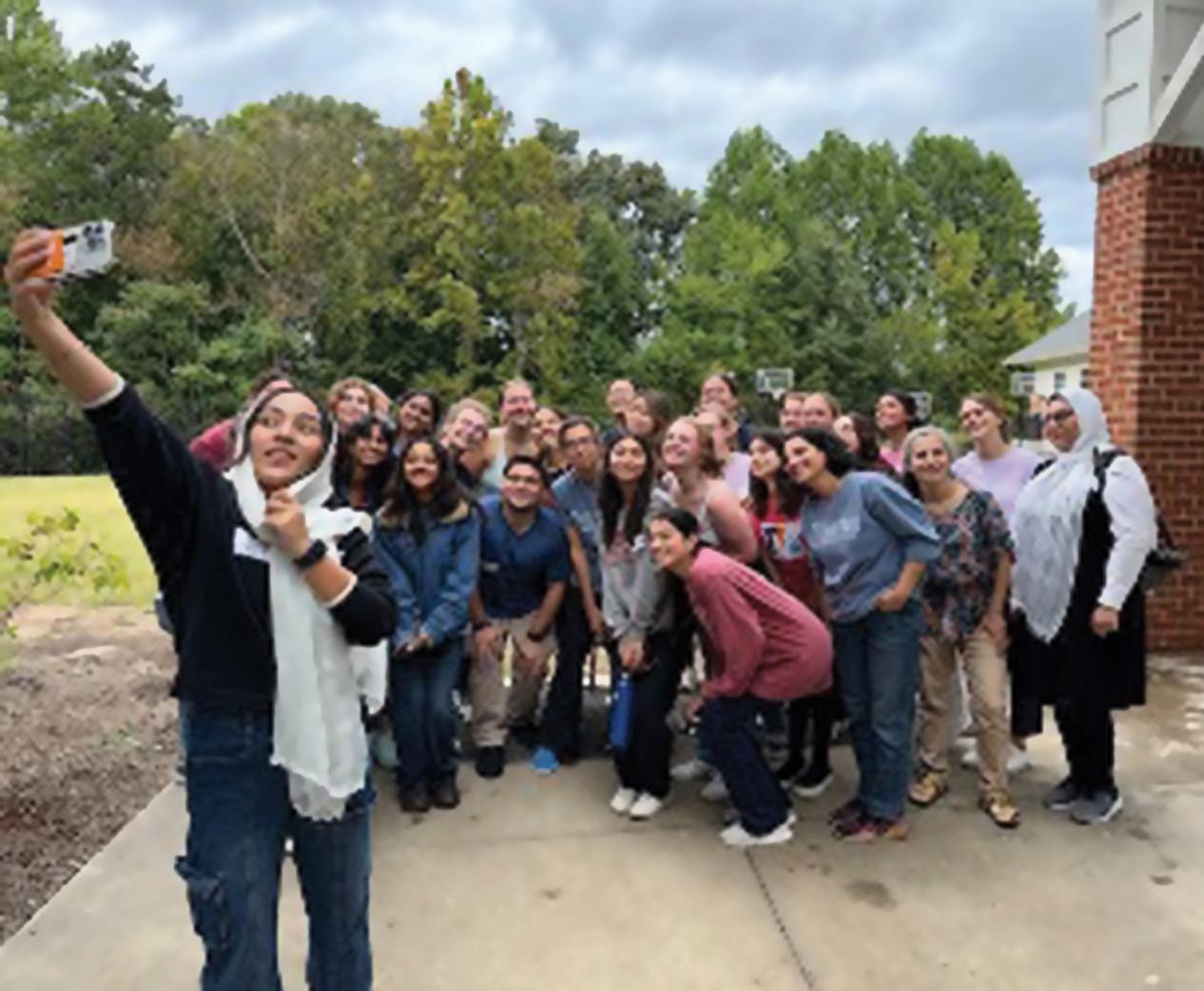
UVA rising fourth-year VISAS volunteer Ali Jarrah was inspired by his English learning partner—a Congolese refugee who dreamed of opening a catering business. He connected VISAS’ Workplace ESL Program with Hereford College to hold cultural food events to provide opportunities for aspiring chefs with delicious food and cultural learning for UVA students.
VISAS Café is a weekly event open to the UVA community, focusing on English practice, cultural exchange, and building cross-cultural friendships. VISAS (co-hosted by MOVE) held an end-of-year garden party to celebrate all of the accomplishments of their international

Cville Tulips supports local Afghan and Syrian refugee women and children by building community through responsive English, health, and arts education. CAELC advises Cville Tulips’ English language program curriculum and teacher training, while supporting UVA students to work with English language learners. The program removes common obstacles to education by offering transportation; childcare; interpreters for Dari, Pashto, and Arabic and a dedicated space for women learners.
Named a 2024 Philanthropy Champion by the Center for Nonprofit Excellence, Cville Tulips has grown dramatically in the past two years, with 180-200 Cville women and children attending its biweekly gatherings.
Current number of MOVE volunteers: 605
Current number of languages MOVE volunteers represent:
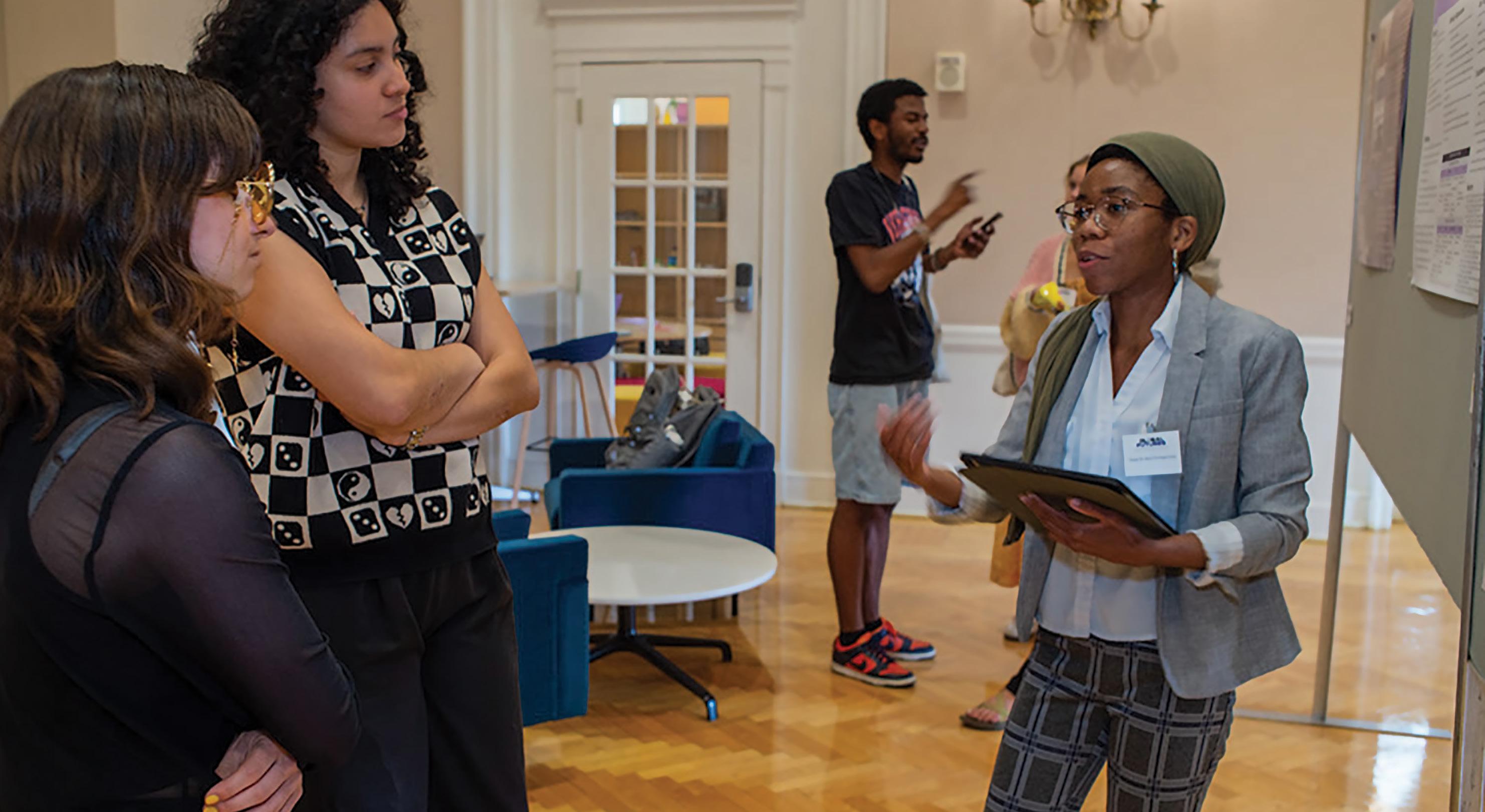
The Global Studies program has continued to grow since its creation in 2014.
This year, Global Studies received 381 applications and admitted 206 students to the program. As of Spring 2024, a total of 1,497 students have graduated with a global studies major. Since 2018, 50% of the program’s students have studied abroad.
This year, Global Studies offered a record 78 courses enrolling approximately 1,825 students from across UVA. Of these, 22 were new courses—including five J-term and five summer courses.
In Spring 2024, Global Studies awarded Aigrain and Kapadia Family Fellowships to five students:
+ Anna Trainum (GSVS '25)
+ Mackenzie Durham (GPH '25)
+ Anna Travasos (GSVS '26)
+ Emily Barker (GSVS '25)
+ Julianne O’Leary (GSSJ '26)
More than 300 students participated in the third annual Global Futures research symposium, which featured over 190 research projects. Five Global Studies alumni joined for a career panel, and visiting professor Laurent Berger from EHESS (Paris) presented the talk “Towards a Comparative Anthropology of Globalizations: Outline of a Research Program in Global Studies.”
SEE THE GLOBAL FUTURES WEBSITE FOR DETAILS AND A RESEARCH ARCHIVE.

ASSISTANT PROFESSOR PIERRE FINK joins Global Studies and Sociology (50/50) in August 2024. He earned a PhD in sociology from Columbia University and is currently a postdoctoral fellow at the Institute for Global Law & Policy at Harvard University. His research explores how financial elites create markets that are hidden from the public but powerfully influence citizens’ economic opportunities across the globe. This fall, he will teach a new Global Studies course: Studying Global Commerce
ASSISTANT PROFESSOR ANDREJA SILIUNAS joins Global Studies and the Engagements Program in August 2024. She earned a PhD in sociology and social policy from Harvard University. Her dissertation, The Art of Westernizing: Nationalism, Globalization, and the Politics of Public Art in PostSoviet Lithuania, addresses important theoretical concepts in the Global Studies curriculum. This fall Siliunas will teach the new course: Global Systems of Inequality
GABRIELLE KRUKS-WISNER published ClaimMaking in Comparative Perspective: Everyday Citizenship Practice and its Consequences, with J. Gallagher and W. Taylor (Cambridge University Press, 2024).
TESSA FARMER AND HELENA ZEWERI published the book chapter “Beyond Deconstruction and Towards Decoloniality: Pedagogy and Curriculum Design in SWANA and South Asia Studies in US Higher Education,” in Challenging Global Development: Towards Decoloniality and Justice (Palgrave Macmillan Cham, 2024).
LEVI VONK was awarded the 2024 Guerrant Professorship for Global Health Equity, which provides three years of research support for innovative projects addressing global health equity domestically or abroad. His book, Border Hacker, received an honorable mention for the Victor Turner Prize—the most prestigious book prize from the American Anthropological Association—as well as for the Arthur J. Rubel Book Prize, from the Society for Latin American and Caribbean Anthropology.
SYLVIA TIDEY received two prestigious teaching awards in Spring 2024: the Jefferson Scholars Foundation Award for Excellence in Teaching and the UVA All-University Teaching Award.
PHOEBE CRISMAN created the new J-term program UVA in India: Urban Transformations— Exploring Sustainability Past + Present, in partnership with O.P. Jindal Global University. The course focused on understanding both past and current sustainable strategies for urban density, rainwater collection/storage, and natural materials.

Muhammad Tayyab Safdar joined the Global Studies faculty in Fall 2023. He is currently teaching about global development and perspectives from the Global South, based on his research on South-South global development relations—in particular the relationship between China and Pakistan. What courses did you offer in Global Studies this year?
SAFDAR: I taught the course Dynamics of Great Power: View from the South. The course explores the strategies that developing countries in the Global South deploy to navigate the emergence of renewed great power competition. It uses a historical lens to explore the impact of European and non-European imperialism on large parts of the developing world.
I also taught a class in the Engagements Program titled Global “Development:” The Great, the Good & the Ugly. This course explores the meaning of global development and its acceptance as a universal idea. It explores the different views on what it means to be developed and how mainstream actors engage with these differences.
In the short 10 years since its inauguration, Global Studies has engaged many students with innovative courses and opportunities.

Rolando Vargas is a 2023-2025 postdoctoral fellow in both the Global Studies program and the Department of Art.
How has teaching for both departments impacted your approach to teaching?
VARGAS: Serving different disciplines in the same class allowed me to apply what I have been learning in my own research: to think of an object of study from different disciplines. Students remind you of this in class. For example, you cannot go that deep into art history references, as not everyone would make sense of those connections. But it is good to hear when art students share their art historian analysis with the rest of the class. Film analysis is an excellent object of intersectionality; it is something that Global Studies students find familiar, and art historians could see how practical it is to use art history to understand film theory.
The class is an ongoing conversation between peers, or at least that is what I try to project in our sessions.
I am not an expert in global culture, and I cannot fully understand the specificity of a community in Kenya for one week before jumping into an environmental conflict in the Philippines in the next class. I am more of a facilitator, trying to highlight what we need to focus on and what are the relevant and challenging aspects of the films we study. Then, students fill in the gaps. I am not limiting their essays to the references they should use. For example, I found it fascinating how one student wrote about a Kenyan film for one of her essays, then used a remarkable Kenyan scholar to write about Western framing and the insertion of African tropes in cinema.

Academic and creative writer Levi Vonk joined UVA as a Global Studies assistant professor in Fall 2023 and is currently teaching courses on inequality in the media and global migration.
How does your work, both academic and nonacademic, inform your teaching?
VONK: My research is with vulnerable people who must live with the everyday consequences of concepts that might seem more abstract to UVA students—concepts such as climate change, mass migration, undocumented status, and the like. My goal is to teach students that these events are not just happening “out there;” they are real things that our generations are called to face head-on. In my classroom, we are not just reading for the sake of reading. I am trying to give students the tools necessary to face some of the most urgent problems of our time. I don’t want you to leave my classroom only feeling like you’ve learned something; I want you to leave knowing that you must do something.
At the same time, coming from a semi-journalistic background, I know the importance of telling a good story. And that’s how I view teaching: How do I take these important concepts and relate them to my students in a way that resonates with them, that contextualizes them in ways that they can apply to their own lives? That’s what keeps it interesting for me, and fun.

EducationUSA is a U.S. Department of State network of over 430 international student advising centers in more than 175 countries and territories. Over the last year, the organization has been updating videos that provide a window to the U.S. higher education system, including a new series of 12 videos. Each video promotes a different aspect of U.S. education.
UVA Global reached out to EducationUSA on behalf of the University of Virginia to be included in the series. EducationUSA agreed and was enthusiastic about shooting one of their videos on Grounds. The focus of the video was about professional/graduate education, and the Office of the Vice Provost for Global Affairs worked with associate deans/assistant deans in the schools of Law and Darden and the College and Graduate School of Arts & Sciences to narrow down students for the video. The video was shot over the spring, with students speaking about their experiences as international students. The final video was released in Fall 2023.
+ CGII Update
+ Focus on Global Democracy
+ Focus on Environment and Sustainability
+ Focus on Public Health

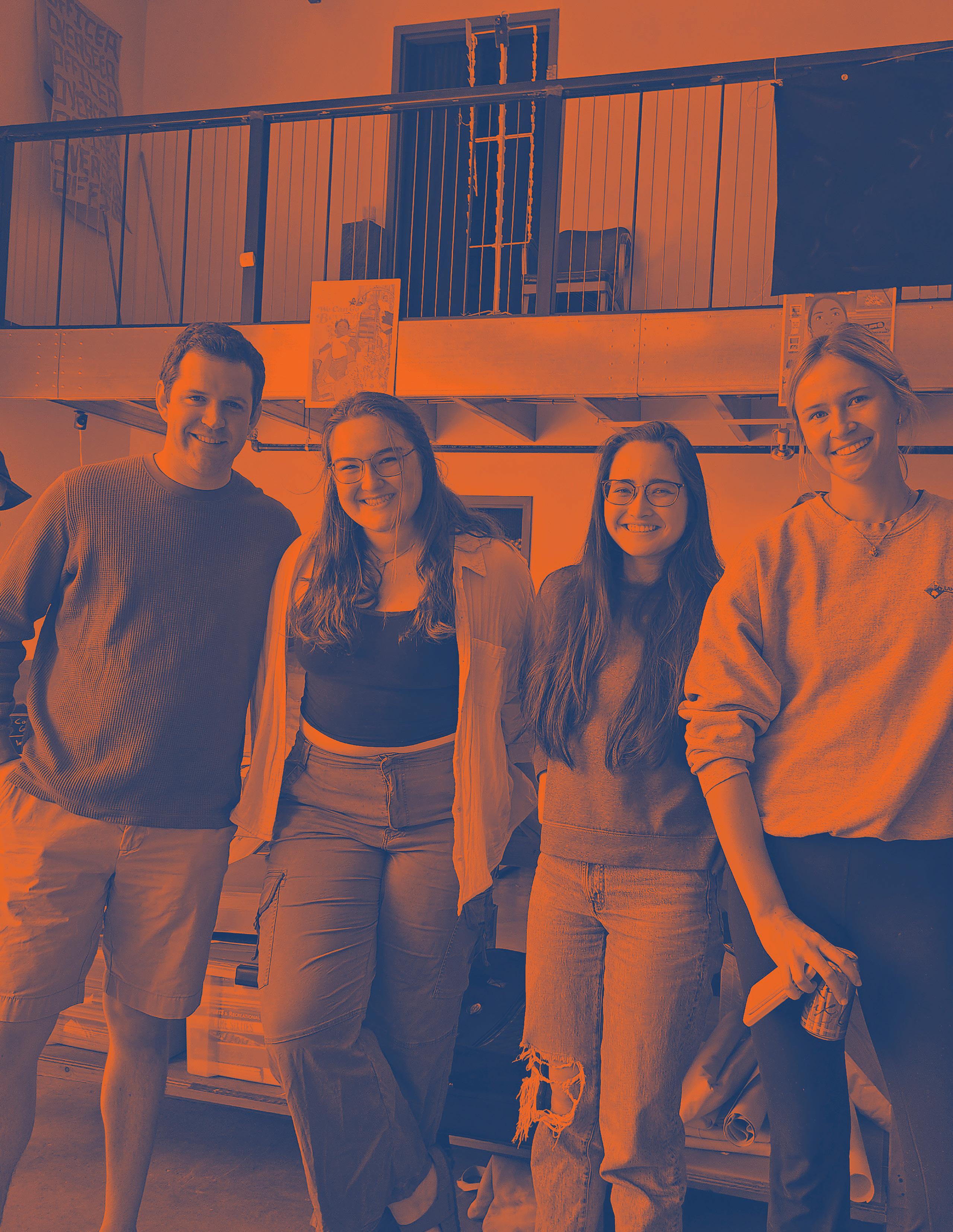
“Global inquiry across all fields, from humanities and STEM to social sciences, continues to grow at a rapid clip. Faculty are showing the importance of collaboration between scholars and other knowledge-makers in the world and are demonstrating that all research is ultimately global in nature.”
Brian Owensby, professor of history and director, Center for Global Inquiry + Innovation
Academic year 2023-2024 surpassed expectations—again. Center for Global Inquiry + Innovation received a record 135 submissions for exciting research projects all over the world.
Proposals ranged from large-scale collaborative work and grants for faculty-mentored undergraduate research, to individual grants for faculty and graduate student research. CGII awarded projects amounting to one-third of the total amount requested, suggesting a growing demand for this kind of research support.
Awarded projects involved 77 colleagues across several schools, including Architecture, Arts & Sciences, Education, Engineering, and Medicine, as well as the Karsh Institute for Democracy. In addition, CGII awarded 27 global research grants to graduate students seeking support for field research. These projects spanned every continent save Antarctica—as well as outer space.
Global Programs of Distinction (awards up to $100,000) included:
+ addressing issues of violence prevention in Mexican elementary and middle schools
+ researching autism treatment through cultural adaptation in Bolivia and Kenya
+ building equitable research capacity and ethical review for participatory community research in Charlottesville and Cape Town
A NOTABLE SUCCESS from previous award cycles involves a recent $2.88 million contract from the USDA for research into global labor migration. The project, headed by Jennifer Bair, professor of sociology, won a Global Program of Distinction grant in 2022. In the years since, researchers contacted migrant advocate groups, national and transnational NGOs, and U.S. government agencies. The team was invited to a White House briefing this year on the challenge of labor migration, with Mexican and Jamaican officials.
Awarded projects ($2,500-$15,000) included:
+ designing low-carbon structures in developing regions
+ developing advanced polymers for water purification
+ studying the relationship between abolition and opium in Asia and the British Caribbean
+ applying contemplative practices in higher education
+ discovering the funding behind Ukraine’s resistance to Russian invasion
+ understanding memorialization and personhood in Taiwan’s mountain forests
+ considering the role of plebiscites in the context of elections during foreign occupation in Bolivia
+ promoting mathematical encounters between UVA and Vietnam
+ considering gender, power, and climate change on the ancient Swahili coast through archaeology
+ exploring the origins of table salt in outer space
+ studying extracellular vesicles and their role in diagnosis and drug delivery
+ creating a film about press freedom and censorship in Guinea
+ developing digital tools for the study and teaching of K’iche and Yukatek Maya languages
+ inquiring whether China’s Belt and Road Initiative is reordering Eurasian trade flows
+ studying water reuse, urban agriculture, and heritage preservation in Cairo
+ learning about Pluto’s atmosphere by observing its occultation of a particular bright star—an event visible only in August 2024 from South Africa



I knew when I came to UVA that I wanted to build a connection between the needs of advocates and the intellectual resources of the University. I decided that I would spend my time directing resources outward, listening to the community about what they needed, and developing classes that taught students how to do that work. It has taken off in ways that are more interesting and more important than I think I could have imagined.”
In April, over 40 democratic and human rights activists from around the world came to UVA in hopes of learning from each other about how to sustain democratic movements, taking refuge in UVA’s values of free speech and respectful discourse.
In dialogue with UVA students, they shared their own experiences in advancing democracy and defending individual freedom.
The three-day conference, called the People Power Academy, featured themes of “Learning from the Front Lines,” “Technology and Disinformation,” and “Movements in Transition.”
Presenters included prominent international advocates, journalists, and academics committed to nonviolence and democracy, such as:
2024 Nobel Peace Prize nominee Félix Maradiaga, nominated for his work protecting religious freedom in Nicaragua
2018 Nobel Peace Prize nominee Leonardo Lopez from Venezuela, who—along with Dominika Lasota of Fridays for Future—led a successful national campaign to increase the youth vote in Poland
Evgeniya Chirikova, ally of Russian opposition leader Alexei Navalny
In addition, two leading activists announced major initiatives that have been supported by UVA undergraduate students to bring to fruition: The Nehemiah Project, which supports pastors committed to rebuilding civic society in authoritarian nations, presented by Pastor Evan Mawarire of Zimbabwe; and End Arbitrary Detention, an international campaign to eradicate imprisonment as a political weapon against dissidents, championed by 2024 Nobel Peace Prize nominee Felix Maradiaga, originally of Nicaragua.
“This is a unique and historic gathering of leading democratic advocates, which sets the agenda for expanding democracy for the next decade,” said Steve Parks, director of Democratic Futures Project and one of the main organizers. “It speaks to the importance of University of Virginia as a civic and globally engaged institution that it has been chosen as the site for this important work.”
Srdja Popovic, executive director of Center for Applied Nonviolent Actions and Strategies, the primary sponsor of the conference, said much is at stake for global democracy in 2024. “It is, more than ever, the time to make joint effort,” he said, “to learn, explore, and build connections between activists, experts, and academics to learn from the frontlines of the democracy struggle.”
“The convergence of so many prominent democracy advocates here on Grounds in such a short period,” said vice provost for Global Affairs, Stephen Mull, “is a powerful reminder of the global resonance of the values on which our University was founded—and that while we have a lot to learn still about democracy, we also have much to give and inspire. We are not alone in this unending work.”
2024 Nobel Peace Prize nominee Félix Maradiaga speaks about the passion behind his work.
How did you get involved in activism/advocacy?
MARADIAGA: I have been involved in activism from a very young age. As a child, I was part of initiatives that promoted the rights of politically exiled people in the United States. However, my most active involvement was upon my return to Nicaragua in the late 1990s. Through my church and faithbased organizations, such as the youth ministry, I joined a movement that promoted a culture of peace, disarmament, and humanitarian assistance to war victims in the northern area of Nicaragua, particularly in the areas most devastated by war. I was only 16 years old when I led the first disarmament movement and, at 20, I assumed an unusually influential government position as director of the Office of Attention to Ex-Combatants. Activism has been an essential part of my life.

What is an important lesson you’ve learned in your journey?
MARADIAGA: I’ve learned that the path of activism is often complex, mixed with episodes of disappointment and disenchantment. In that sense, the cause we promote must be something we deeply believe in and that is intimately associated with our values, principles, and life purpose. Only with that level of commitment is it possible to persevere in activism and not be discouraged by the setbacks, attacks, and dangers along the way. I’ve also learned that the path of activism, particularly in the areas of nonviolence and defense of human dignity, can be incredibly uplifting and a source of great satisfaction—a noble, altruistic cause that gives purpose to our lives. But my main lesson learned is that we can only persevere if we are convinced in the deepest part of our being in what we do.

LISTEN AS THEY DISCUSS THEIR RECENT WORK AND PLANS FOR THE FUTURE.
VOLYA VYSOTSKAIA Belarusian human rights activist
SRDJA POPOVIC
Karsh Institute practitioner fellow in democracy and global pro-democracy leader
STEVE PARKS
UVA professor of English and founder, Democratic Futures Project
The Humanitarian Collaborative at UVA brings together scholars, practitioners, students, and community partners to address the world’s most pressing humanitarian and development challenges.
They conduct applied interdisciplinary research, engage in real-time analysis and assessment, and provide strategic recommendations.
Thanks to generous support from the Ruth Young Fund, administered by Center for Global Inquiry + Innovation, HC projects this academic year included over 15 faculty and staff, 35 students, and 18 humanitarian and development organizations from around the world.
Through its research and engagement, HC brings together humanities research and humanitarian policy, advocacy, and operational work. It launched a project in partnership with Save the Children in the 2023 earthquake-affected areas of Türkiye. The project focused on developing new methodologies to elevate the voices of young children through photovoice engagements and will result in both research and a photo exhibit.
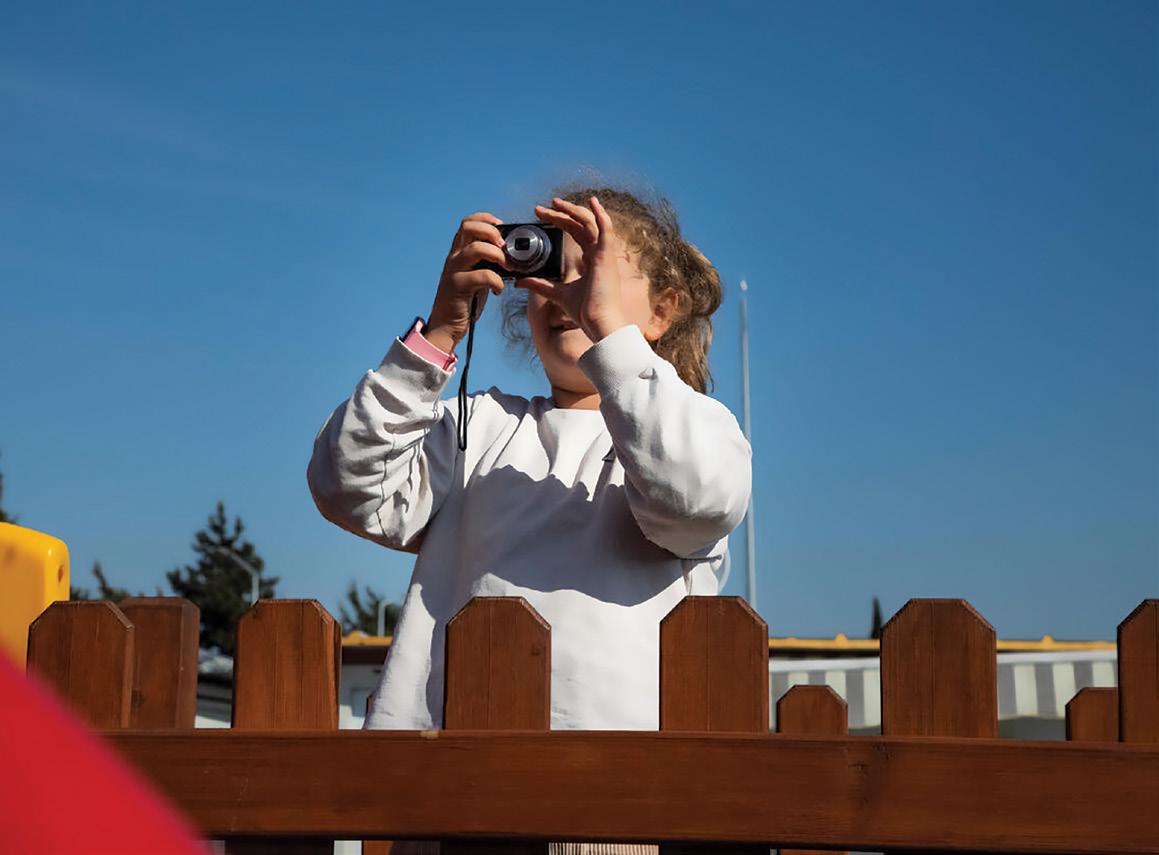
In addition, HC supported English professor Micheline Marcom’s work on “What Can I Say, We Lost Everything,” a visual art project. She connected Armenian diasporan artists—a novelist and a visual artist—to explore the afterlives of the recent violent displacement of over 100,000 indigenous Armenians from the Karabakh/Artsakh region of the NagornoKarabakh Highlands.
HC also launched a new Humanitarian Fellowship program, selecting two graduating students— Emma Nardone and Sadie Rogerson—as the inaugural Humanitarian Collaborative Fellows for 2024. The competitive fellowship allows them to work with the public policy team at World Food Program USA ; they will engage in analysis and advocacy with members of Congress in support of the United Nations World Food Program’s humanitarian work around the world.
THIS PILOT PROGRAM IS A UNIQUE OPPORTUNITY TO ACQUIRE PRACTICAL, REAL-WORLD EXPERIENCE, ENHANCE PROSPECTS OF LONG-TERM INVOLVEMENT IN THE HUMANITARIAN SECTOR, AND BUILD A NEW PARTNERSHIP FOR UVA.


One of the first CIOs I joined at UVA was Growing for Change, which works on food justice in Charlottesville by providing personal gardens to residents of lower-income communities. It put me right up in front of one of the countless pressing justice issues tied to the environment, and I have been diving in to learn more ever since.”


Over the fall semester, students from the School of Architecture established the Ukraine Green Recovery Lab—a Diplomacy Lab project in which they developed recommendations to rebuild the war-torn Ukrainian city of Izium.
The city has been devastated by the Russian aggression and occupation, with 80% of its buildings and 70% of its infrastructure damaged or destroyed. Under the leadership of professor Suzanne Moomaw, chair of Urban & Environmental Planning, 24 students explored strategies to address immediate recovery needs while laying the groundwork for long-term sustainability.
The Diplomacy Lab program, launched in 2013 by the Department of State, engages students and faculty from universities across the country to address realworld foreign policy challenges and broaden the State Department’s research base. This initiative allows students to contribute directly to the policymaking process while harnessing the intellectual capital of academic institutions. This year over 60 U.S. colleges and universities participated. Only planning programs at MIT, Penn, and UVA were selected for the first round of the Ukraine work.
Through the Ukraine Green Recovery Lab, Moomaw and her students formulated comprehensive redevelopment plans for Izium, committed to revitalizing the city in a manner that respects its cultural heritage and fosters community resilience. Using aerial photography, geospatial data, and news accounts, they developed phased plans. These plans, focused on sustainable urban planning, encompassed everything from rebuilding schools that had been destroyed and proposing sustainable industries, to enhancing parks and housing, and creating sustainable systems and memorials for the city’s 50,000 residents.
The magnitude of the project underscored the students’ dedication to make a meaningful impact. As they grappled with the complexities of post-conflict reconstruction, they confronted the harsh realities of war while striving to maintain a sense of optimism and purpose.

For rising fourth-year architecture student Ben Edlavitch, the project served as a poignant reminder of the human cost of conflict, prompting reflections on the fragility of communities and the imperative of resilience. Similarly, Polina Andreeva, who received her undergraduate degree in urban and environmental planning in May 2024 and has a personal connection with the region, navigated the emotional complexities of the project, balancing empathy with the need for practical solutions.
“Working on the Ukraine Green Recovery Lab project has been a deeply impactful experience for me,” said Daniel Langford, who completed his master’s in architecture in May 2024. “The sheer scale of destruction in Izium underscored the importance of our work in sustainable urban planning, which plays a role in fostering resilience and healing in post-conflict regions.”
Chloe Kikstra, who also received her undergraduate degree in urban and environmental planning in May 2024, added that the impact of this project has redefined the scope of college courses—showing how they can address real-world conflicts.
Students presented their comprehensive phased plan to the Ukrainian ambassador, State Department officials, and other dignitaries at the end of the semester. In the spring, they presented at this year’s Diplomacy Lab Fair to representatives from the State Department and other institutions. In both cases, they received positive feedback, further supporting their aim to provide practical hope for a safer, more sustainable future for Izium.
Both faculty and student participants anticipate that their work will have a continuing impact. “We feel that we have created a model for sustainable, inclusive communities that could be used anywhere in the world,” Moomaw said, “including in our own city of Charlottesville.”
Lauren Miller, assistant professor in the Department of Environmental Sciences, discusses her glacier research, a recent trip to Japan, and the potentially massive global impact of Antarctic research.
Tell us about your research.
MILLER: I’m a geologist who uses rocks and landscapes as history books to study glacier changes over hundreds or thousands of years. This knowledge helps predict future glacier changes, which are accelerating due to climate change, affecting sea levels globally. By understanding the interactions between glaciers, the land, atmosphere, and oceans, we can better predict their future changes and the resulting impact on the environment.
What is the global significance of Antarctic research?
MILLER: Antarctica is interesting to work in and think about because of the lack of people. The vast majority of human inhabitants of Antarctica are scientists and researchers, who live there only temporarily. This means that we don’t talk about the impact of environmental change there on local people and communities, as we do in populated areas. Yet despite that isolation, what happens in Antarctica affects people worldwide. For example, ice melt in Antarctica actually has a bigger impact on rising sea levels on the Virginia coast than ice melt in Greenland.
You traveled to Japan this year. What brought you there?
MILLER: I went to Japan on an international fellowship at Hokkaido University. During my six-week stay, I collaborated with faculty at the Institute of Low Temperature Science and other researchers. My host, Shin Sugiyama, and I found our research complementary. Sugiyama focuses on changes over days, seasons, or a few years as he studies the current status of glaciers and ice sheets in Greenland and Patagonia. As a geologist, I examine changes over much longer timescales, such as tens, hundreds, or thousands of years. This collaboration allowed us to merge our different methodologies and insights, enhancing our overall understanding of glacier dynamics.
While in Japan, I also visited the University of Tokyo and spoke at the Japanese National Institute of Polar Research. Meeting with UVA alumni in Tokyo was another highlight.

What projects are you planning for the future?
MILLER: I’m working on a proposal with Japanese researchers to study glaciers in Alaska and Patagonia that are not shrinking. Understanding why these glaciers behave differently could help predict global glacier dynamics and inform potential interventions. Some glaciers are either stable or advancing due to unique landscape features that protect them from warming oceans. We aim to investigate these features and determine if they can be applied to other regions experiencing rapid glacial melting. Geoengineering ideas, like placing barriers to slow glacier melting, are controversial but could be worth exploring. For example, in the French and Swiss Alps, efforts are being made to cover glaciers and reduce melting; these blankets can be made of heavy fleece with a layer to reflect UV radiation.
Scientists are discussing how barriers in Antarctica might prevent warm ocean water from contacting the ice. However, this approach poses significant logistical, ecological, and governance challenges.
Yet the vast majority of the glaciers outside of the poles are shrinking. This year, Venezuela lost all its remaining glaciers, making it the first country in known history to make the transition from a country with glaciers to a country without. The protection of these remaining glaciers is important, and we as researchers aim to better understand them and how they change.
Additionally, I’m interested in human resilience to environmental change over long timescales. Collaborating with colleagues at UVA and beyond, I plan to explore how human populations have adapted to significant environmental shifts over thousands of years. This research could inform strategies to enhance human resilience in the face of current climate change.

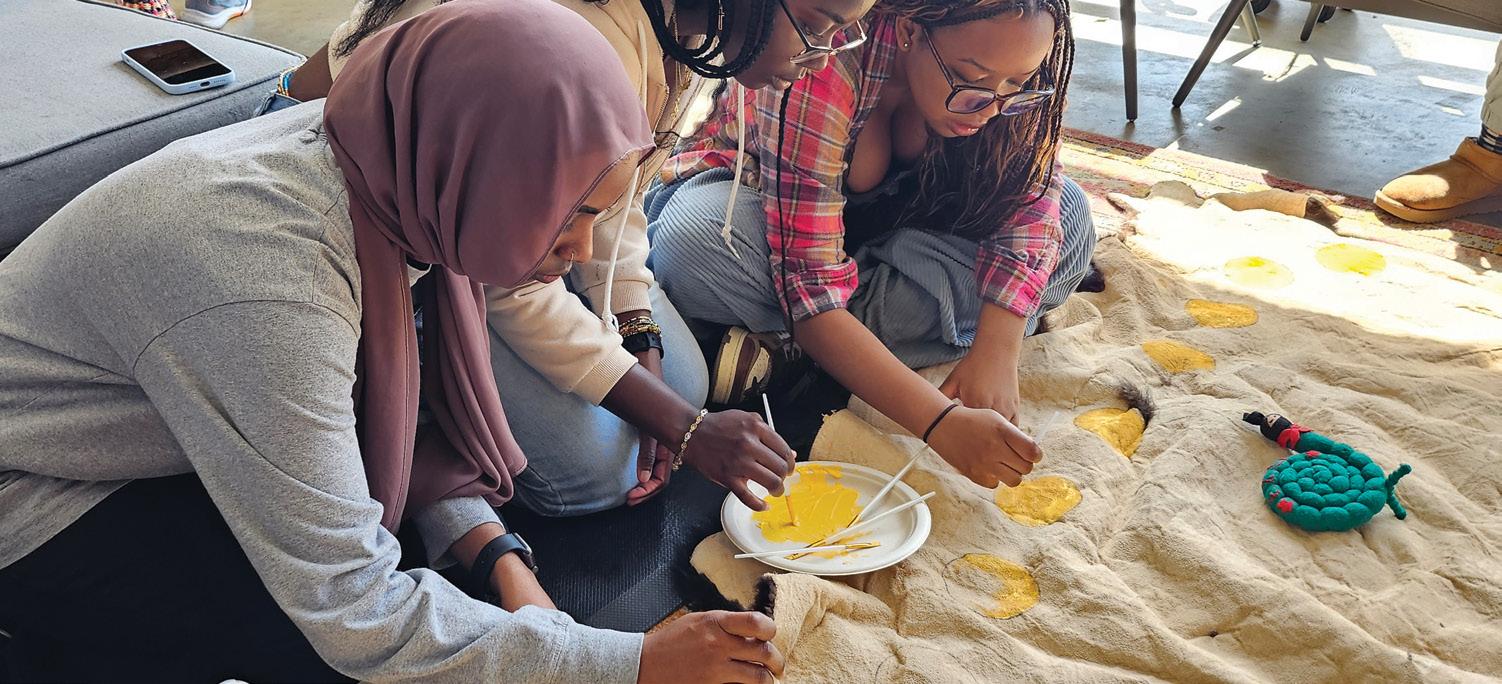
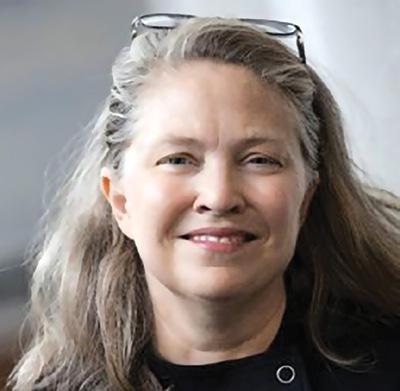
Phoebe Crisman’s global engagement transcends boundaries, weaving together architecture, environmental science, education, and community investment.
The UVA professor of architecture and director of the Global Studies program holds a portfolio of work that spans continents—from Indigenous North America to Europe, South Asia, and Africa, exploring how human ingenuity has shaped the built environment in response to local conditions.
“I’m fascinated by the space between culture, design, and ecology,” Crisman said. “Examining how certain strategies play out differently in Greece and India highlights the profound impact of culture in distinct places.”
“The built environment—landscapes, cities, and buildings—is a record of how we’ve lived over time,” she added, explaining that she studies how those physical changes are influenced by socioeconomic and political forces and climate change.
In Greece, Crisman and her colleague Michael Petrus lead an experiential summer learning program titled UVA in Greece: Odyssey in the Anthropocene, which delves into past and present ways of life across the Aegean region. Inspired by Homeric poems and Odysseus’ travels, students sail aboard monohull yachts, connecting with the ocean as a source of life. Lectures, readings, and cultural exchanges provide insights into traditional Greek settlements and sustainable living practices.
Crisman’s 2024 J-term course, Urban Transformations —Exploring Sustainability Past & Present, took students on a journey through the Indian cities of Delhi, Sonipat, Mathura, Agra, and Fatehpur Sikri. Against the backdrop of the country’s rich cultural heritage and rapid urbanization, students examined the forces shaping urban environments and the challenges of sustainability. In so doing, they gained a deeper understanding of the interplay between environmental, aesthetic, and socioeconomic factors in shaping India’s cities, equipping students with the knowledge and tools to imagine and plan for a more sustainable future.
Another project stands as a testament to Crisman’s holistic approach: “Indigenous Communities and Tallgrass Prairie Resilience in the Face of Changing Climate,” with David Edmunds (Global Studies), Howard Epstein (Environmental Sciences), and Lora Henderson Smith (School of Education). Through a collaboration with Indigenous NGO partners, the project restores tallgrass prairies, which helps preserve cultural traditions and address pressing environmental concerns. The co-design process involves community members in the planning and implementation of initiatives.
Through her dedication to teaching, research, and community engagement, Crisman embodies the spirit of global citizenship and invites others to join her in forging a more equitable, resilient, and sustainable world. She’s always thinking about new technologies, yet at the heart of her work lies a profound commitment to sustainability and a respect for Indigenous cultures and their intricate relationships with the land.
“I often use the term Indigenous ecologies. I’m interested in how we, as a human species, have lived over time,” Crisman said. “What draws it all together is sustainability. How we live as humans on this planet—that’s my ultimate interest.”


Global engagement profoundly changes your view of what it means to occupy a space and exposes you to the rich diversity of human experience. While theoretical courses are helpful, they cannot replace the experience of engaging in-person. This engagement is exciting, sometimes uncomfortable, and deeply rewarding.”


Since joining AMPATH in 2021, the University of Virginia has expanded its engagement, embracing a multidisciplinary approach to global health challenges. AMPATH, the Academic Model Providing Access to Healthcare, connects a consortium of North American universities with Moi University in Eldoret, in western Kenya. Jointly, they develop health training programming and exchange students and faculty.
UVA’s involvement with AMPATH was initiated in 2022 by professors in the Department of Emergency Medicine, Amita Sudhir and Josh Easter. The collaboration has now evolved to include the Schools of Education and Human Development, and Law, as well as the Department of Orthopedic Surgery in the School of Medicine. While emergency medicine remains pivotal, the involvement of other disciplines will meet a need for more comprehensive approaches to care.
A partnership between UVA’s School of Law and the Legal Aid Centre of Eldoret provides free legal aid services to patients at Moi Teaching and Referral Hospital. This collaboration is spearheaded by Nelson Camilo Sánchez, professor of law and director of UVA’s International Human Rights Law Clinic. It addresses legal issues faced by patients who lack access to support services, particularly survivors of sexual- and gender-based violence.
In the School of Education and Human Development, professor Mandy Rispoli is working with AMPATH to increase access to care for children with Autism Spectrum Disorder and their families in western Kenya. Through collaborative efforts, her team of Kenyan and U.S. researchers and clinicians developed a caregiver training program called Pepea. This program has already shown promising results in improving
caregiver well-being and reducing challenging behavior in the children. The team recently received a grant from the Spencer Foundation to explore special education services for children with autism and other neurodevelopmental disabilities in Kenya.
Collaboration across different schools within UVA and with AMPATH has also led to the creation of several interdisciplinary projects for the same population in Kenya. The Schools of Education and Law are exploring education services within the framework of disability rights. The School of Law is developing a legal memo of special education law in Kenya that will inform many of Rispoli’s team’s current and future projects.
The collaboration for Emergency Medicine is growing as well, now involving seven faculty and four residents who have traveled to Kenya. Evident in all of this work is an emphasis on reciprocal innovation and bidirectional learning. This ethos underscores the collaborative nature of the partnership, where expertise is shared between UVA faculty and their counterparts in Kenya, giving insight and influencing best practices in both countries. Such mutual exchange fosters sustainable solutions tailored to local contexts while leveraging global insights and best practices.
LOOKING AHEAD, UVA’s AMPATH involvement is poised for further expansion and deepening collaboration. Sudhir and Easter are working on supporting a new training program in emergency medicine and establishing a yearround presence in Eldoret. This August, two visiting medical students from Moi University joined UVA to observe on the toxicology service. Sudhir and Easter also visited Puebla, Mexico, to explore setting up training and exchanges between the two countries—meeting the demand among students and residents for a Spanish-language exchange program.
Earlier in 2024, you traveled to Kenya. Tell us about your accomplishments there.
RISPOLI: I returned to Kenya for two weeks in February. Leading up to that visit, we worked with our Kenyan partners to culturally adapt an autism diagnostic instrument from the U.S. to Kenya. During our visit, our Kenyan colleagues conducted 12 autism assessments, and we conducted nine training sessions, including ones for students at the Kenya Institute for Special Education, special education professionals and administrators, medical professionals, and families. Additionally, we visited four schools catering to students with disabilities and conducted one treatment consultation for a mother and her child. Overall, our efforts reached 197 individuals through assessments, training sessions, and consultations.
How does your work in Kenya impact your efforts in Charlottesville?
RISPOLI: One of the foundational principles of AMPATH is a focus on reciprocal innovation, challenging the idea that high-income countries are the holders of knowledge, expertise, and innovation. Instead, the focus is on bidirectional flows of knowledge and expertise that then lead to innovation. Our original U.S. caregiver training program focused on communication intervention strategies that families could incorporate into home routines, delivered via one-to-one facilitator and caregiver telehealth sessions. In Kenya, we adapted it to build upon Kenyan cultural values and strengths, integrating storytelling, community-building among caregivers, and caregiver coping strategies.

We then brought these elements back to the U.S. to reciprocally innovate a new U.S. caregiver training program called CAST (Caregiver Autism Support and Training). CAST emphasizes group sessions over oneto-one training and increases the focus on caregiver well-being and coping strategies. This reciprocal innovation approach has allowed both sites to build collaborative solutions neither would have developed without the other, leading to promising results. These suggest positive impacts on caregiver well-being and child social-communication and behavioral outcomes in both settings.
RISPOLI: Our future goals include translating what we learn from our upcoming Spencer Foundation Large Grant-funded project into sustainable innovative solutions to improve access to, and quality of, education for children with autism and other neurodevelopmental disabilities in Kenya.

This spring, more than 100 students from across Grounds came together—with only a week’s worth of preparation—to collaborate and solve a real-world health problem in the annual Global Health Case Competition held by Center for Global Health Equity.
The case—excessive alcohol consumption in South African youth—is a global health problem that also resonates in the U.S. healthcare system and the Charlottesville community.
This competition is modeled on the Emory University Morningside Global Health Case Competition. UVA is among a small group of institutions that annually write a new global health case—with advice from global partners—and invite their students to compete to provide solutions.
“The students who participated in the case competition this year created well-informed, passionate, and persuasive solutions that ranged from empowering youth to make healthy decisions to changing tax distributions at the national level,” said Scott Heysell, director of CGHE. “As interdisciplinary judges, we had the unenviable task of picking a winner, and our internal debate was real.”
This year, CGHE collaborated with the University of the Free State in South Africa to develop a case that addressed the intersection between public health and alcoholism. South Africa has one of the highest levels of alcohol consumption in the world, with over 48% of men and 38% of women binge drinking.
Eliza Pinche, chair of the GHCC committee, said that she has been involved in this competition since her first semester at UVA. “I love being able to deep dive into a selected public health issue, connect with global partners, and organize an event that fosters public health engagement across disciplines.”
The partners work with student leaders on the CGHE Student Advisory Board to develop the case. The problem for this year’s competition was titled “Health Impact of Excessive Alcohol Use in South African Youth.”
“The focus on alcoholism in South Africa revealed the multi-layered context of the South African systems, including the issues around religion, culture, healthcare access, education, social welfare, financing, leisure, and even social security,” said Champion Nyoni, associate professor and research chair of the School of Nursing at the University of the Free State. Nyoni helped write the case.
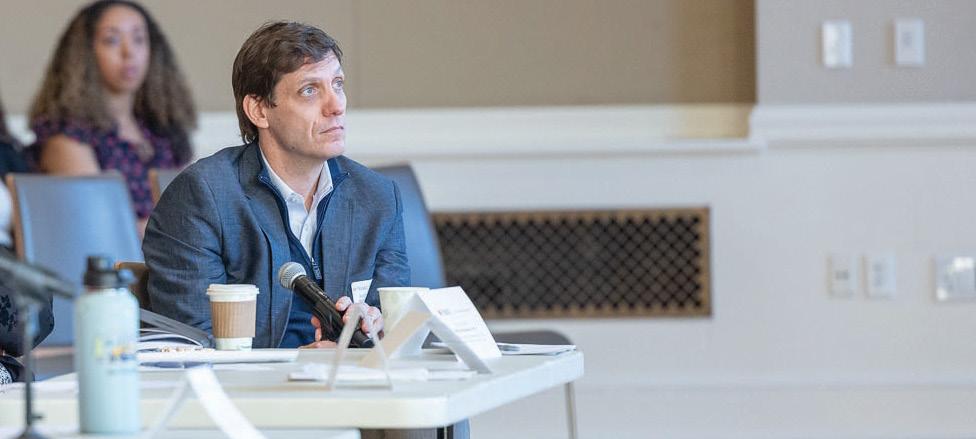
“Students had to integrate high levels of thinking and consideration of the various facets of the community, the social systems for health, and national policies in addressing the case.”
Bonolo Lulu Makhalemele, from the Office of International Affairs at the University of the Free State, said that global health is one of the critical issues for the future of the human species. This is especially true in Africa, where both infectious and noncommunicable diseases threaten development in several aspects. “Developing this case,” Makhalemele said, “created the perfect opportunity for the integration and co-creation of knowledge, as well as practices that emanate from around the world (the U.S. in this case).”
For the winner, judges considered how well the teams understood the problem, how practical and acceptable their recommended interventions were, how well they
delivered their presentation, and how effectively they answered questions during the Q&A session.
Twenty-six teams registered to compete in GHCC. The winners of this year’s case competition are all students in UVA’s College of Arts & Sciences: Anand Charles Colaco, majoring in psychology; Isaac Yoo, majoring in biochemistry and minoring in computer science; and S. Zheng, majoring in economics.
“I am currently taking a health and society class that emphasizes structural barriers as the reason for perpetuating health problems,” said Colaco, who clarified that his team used this philosophy to craft its plan. “Another important thing that worked for us was attending a Q&A session with the professors from South Africa. Learning from them and referring back to the information they told us made a world of difference at the competition.”
April Ballard, associate director of CGHE, said the opportunity to bring inspiring global partners to Grounds and foster their direct, unscripted engagement with UVA is immensely rewarding. “We see the impacts each year and open our doors to all students who bring their effort and unique contributions to the global challenges we all face.”

Two UVA medical students were awarded the Benjamin H. Kean Travel Fellowship by the American Society of Tropical Medicine and Hygiene to support their work in the Global South.
The award, established in 1998, allowed the students to travel to Tanzania to work on global health projects that support research in childhood diarrhea, undernutrition, and tuberculosis.
Sarah Sebastian and Jack Hensien, both fourthyear students, worked with investigators at Haydom Lutheran Hospital, a long-time UVA partner.
“While undertaking advocacy related to sexual and reproductive health in the United States, I’ve learned that speaking to affected populations is essential for truly understanding health inequity,” said Sebastian, who hopes to be an OB/GYN physician. For her, advocacy informs clinical practice, since the lack of access to reproductive healthcare resources leads to disparities in outcomes and a systemic lack of trust in the healthcare system.
Hensien gained clinical experience rotating on the medicine and maternity wards, as well as in the outreach clinic. For that clinic, he joined a team to provide community-based preventative care (childhood vaccinations, antenatal screening, family planning) for patients in more remote locations of Haydom, Tanzania. “I met multiple patients with highly preventable and morbid complications of cardiovascular disease. From these experiences, I

developed my interest in cardiology and hope to be involved in research related to preventive cardiology in resource-limited settings.”
Hensien’s interest in global health comes from his Medical Anthropology and Global Public Health classes at UVA, which inspired him to pursue global engagement through Center for Global Health Equity’s University Scholar Award. Hensien used this award to fund summer research in Haydom. He hopes to join an internal medicine residency program with a global health track.
Sebastian used her funding from the Kean Travel Fellowship and CGHE to work last summer in the obstetrics and gynecology department in Kilimanjaro Christian Medical College Hospital, one of the larger referral hospitals in Tanzania. Sarah spent time on the labor and delivery ward, in the operating room, as well as in the clinic—learning from Tanzanian medical students, residents, and attendings. She plans to incorporate values and lessons from her time in Tanzania to develop her research focus to ensure patients have access to evidence-based care.
“Jack and Sarah’s remarkable accomplishments and collaborative effort represent UVA’s work globally to improve health for all communities,” said Scott Heysell, CGHE director.
The clinical experiences at both sites in Tanzania are administered by Tania Thomas, associate professor of medicine and infectious diseases at UVA, who has worked in the country for 15 years.
UVA welcomed two distinguished faculty members from South Africa in April as part of a collaborative initiative supported by Center for Global Health Equity.
The initiative supports faculty members through a unique PhD training program that bridges their institutions with UVA, facilitating cross-pollination of expertise and ideas.
Mpho Magwalivha works at the University of Venda (UNIVEN) in Limpopo Province, South Africa—a historically Black and predominantly rural area. UNIVEN’s rich history of collaboration with UVA researchers includes CGHE’s founding director and enteric infection-specialist, Dr. Dick Guerrant. Magwalivha specializes in microbiology and virology, focusing on the detection of an enteric virus (Sapovirus) in stool samples from children under age 5 in rural communities.
Azette Swanepoel is head of the occupational therapy department at the University of the Free State in Bloemfontein, a bustling city surrounded by agriculture and historically associated with Afrikaner culture. Swanepoel is an occupational therapist whose research focuses on the types of knowledge transferred in clinical practice and health science education.
During their visit, these researchers engaged in meaningful discussions, shared insights with UVA faculty and students, and planned new collaborations with UVA researchers. “My time at UVA confirmed the value of a holistic view on health and well-being,” Swanepoel said. “By considering the context our patients come from and return to, the cultural and personal factors that might influence their health are important factors to consider.”
Magwalivha also plans to apply some of the ideas honed at UVA to engage with his home community. “I plan to communicate science to the villagers,” he said, “so that when the time comes for projects to be done in science, there will be a bit of understanding.”
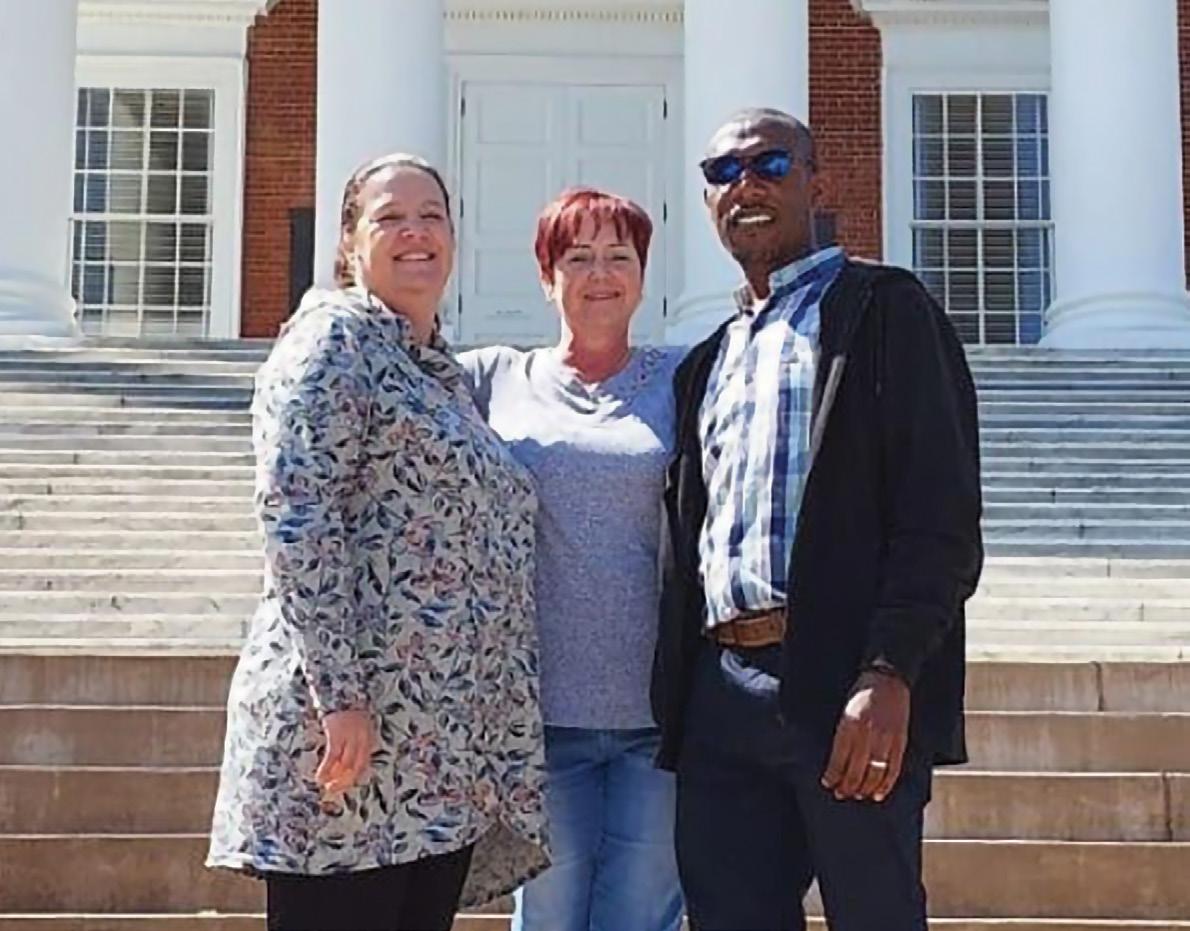
This collaborative training program for mid-career South African faculty in health sciences emphasizes a dual MS or PhD pathway for those who are working toward these degrees. This program is especially beneficial for faculty members who are advanced in their careers but lack formal research training.
“These mid-career faculty have a unique perspective because they have so much clinical experience,” said Scott Heysell, CGHE director. “The program not only benefits the visiting faculty members but also enriches UVA faculty through co-mentorship opportunities and growing expertise in various areas.”
The program hopes to strengthen collaborations between UNIVEN and University of the Free State, enhancing the development of research-oriented programs within their respective institutions and creating opportunities for student participation. For instance, UFS has become a site for student projects, with several students embarking this summer on a CGHE-funded initiative to develop a digital community health intervention to address local health challenges.
CGHE also aims to establish more permanent links with UNIVEN and UFS through the new UVA South African office, once it is established—underscoring a long-term commitment to the region’s interests. This collaboration not only facilitates facultyrelated research opportunities but also strengthens existing partnerships, laying the foundation for continued innovation and enriching interdisciplinary student experience in the pursuit of global health equity.
We thank the following donors who made gifts between January 1 and December 31, 2023, of up to $100,000 to various funds that support global programs and scholarships. This list represents some funds held centrally and some school- or unit-based funds.
Aubrey and Charley Adams
Cynthia and Dale Adams
Adam Adelstein
Tracy and David Aglio
Betsy Agyeman
Noelle Aigrain-Kaegi and Phil Aigrain
Tammy Allen and Dan Gropper
Ana Alvarez Machado
Lin An and Weizhong Sun
Maralize Anderson
Sylvie Arnold
Eddie Avellaneda
Sarah Axmann
Brianna Ayoub
April Ballard
Vanessa Barnabei, MD, PhD
Cassandra Barnett
Dara Behan
Maria and Travis Behan
Zach Beim
Hannah Bentrem
Ava Birdwell
Amy Black
Matt Blumenstock
Lauren Board
Meg and Clifford Bogue, MD
Alexandra Booth
Claiborne Bowden
Sharon Bowen and Larry Morse
William Brabham, MD
Carol Brown and Brad Brown
Kylee Brown
Gregory Bullock II
Greta Campbell
Alison Carbaugh
William Carrington
Alex Chang
Sharon Chong
Morgan Chung
Franklin Clarke
Tracey Colantuono
Deanna Coon
John Cornett
Zoe Costello
Olivia Cox
Elizabeth Cranwell
Charles Curran
Maeve Curtin
Madeline Czerkawski
Kasi and Donald Daniel
Jennifer Daniels
Sandra and Brian Darville
KD Davis
Liz Deland
Carla DeLellis and Sean Sturgis
Jessie and Nick Denniston
Daphne Dickson
Joseph DiMeglio
Virginia Dolan
Mary and Jim Dondero
Morgan and Steve Driskill
Kate Dugger
Djenane and Michael Duhaney, MD
Barbara and Mark Dukas
Ben Earley
Tara Ebrahimi
Julia Edwards
Olivia Egge
Iberedem Ekure
Timothy Elliott, PhD
Margaret Ennen
Laura Erlacher
Taylor Evko
Carolin Fabian
Caroline Fagerli
Zainab Faisal
Thomas Feinstein
Samantha Felder
Ed Fishpaw
Malou Flato
Lisbeth and James Fletcher
Hannah Fletcher-Perez
James Flood
Emily Forrester
Kailey Freeman
Renee Fuller
Peter Gadwa
Pete Gallagher
Frankie Garner
Bryn Geiger
Maha Ghori
Meagan Gillette
Ellen and Steven Goldberg, MD
Brian Golden
Jess Golden
Connor Goodall
Jeff Gross
Karen Grossman
Aditya Gude
Brianna Guevara
Grace Hale
Olivia Hale
Emily Harrell
Rebecca Harris
Andrew Harris, MD
Tricia Heaney and Mark Ralston
Marcia and Witold Henisz, PhD
Catherine Henkel
Grace Henschel
Herget Family Charitable Foundation
Lisa and Phil Herget III
Reina and Juan Hernandez
Lisa Heymann
Sarah Higgins
Yuhan Hou
Mason Howard
Jim Huger
Stephanie Huger
Mary Hughes and David Vermillion
Pamela and James Hughes, MD
Alicia Hundley
Christi and Jason Hunt
Ghassan Ilaiwy, MD
Ellen Lawton and William Irvin, Jr., MD
Jackson Family Foundation
Carrie and Kirk Jackson, MD
Clara Jackson
Chelsea and Maxwell James
Jessica Jeanty
Corinne Jennings
Bryce Johnson
Joani and Richard Johnson
Mary Johnson
Stacey and Scott Johnston
Carrie and John Jordan
Soo Kang
Meghana Kapadia
Khalila Karefa-Kargbo
Manju and Ajay Karki
Phylicia Kasiem
Kara Kaufman
Ramandeep Kaur
Jean and Glenn Kessler
Ishika Khemani
Kasey Kiefer
Julia Kielmeyer
Gavin Kinrade
Kissinger Family Foundation
Thomas Kissinger
Carey Kluttz
Paul Koch
Karen and Thomas Koontz
Tara Kowasic and Melissa Avidano
Christine and Louis Lagalante
Dylan Lahiff
Olivia Lai and Walter Gillcrist, Jr.
Jill Landefeld
Merritt Lane III
Nicholas Lansing
Lauren and Aaron Lapat
Anna Lawson, PhD and Thomas Lawson
The work highlighted in this report would not be possible without the help of our donors. We extend our deepest gratitude to all who support global initiatives at UVA. Our donors enable students and faculty to engage with the world.
Caroline and David Lee, MD
Sarah Lee
Jocelyn Leu
Annie Leung
Ana Lico and Timothy Bickham
Julie and Ken Lifland
Leigh-Ashley Lipscomb
Emily Lockwood
Abigail Lohmeyer
Alayna Loveland
Jason Lunday
Antonio Pedro Machioni
Brianna Mackay
Sophie Mallas
Karen and Charles Marsh, Jr.
Gretchen and Ted Martin
Ashley Mays
Grace McCarthy, MD and Hank McCarthy II
Megan McGovern
Shar McKelvie and Bart Huffman
Elizabeth McLean
Dexter Mead
Connie Meinhardt
Nick Menefee
Grace and Stephen Meng
Lekha Mereddy
Frances Meredith, MD and Scott Meredith, MD
John-Louis Michaud
Elizabeth Mitchell and Matt Mendelsohn
Paulette and Blake Morant
Sara Moreno
Sayaka Mori
Channing Moss
Mehdi Mostaghimi, PhD
Grace Motta
Elizabeth Mueller
Jane Muir, PhD
Paige Murphy
Kristen Musselman
Jane and Richard Myers
Vinay Navani
Vy-Phuong Nguyen
Olivia Nguyen-Dillon
Sophia Ni
Courtney and Neale Nickels
Quinn O’Brien
Matt O’Neill
Rita Page, MD and Colin Page
Neikey Panah
Claudia Park
Madelynn Park
Daniel Parker
Kimmily Phan
Inanna Pickering
Chris Pikrallidas
Carolyn Piskun
Laura Plattner
Reese Poe
Ryan Policay
Carolyn Pugh
Thibault Rabiller
Neha Rana
Preeti and Irmindra Rana
Mahasweta Rath and Manoj Panda
Laura and Mark Rayder
Martha Reavis
Olivia Redding
Anne-Chanel Renald
Nancy and Stephen Render
Katie and Mark Repsher
Katherine Rhyne and Charles Axten
Tanner Riche
Whitney Rintoul
Richard Rodgers
Molly and Alfred Rogers
Advika Roongta
Gabrielle Rosario
William Ross
Stephen Rubin
Robin Sandenburgh
Brittany Sandoval-Rivera
Susan Wells Sargeant
Patricia Sasser
Sherry Satin
Adriana Sauntry
Maren Sautter
Elizabeth Scalzi
Becca Schaefer
Peyton Schowalter
Ellen Schulhofer
William Schwartz
Theresa and John Seem, PhD
Noor Sharif
Kyle Shaw, Jr.
Sheldon and Audrey Katz Foundation
Richard Shen, MD
Yanwei Shen
Terry Shepherd
Kim Sides
Dominique Smith
Morgan and Michael Smith
Sarah Smith
Sophie Smith
Tracy and Russell Spencer
Alison Staeger
Lauren Stanitski
Alexandra Stengel
Paula and George Stone
Whitney Strickler
Boh Young Suh
Carol Swainson
Malissa Takacs
Andre Tan
Lisa Taylor
Mikayla Tayok
Nathan Tedford
Yasmin Teixeira
Edlawit Tessema
Nelson Mead Fund
Daria Thomas-Daniel and Gregory Daniel
Linda and Niroth Thong
Bonnie Thurston, PhD
Keri Toner, MD and Joseph Toner
Sarah and Frank Trimble
Debara Tucci, MD and Kevan VanLandingham, MD
Jessica Tuchinsky and Jason Hoffs
K.C. Underwood
Mark Unverzagt, MD
Ila and Pavan Vaish
Sigrid Van Schelstraete and Niels Schillewaert
Sarah Vaughn
Holt Walker
Katie Walsh
Geoff Wells
Maggie West
Rebecca and Erik White
Sarah Whiteside
Bonnie Wilfore and Christopher Conti
Anne Wilhite, MD
Christine and Keith Williams
Marilyn and Henry Williams III, PhD
Ashley Wills
Cathy and Steven Wilson
Mason Wilson
Jennifer Wise
Abigail Wood
Leah Wood
Nicole Woodard
Suzanne Wright and John O’Neil, MD
Salih Burak Yalcinkaya
Brian Yoon
Davis Zaunbrecher
Karen Zemel and David Coppola
Yingyi Zhu
Margaret Zuerner
The work highlighted in this report would not be possible without the help of our donors. By creating an endowment, donors can contribute to the long-term sustainability and growth of UVA’s global activities.
The following list represents endowed funds that support global programs and scholarships. We thank these donors, who have established funds or added to existing funds at the $100,000 level or above.
Amanda and Farhad Aghdami Aghdami Family Fund for Environmental Sustainability
Alexandra Arriaga and Brian Murphy
Wayne D. Cozart Global Award
Annonymous Ravenall “Ricky” Keller Memorial Fund
Kristen Hae-won Bae, DDS and Jeffrey Y. Bae
Bae Family Global Experience Bicentennial Scholars Fund
Estate of Eleanor Barnes Education Abroad Scholarship General Fund
Victoria Bires
Lucas H. Bires Global Experience Bicentennial Scholarship
Victoria and Francis Bires
Robert K. Harwood Bicentennial Scholars Fund for International Study
Glenn and Susan Brace
Sr. Bridget Haase Center for Global Health Scholarship; Glenn and Susan Brace Center for Global Health Scholarship Fund
Estate of Holmes M. Brown
Mary Ellen Lynch Brown Memorial Fund
Ann and Scott Carter
Ann B. and J. Scott Carter Global Experience Bicentennial Scholars Fund
Laura Dabinett, MD and Russell McKelway, MD
Dabinett-McKelway Center for Global Health Equity Scholar Endowment
Shelly and Michael Dee
Dee Family Global Scholarship Fund; Dee Family Global Experience Bicentennial Scholars Fund
Sarah and Richard Farrington UVA Bahamas Graduate Scholarship
James Feffer
Cunningham Family Bicentennial Scholars Fund for International Study
Patricia and Paul Gannon
Gannon Family Fund for Global Development Studies
KC Graham
Graham Water and Health in Limpopo Project (WHLP)
Nancy and Richard Guerrant, MD
Dick and Nancy Guerrant Global Health Equity Professor Award Fund; Center for Global Health Scholars Award
Pamela Harrington Harrington Family Bicentennial Scholars Fund
Hoglund Foundation
Dee Family Global Scholarship Fund; Dee Family Global Experience Bicentennial Scholars Fund
Jeannie Inge, James Potter, Richard Potter
Buckhorn Foundation Global Experience Bicentennial Scholarship
Mark Jaros
Jaros Family Global Experience
Bicentennial Scholarship;
Mark F. Jaros Global Experience Scholarship for South Africa
Timothy Johnson, Jr., MD
Timothy Johnson Bicentennial Scholars Fund
Russell Katz
India Studies Bicentennial Scholars Fund; Yamuna River Project
Pamela and Peter Kelly
Pamela B. and Peter C. Kelly Award for Improving Health in Limpopo Province
Dan Kirwin
Kirwin Family Global Experience Bicentennial Scholars Fund
Jon Kirwin
Kirwin Family Global Experience
Bicentennial Scholars Fund
Troy Kirwin
Kirwin Family Global Experience Bicentennial Scholars Fund
Linda Lakhdhir
Global Experience Bicentennial Scholarship in Arts & Sciences
Donna and George Lyle, MD
Donna and George Lyle Family Scholarship in Global Health
Ashley Thompson Manning and Peyton Manning
Wayne D. Cozart Global Award
Nabigha and Farid Masood
Masood Family Global Experience Bicentennial Scholarship
Kara Peters
Cunningham Family Bicentennial Scholars Fund for International Study
Kevin Peters
Cunningham Family Bicentennial Scholars Fund for International Study
Michael Prentiss
Michael B. Prentiss Global Scholarship Fund
Anil K. Ram, MD
Drs. Anjan and B. M. Ram Endowed Scholarship
Neal R. Rudge
Neal R. Rudge Gift for Global Internship Programs; Wayne D. Cozart Global Award
Bobbie and James Rutrough, Jr.
Wayne D. Cozart Global Award
E. K. Smith
L.A. Smith Global Experience Bicentennial Scholars Fund
Jane and Larry Sperling
Wayne D. Cozart Global Award
Margaret Nelson Spethmann Nelson Fund for Southeast Asian Studies
Margaret Squires
Rue Mazarine Global Experience Bicentennial Scholarship
Richard Sundberg, PhD
Sundberg International Scholarship Fund
Joyce and Steven Tadler
Steven M. and Joyce E. Tadler Faculty Fund for Global Studies; Global Development Studies Masters in Commerce Bicentennial Scholars Fund; Global Development Studies Fund
Danijela and Serge Todorovich
Todorovich Family Global Experience
Bicentennial Scholars Fund
Paul Weinschenk
The Class of 1987 Vicenza
Bicentennial Scholars Fund
Yanqing “Joanna” Zhu and Feng “Frankie” Gao
Gao and Zhu Family Global Experience
Bicentennial Scholars Fund; Gao and Zhu Family Global Studies Bicentennial Professorship Fund
Donors who will be establishing an endowment through outright gifts and also through planned gifts:
Michele Buster Flashrouge Round the World Global Experience Scholarship
Susan Piepho, PhD
Susan B. and Lee Piepho International Endowed Scholarship Fund
Patricia L. Volz and Elizabeth R. McLeod
The Africa Scholarship Fund
Donors who will be establishing an endowment with a planned gift:
Faith and John Burns
John and Faith Burns Global Health Scholar Award Fund
W. Andrew Harris, MD Center for Global Health Scholarship
Pam Jones
Marcia Alyse Jones Cockram Scholarship Fund; Stoplight Sisters Global Experience Scholarship Fund
Betty and Theodore Long, PhD
The Ted and Betty Long Student Scholar Fund for the Center for Global Health Equity
Donald Peele, Jr.
Donald Peele, Jr. International Studies Scholarship
Rianna and George Philpott Experiential Scholarship Fund (Engineering)
Joan Polaschik
Joan A. Polaschik Education Abroad Fund; Joan A. Polaschik State Department Internship Fund
Lucy Weiss, PhD and Rick Weiss, PhD
Richard G. and Lucy C. Weiss Global Endowment Fund
FOR MORE INFORMATION ABOUT HOW YOU CAN IMPACT UVA’S GLOBAL EFFORTS, PLEASE CONTACT
Carrie Jordan, director of development for International and Global Affairs: (cad4mn@virginia.edu)
We are grateful for our community of alumni, parents, and friends who fuel the University’s global aspirations through their philanthropy.
FARID MASOOD AND NABIGHA MASOOD
Farid and Nabigha Masood established the Masood Family Global Experience Bicentennial Scholarship in 2023 to support engineering students in general and systems engineering students in particular at UVA in pursuing international experiences including study abroad, research abroad, or global internships. In 2024, the fund is supporting five students participating in two education abroad programs: Global Technology Practice in Germany and Global Sustainability Consulting in Sweden.
Why are you passionate about creating opportunities for engineering students to pursue global experiences?
In today’s day and age, international experience is becoming essential to a university education. With two daughters at UVA, we were glad to see UVA’s increased focus on studying abroad and the broad range of opportunities available to students.
We hope that the global experiences fostered by the scholarship will broaden the perspectives of UVA Engineering students and allow them to better understand what it is like to work in a multicultural environment. By equipping them with the cultural competencies needed to thrive in an interconnected world, we hope that the scholarship can ultimately shape their future lives and careers in a positive way.

DR. THEODORE LONG AND BETTY LONG
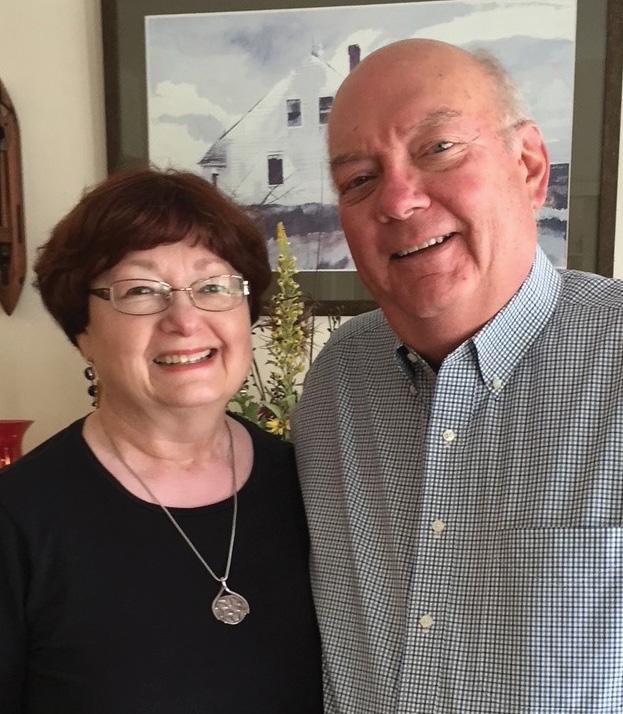
Ted and Betty Long established the Theodore and Betty Long Global Health Scholar Award Fund through their estate in 2023 to support future UVA students from a variety of academic disciplines in pursuing faculty-led research related to public health across the globe through UVA’s Center for Global Health Equity.
What inspires you to support UVA’s Center for Global Health Equity?
We established this scholar award because we believe deeply in international education for students and in health equity for all people. As president of Elizabethtown College (PA), Ted (UVA PhD,'79) dramatically increased participation in study abroad and developed a Center for Global Citizenship to advance peacemaking and global consciousness. Much of Betty’s career was spent in health care and community action, where she championed health equity for women and children. She was inspired by Tracy Kidder’s profile of Paul Farmer and, like him, has seen her life’s vocation as being in service to others.
We met Paul Farmer when he was the keynote speaker at Elizabethtown’s Scholarship and Creative Arts Day. When we learned about the Center for Global Health Equity, we were energized by the vision of Dr. Richard Guerrant and Dr. Scott Heysell and the exciting programs the Center offers, and supporting it became a compelling interest for us.
As a family, we have lived and enjoyed an expatriate life in Africa, the Middle East, and Asia for 20-plus years and hope that study abroad opportunities provided by such scholarships to a broader group of students not only open up avenues for students to pursue international careers but also continue to enhance the UVA brand globally.
Global experience is one of the most significant forms of learning for students because it opens new worlds for them. Getting beyond the classroom to experience life abroad and to conduct research deepens understanding, and the research focus on health equity means that students can also make a difference in people’s lives. We are proud to support such a powerful program in the spirit of making a UVA education both “Great and Good.”
SUPPORT UVA GLOBAL WITH A GIFT OF ANY SIZE! GIVE TODAY >>